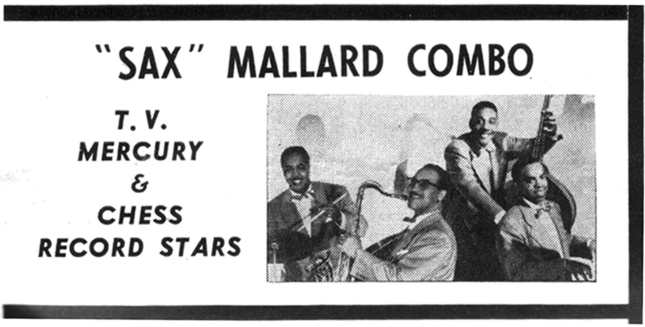

Revision note: Courtesy of Marv Goldberg, we can now report that the Andrew Tibbs/Sax Mallard Sextet session for Chess was cut between July 10 and 13, 1950. We have added information about RCA Vktor's 45 rpm releases of tracks by Arbee Stidham, Roosevelt Sykes, and Sugarman Penigar that Sax Mallard played on.
Oett M. Mallard was born on September 2, 1915, in Southern Illinois. According to his grandson Conrad L. Henry, Oett Mallard's mother, Lillie Mae Curtis, and his father, Alvin Mallard, were originally from Kentucky. They left the state because Jim Crow laws were in effect and Alvin Mallard was white. They crossed the Ohio River to Tamms, a few miles up the road from Cairo in the extreme south of Illinois, and were married there. While Oett Mallard was still a boy, Lillie Mae left Tamms and brought him to Chicago.
According to Sax Mallard's obituary in the Chicago Defender, "He was six years old when he created his first job, enterprisingly selling shopping bags; and at 10 he was shining shoes." According to Conrad Henry, he shined shoes on Maxwell Street. While working there, Oett met "Pops" Hamm, who became his stepfather. Like so many other Chicago musicians, Oett Mallard started young. He got his first saxophone at 16, while still at Wendell Philips High School, where he studied under that redoubtable bandmaster, Captain Walter Dyett; he almost immediately landed a gig playing on the radio with vocalist Frankie "Half Pint" Jaxon. Reportedly he completed his high school education at DuSable.
In 1933 or 1934, Sax Mallard married Anne M. Smith, who was born in 1914. Their daughter, Patricia Rosebud Mallard, was born in 1935; in 1937, she was followed by Lavance Mallard, usually known as Sonny. (Floyd Campbell's recollection, in an interview we quote below, of Sax Mallard marrying Miller Lyle's daughter, is incorrect. Most likely he mixed Mallard up with another band member.)
After graduation, Sax Mallard toured the US and Canada for two and a half years with one of his classmates, Nat "King" Cole, in a show called "Shuffle Along." Drummer Floyd Campbell recalled how King Cole's band was taken on the road by impresario Miller Lyle:
The Bacon's Casino was the most popular dance hall [in Chicago] back then. Nat Cole's brother, Eddie, put a band in there after I left and Nat was playing piano with him. Nat's brother, Eddie, who had toured Europe with Noble Sissle, played bass. Miller Lyle came along and picked that band up and took them to California. That band consisted of Nat, Sax Mallard, and others. Lyle took a big band out there. They revived Shuffle Along...
Miller Lyle didn't half pay the band and some of the guys had to almost walk back to Chicago. Nat was not able to get back.
(Charles Walton's article "Floyd Campbell, drummer, vocalist, bandleader," from which we drew these quotations, is one of his Bronzeville Conversations. The stay in Los Angeles did Nat "King" Cole no harm, of course. His trio became wildly popular there.)
Jack Ellis, in his "Orchestras" column from the Chicago Defender, February 27, 1937, gives a slightly different story. Ellis describes the band as being Nat Cole's, saying that his "cats" headed West on February 24, hitting the RKO houses; they were scheduled to arrive in Hollywood on April 5. According to Ellis, the band consisted of Bill Wright, George Skinner, Sax Mallard, Otis Hicks on reeds; Fostelle [Rostelle] Reese, Kenneth Johnson, Russell Gillom on trumpets; John Thomas and Nat Atkins on trombones; Hurley Ramey on guitar, Henry Fort on bass, Jimmy Adams on drums, and Nat Cole on piano. Various sources on Nat King Cole indicate that this was indeed the orchestra for Shuffle Along and that King Cole was the arranger and musical director for the revue.
While working his way back to Chicago, Mallard joined the Kenny McVey band, which for a time made two half-hour radio broadcasts daily from the Tivoli Terrace in Denver. At age 21, he sold his first arragement (for six pieces) to Lionel Hampton. Arriving back in Chicago, he joined Local 208 of the American Federation of Musicians on August 5, 1937 (according to his union card). He may have rejoined McVey for a while, as the Defender ran a photo of him with McVey's band in December 1938. Up through the beginning of World War II, Sax Mallard seems to have been on the road a lot, working at various times with Fats Waller, the Deep River Boys, the Original Ink Spots, the Andy Kirk Band, and the Mary Lou Williams Quartet. Mallard may also have briefly subbed for Johnny Hodges in the Duke Ellington band during the late 1930s (the obituaries are somewhat unclear about this).
In 1942, Mallard was a member of a 12-piece band in Chicago led by drummer and singer Floyd Campbell (1901 - 1993); this band worked the Parkway Ballroom (45th and South Park) on a regular basis and played gigs in South Bend, Indianapolis, and Milwaukee. The complete personnel, according to a photo dated 1942 by Floyd Campbell and published in the Defender on May 29, 1943, was: Louis Ogletree (tp); Louis Alahard [rendered Acerhart in some sources] (tp); Al Wynn (tb); Herman Barker (as, ts); Oett "Sax" Mallard (as, cl); Al Washington (ts); Nat Walker (p); Les Corley (eg); Earnest Smith (b); Floyd Campbell (d); Carrol Tucker (voc). (Mallard had not been in a smaller Floyd Campbell band that is shown in a photo from May 1941.) The 1942 photo can be seen in Charles Walton's article on Floyd Campbell in Bronzeville Conversations. (In his interviews with Walton, Floyd Campbell identified the pianist as John Riggins and did not mention the bassist, guitarist, or female vocalist.) At other times the band included John Riggins, Ruth Crowder, and Billy Brown Moreno (piano), and Oliver Coleman or Ellis Bartee (drums, when Floyd Campbell was just singing and directing).
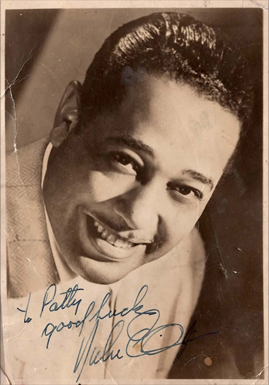
There is no phonographic trace of any of these involvements. We do have recordings, however, from a stay (probably not his first...) with Duke Ellington: five broadcasts, all originating in New York City, from April and May 1943. Mallard was there as a substitute for Otto Hardwick, an Ellington veteran who was taking a hiatus from the band. Mallard's main instrument at the time was alto sax, and Johnny Hodges was his obvious model; at least two months sitting next to his idol (maybe more—there are no extant Ellington recordings from February or March 1943) certainly didn't diminish that influence. Toward the end of Mallard's tenure, Chauncey Haughton left, and Mallard briefly moved over to take his clarinet chair, while one Scotty Scott played second alto. (Mallard's replacement in the Ellington band was another Chicago altoist, Nat Jones, who served from June 1943 until Hardwick's return in November. Jones also played clarinet, but presumably had no need to concentrate on it, since Jimmy Hamilton was now in the band.)
Duke Ellington (p, ldr); Wallace Jones (tp); Rex Stewart (cornet); Harold "Shorty" Baker (tp); Ray Nance (tp, vln); Joe "Tricky Sam" Nanton (tb); Lawrence Brown (tb); Juan Tizol (v-tb); Johnny Hodges (as); Oett "Sax" Mallard (as, cl); Chauncey Haughton (cl, ts); Ben Webster (ts); Harry Carney (bars, cl, as); Fred Guy (g); Alvin "Junior" Raglin (b); Sonny Greer (d); Betty Roché (voc).
MBS Broadcast, Hurricane Restaurant, New York City, April 3, 1943
| Take the "A" Train (and intro) | Azure LP 431 | ||
| Hayfoot, Strawfoot | Azure LP 431 | ||
| I Can't Be Wrong | Azure LP 431 | ||
| What Am I Here For? | Azure LP 431 | ||
| Main Stem | Azure LP 431 | ||
| Could It Be You? | Azure LP 431 | ||
| Goin' Up | Azure LP 431 | ||
| Don't Get Around Much Anymore | Azure LP 431 | ||
| Nevada | Azure LP 431 | ||
| Things Ain't What They Used to Be | Azure LP 431 |
Information from Lord's Jazz Discography. Azure LP 431 was a Swedish LP, release date unknown.
Duke Ellington (p, ldr); Wallace Jones (tp); Rex Stewart (cornet); Harold "Shorty" Baker (tp); Ray Nance (tp, vln); Joe "Tricky Sam" Nanton (tb); Lawrence Brown (tb); Juan Tizol (v-tb); Johnny Hodges (as); Oett "Sax" Mallard (as, cl); Chauncey Haughton (cl, ts); Ben Webster (ts); Harry Carney (bars, cl, as); Fred Guy (g); Alvin "Junior" Raglin (b); Sonny Greer (d); Betty Roché (voc).
MBS Broadcast, Hurricane Restaurant, New York City, April 4, 1943
| Take the "A" Train (and intro) | Rarities 56 | ||
| Don't Get Around Much Anymore | Rarities 56 | ||
| Main Stem | Rarities 56, IAJRC 17 | ||
| I Don't Want Nobody at All [BR voc] | Rarities 56 | ||
| Johnny Come Lately | Rarities 56 | ||
| Things Ain't What They Used to Be (and close) | Rarities 56 |
Information from Lord. Rarities 56 was an LP, released in Denmark and Britain in the 1970s or 1980s. IAJRC 17 was an LP, title unknown. However, the various-artists collection The Swinging War Years (IAJRC LP 17), apparently included "Take the A Train" and not "Main Stem." To be investigated.
Duke Ellington (p, ldr); Harold "Shorty" Baker (tp); Ray Nance (tp, voc); Joe "Tricky Sam" Nanton (tb); Lawrence Brown (tb); Oett "Sax" Mallard (cl, as); Harry Carney (bars); Alvin "Junior" Raglin (b); with CBS Studio Orchestra.
CBS Broadcast, NYC, April 21, 1943
| Mood Indigo | Rarities 70 | ||
| Sophisticated Lady | Rarities 70 | ||
| It Don't Mean a Thing | Rarities 70 |
Information from Lord. The radio program was called "Cresta Blanca Carnival." Rarities 70 was an LP released in Britain and Denmark in the 1970s or 1980s.
Duke Ellington (p, ldr); Wallace Jones (tp); Rex Stewart (cornet); Harold "Shorty" Baker (tp); Ray Nance (tp, vln, voc); Joe "Tricky Sam" Nanton (tb); Lawrence Brown (tb); Juan Tizol (v-tb); Johnny Hodges (as); Scotty Scott (as); Oett "Sax" Mallard (ts?, cl, as); Ben Webster (ts); Harry Carney (bars, cl, as); Fred Guy (g); Alvin "Junior" Raglin (b); Sonny Greer (d); Al Hibbler (voc).
CBS Broadcast, Central Park Mall, NYC, May 1, 1943
| Take the "A" Train | Jazz Anthology [F] JA5124, Philips [J] 15PJ6, Jazz Society [Swd] AA501 | ||
| Hayfoot, Strawfoot | Jazz Anthology [F] JA5124, Philips [J] 15PJ6, Jazz Society [Swd] AA501 | ||
| Don't Get Around Much Any More | Jazz Anthology [F] JA5124, Philips [J] 15PJ6, Jazz Society [Swd] AA501 | ||
| A Slip of the Lip [RN voc] | Jazz Anthology [F] JA5124, Philips [J] 15PJ6, Jazz Society [Swd] AA501 | ||
| Take the "A" Train | Jazz Anthology [F] JA5124, Philips [J] 15PJ6, Jazz Society [Swd] AA501 | ||
| Bond promotion [DE announcement] | Jazz Anthology [F] JA5124, Philips [J] 15PJ6, Jazz Society [Swd] AA501 |
The performance was part of the NBC-WEAF "War Bond Jamboree." Information from Lord. The Jazz Anthology series appeared in the 1970s. Dates for the other LP releases are not known.
Duke Ellington expected his clarinet soloists to play tenor sax parts. Barney Bigard, Chauncey Haughton, and Jimmy Hamilton all fit that pattern. Duke would either have had to rewrite a lot of scores—or ask Mallard to play tenor sax in many of his arrangements. More cannot be said without listening to the broadcasts.
Duke Ellington (p, ldr); Wallace Jones (tp); Rex Stewart (cornet); Harold "Shorty" Baker (tp); Ray Nance (tp, vln, voc); Joe "Tricky Sam" Nanton (tb); Lawrence Brown (tb); Juan Tizol (v-tb); Johnny Hodges (as); Scotty Scott (as); Oett "Sax" Mallard (ts?, cl, as); Ben Webster (ts); Harry Carney (bars, cl, as); Fred Guy (g); Alvin "Junior" Raglin (b); Sonny Greer (d); Betty Roché (voc).
MBS Broadcast, Hurricane Restaurant, NYC, May 1943
| Take the "A" Train (and intro) | Azure LP 431 | ||
| What Am I Here For? | Azure LP 431 | ||
| Barzillai Lew | Azure LP 431 | ||
| Ring around the Moon [BR voc] | Azure LP 431 | ||
| Cotton Tail | Azure LP 431 | ||
| Don't Get Around Much Anymore (and close) | Azure LP 431 |
Information from Lord. Azure LP 431 was a Swedish LP, release date unknown. Meanwhile, no fewer than 10 Ellington broadcasts have been issued from June 1943. All include Nat Jones on alto sax and clarinet instead of Sax Mallard.
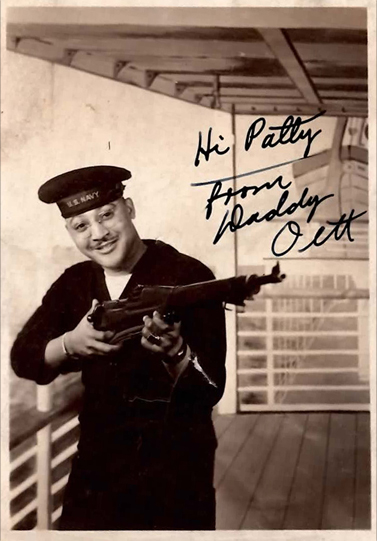
If the photo reproduced in the Defender for May 29, 1943 accurately portrays the current Floyd Campbell band, Sax Mallard was back in Chicago, at least for a brief time, working with Floyd Campbell's Entire 12 Piece Orchestra at Forum Hall. According to his obituary in the Chicago Sun-Times, Sax Mallard spent 18 months in the Army (before his Ellington stint) and over 2 1/2 years in the Navy (from mid-1943 to the beginning of 1946), where he completed work on his Bachelor's degree in Music.
Around the time Sax Mallard went into the Navy, his marriage to Anne Smith Mallard came to an end. In 1946, she married Ernest Stenson.
Like so many Swing musicians, Mallard had to contend with changing popular tastes as the war ended and the Big Bands wound down. When he returned to Chicago and picked up studio work, it was for the Melrose combine, and the music was urban blues or R&B. It appears that his ticket to the studios was his membership in Armand "Jump" Jackson's combo. Mallard must have joined Jackson soon after being discharged from military service (the earliest Melrose sessions that he appeared on already included Jump Jackson and the Jackson combo's trumpet player, Johnny Morton). Jump Jackson, by this time a veteran on the Chicago scene, brought his combo into the Garrick Theater Lounge in January 1946 (his "indefinite" contract was accepted and filed by Local 208 on January 17). If Mallard was not in the group when the engagement opened, he must have joined soon afterward. Getting good publicity throughout its 8-month stay at this Loop nightspot, the Jackson combo helped Sax Mallard relaunch his career.
In the studios Mallard took over a role that had belonged to Buster Bennett before the war. Though Mallard was as suave as Bennett had been rough-hewn, he became an extremely active participant in blues recordings for Victor and Columbia through the end of 1947. His skills as a clarinetist and arranger, his calm demeanor, and his extremely reliable work habits (radically different from Buster's, and those of some other saxophone stars of the day) brought him repeat calls for session work. Mallard was well enough liked by some of these blues artists (notably Big Bill Broonzy and Roosevelt Sykes) to pick up work with them after Victor and Columbia had retreated from blues recording and they had moved to other labels.
From April through July of 1950 Mallard would also find time to back Joe Williams, Stuff Smith, and Lurlean Hunter while a member of an integrated band that played on WBKB-TV in Chicago, under the sponsorship of DJ Al Benson. He also taught band at four different Catholic schools. No wonder his friends called him an "incurable workaholic"!
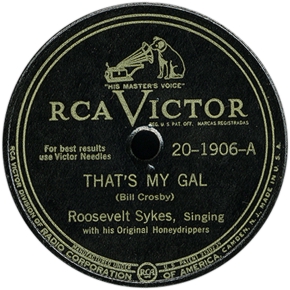
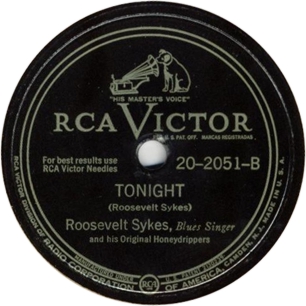
Roosevelt Sykes (voc, p) with Johnny Morton (tp); Oett "Sax" Mallard (as); Leon Washington (ts); Leonard "Baby Doo" Caston (eg); Alfred Elkins (b); Armand "Jump" Jackson (d).
Chicago, February 18, 1946
| D6VB1822 | That's My Gal (Bill Crosby)* | RCA Victor 20-1906-A, Wolf [Au] WBJ-004 [CD], Document BDCD 6048 | |
| D6VB1823 | Tonight (Sykes) | RCA Victor 20-2051-B, Oldie Blues [Du] OL2818, Document BDCD 6048 | |
| D6VB1824 | Living in a Different World (Sykes) | RCA Victor 20-3315-A, Wolf [Au] WBJ-004 [CD], Document BDCD 6048 | |
| D6VB1825 | Sunny Road (Sykes) | RCA Victor 20-1906-B, RCA [Fr] PM42028, RCA [Fr] PM42039, Oldie Blues [Nl] OL2818, Document BDCD 6048 |
Basic session information is from Leadbitter and Slaven, Blues Records 1943-1966 (1st edition, 1968).
RCA Victor 20-1906 was the first single out the gate from his session, receiving a review in Billboard on July 13, 1946 (p. 35). The record was a hit. RCA Victor 20-2051 followed in December (reviewed in Billboard on December 7, 1946, p. 117; advertised by RCA Victor in Billboard, December 21, 1946, p. 21).
"Living in a Different World" was held till January 1949, when it appeared as the A side of RCA Victor 20-3315 (reviewed in Billboard, January 29, 1949, p. 106).
Reissues after 1968 were filled in from Lord's Jazz Discography. Oldie Blues OL 2818, Roosevelt Sykes and his original Honeydrippers: Boogie Honky Tonk, was an LP released in the Netherlands in the late 1970s. Document BDCD 6048, Roosevelt Sykes Volume 8 (1945-1947), was released in 1995.
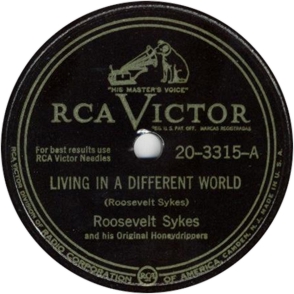
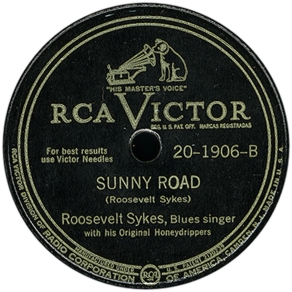
Pianist Bill "Doc" Owens seems to have joined the Jackson combo around April of 1946, after 6 weeks at Sonny Boswell's Lounge (contract accepted and filed at Local 208 on March 7, 1946). In any event, he was on hand in time for the next session.
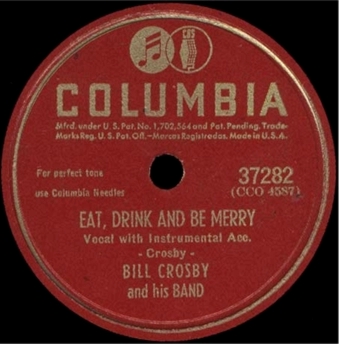
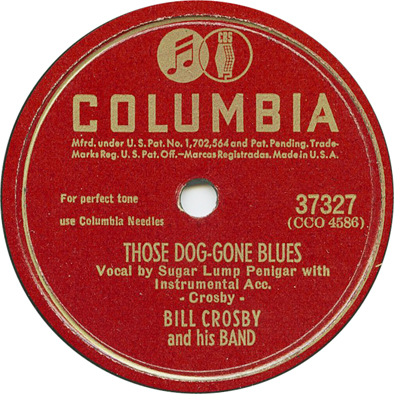
Bill Crosby (voc); Johnny Morton (tp); Oett "Sax" Mallard (as -1; cl -2; arr); Eddie "Sugarman" Penigar (ts, voc); Bill "Doc" Owens (p); Roscoe "Bali" Beach (b); Armand "Jump" Jackson (d).
Chicago, July 29, 1946
| CCO 4585 | Zooter-Eeny | unissued | |
| CCO 4586-1 | Those Dog-Gone Blues (Crosby)* [SP voc] -1 | Columbia 37327, "Columbia 30017," RST 91577 [CD] | |
| CCO 4587 | Eat, Drink and Be Merry (Crosby)* [BC, ens voc] -1 | Columbia 37282, "Columbia 30014," RST 91577 [CD] | |
| CCO 4588-1A | Hip Chick Blues (Crosby)* [BC voc] -1, 2 | Columbia 37327, "Columbia 30017," RST 91577 [CD] | |
| CCO 4589 | Sneaking Woman Blues (Crosby)* [BC, ? voc] -2 | Columbia 37282, "Columbia 30014," RST 91577 [CD] | |
| CCO 4590 | She Done Quit Me | unissued |
William J. "Bill" Crosby was a Sam Theard-like vocalist whose career remains obscure. On April 19, 1945, Musicians Union Local 208 accepted and filed his contract for 4 weeks at the Bar o' Music. On October 18, 1945, he posted a contract for 4 weeks at The Whip. This is all we know about his activity in the clubs, but in his capcacity as a vocalist, Crosby would not have been identified as the leader for contracting purposes. Because the Bar o' Music regularly booked solo pianists, we may infer that he was playing piano at the time he signed these contracts. Crosby made two sessions for Columbia in Chicago in 1945 and 1946. The first was done with skeletal accompaniment: a George Zack styled barroom jazz pianist, probably Cosby himself, and rather clatttery drums. "Have You Seen My Gal," from Crosby's first session, was subsequently taken up by Roosevelt Sykes for his February 18, 1946 session—see immediately above.
On Crosby's second session, Sax Mallard, Johnny Morton, and Bill Owens—plus, of course, Jackson himself—were all members of Jump Jackson's band. Bali Beach (real first name Roscoe) and Sugarman Penigar (real name Eddie) were gigging around the South Side at the time. Penigar frequently appeared in the clubs as a pianist (he was good enough to be able to take solo gigs, and recorded once that we know of on piano, with the Memphis Seven for Columbia) but his studio calls were for his unusually rough, hollow tenor sax work. Penigar also got the lead vocal on "Those Dog-Gone Blues"; Columbia turned his nickname into "Sugar Lump."
Columbia 37282 and 37327 were released in March (Billboard, March 8, 1947, p. 104) and April 1947 (Billboard, April 19, p. 33), respectively. They received a joint review in Billboard on May 24 (p. 126). As was then the custom, they were given numbers in the company's "race" series (30014 and 30017) that did not appear on the records or in advertising. The four issued tracks from this session were reissued in 1994 on RST 91577, an Austrian CD compilation titled Chicago Jump Bands: Early R&B Vol. 1, 1945-1953.
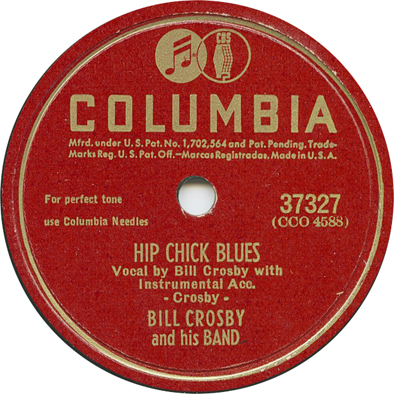
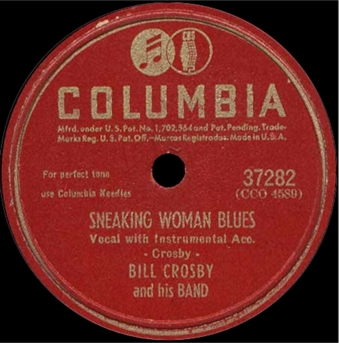
Our basic session information comes from the liners to the RST compilation. Our information about Columbia 30000 series issues comes from Anthony Rotante & Paul Sheatsley's Blues Research No. 14 (thanks to Robert Ferlingere for alerting us to this source). Thanks to Howard Rye, co-author of the 4th edition of Blues and Gospel Records 1890-1943 (Oxford University Press, 1997) for information about the unissued titles (derived from Columbia Artist Index Cards).
Sax Mallard and Bill Owens can be safely upgraded from their "probable" status in the RST liners. "Those Dog-Gone Blues" (despite the title) uses an Ellingtonian ballad arrangement (probably also by Mallard) and opens with Mallard in Hodges mode; his solo is even more Rabbit-like. "Eat, Drink, and Be Merry" includes ensemble hand clapping as well as vocalizing; Sugarman Penigar is responsible for the tenor solo, after which Morton, with plunger mute, and Mallard, on alto, do a duet, and Penigar returns. "Hip Chick" features a long clarinet solo by Sax Mallard, who continues behind part of Crosby's vocal; Morton rides out on open trumpet. It is not known who is responsible for the dialogue with Crosby at the beginning of "Sneaking Woman Blues," but the sneaky clarinet (which continues behind the vocal) is by Mallard, and the Ellingtonian arrangement probably is as well. Morton (muted) picks up the obbligato. Sugarman Penigar solos on tenor sax.
The Melrose brothers lost interest in Bill Crosby, but must have liked what they heard out of the band during his second session, because Mallard and his bandmates got two more studio calls from them over the next couple of months.
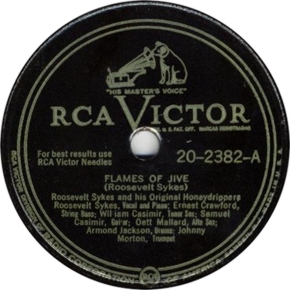
Roosevelt Sykes (voc, p); Johnny Morton (tp); Oett "Sax" Mallard (as); Bill Casimir (ts); Sam Casimir (eg); Ernest "Big" Crawford (b); Armand "Jump" Jackson (d).
Chicago, August 23, 1946
| D6VB1935 | Her Little Machine | RCA International [Br] INTS 5099, RCA [Fr] NL98418, Wolf [Au] WBJ-005 [CD] Document BDCD 6048 | |
| D6VB1936 | Flames of Jive* (Sykes) | RCA Victor 20-2382-A, Oldie Blues [Nl] OL2818, Document BDCD 6048 | |
| D6VB1937 | Sneakin' and Dodgin' (Sykes) | RCA Victor 20-3176-B, RCA [Fr] PM42028, Document BDCD 6048 | |
| D6VB1938 | Bop De Bip* (Sykes-Davis-Moore) | RCA Victor 20-2382-B, Oldie Blues [Nl] OL2818, Document BDCD 6048 |
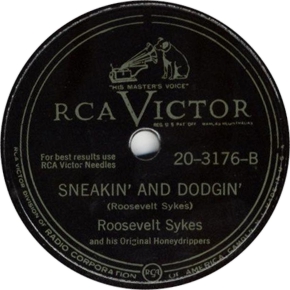
RCA Victor was building up a backlog of Roosevelt Sykes material. The first release from this session came out a year later: RCA Victor 20-2382 was announced in Billboard on August 16, 1947 (p. 156). One side was not released until well into the LP era, in 1981; the fourth was held for RCA Victor 20-3176, a 78 rpm single released in November 1948 (listed in Billboard on November 6, p. 31; reviewed on Decemer 4, p. 98).
Basic information from the liner notes to Blues Document BDCD 6048, Roosevelt Sykes Volume 8 (1945-1947), which was released in 1995. "Her Little Machine" was first released in 1981 on RCA International INTS 5099, a British various-artists LP titled Vintage Blues. Thanks to Dave Penny for information about the LP. Wolf WBJ CD-005 is an Austrian CD titled Roosevelt Sykes: West Helena Blues, Postwar Years Vol. 2. Additional reissues are from Lord.
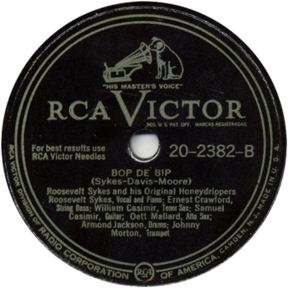
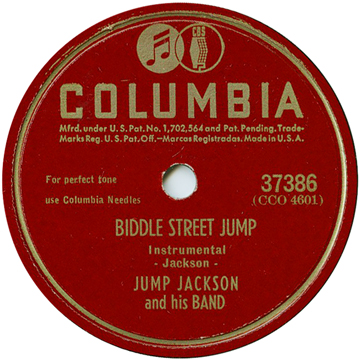
Johnny Morton (tp); Oett "Sax" Mallard (as); Bill Casimir (ts); Bill Owens (p); Ransom Knowling (b); Armand "Jump" Jackson (d); St. Louis Jimmy [Oden] (voc):
Columbia Studios, Chicago, September 13, 1946
| CCO 4601 | Biddle Street Jump (Jackson) | Columbia 37386, "Columbia 30121" | |
| CCO 4602 | Road to Ruin [prob. SLJ voc] | unissued | |
| CCO 4603 | She's Killing Me [prob. SLJ voc] | unissued | |
| CCO 4604 | Yancey's Blues (Jackson) [SLJ voc] % | Columbia 37386, "Columbia 30121," Document DOCD-5235 |
Information from Jepsen's Jazz Records. This information (including the lack of further issues up to that time) is corroborated by Leadbitter and Slaven's 1987 edition. Sax Mallard does not solo on the two issued sides.
Jepsen and Leadbitter/Slaven give September 13, 1945 as the date for this session. But the matrix numbers don't fit. Since CCO 4601 follows CCO 4589 (see the Bill Crosby session above, from July 29, 1946) and precedes CCO 4661 (a Buster Bennett session from September 30, 1946), the correct date is obviously September 13, 1946. This is confirmed by the online listing for the Columbia 35000 and 30000 series at http://settlet.fateback.com.
Columbia 37386 was issued in June 1947 (listed in Billboard on June 14, p. 123; reviewed on July 19, p. 116); it was given a notional number, Columbia 30121, in the "race" series. "Yancey's Blues" was reissued on Document DOCD-5235, St. Louis Jimmy Oden, Volume 2: 1944-1955.
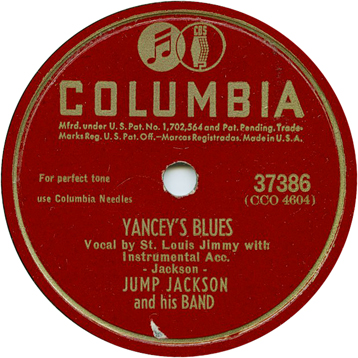
In mid-September, it became known that Joe Sherman was going to shut down the Garrick Theater Lounge (which closed on September 23). Jump Jackson promptly moved his combo to the Blue Heaven Lounge ("indefinite" contract posted on September 19, 1946).
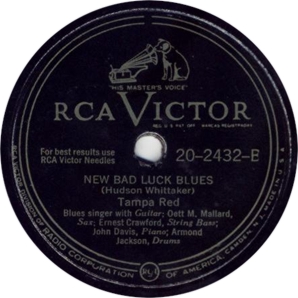
Tampa Red (voc, slide g) with Oett "Sax" Mallard (as -1, cl -2); Blind John Davis (p; speech -3); Ernest "Big" Crawford (b); Armand "Jump" Jackson (d).
Chicago, September 16, 1946
| D6VB1945 | You May Be Down Someday* -1 | RCA Victor 22-0009, Wolf [Au] WBJ-001, Document DOCD 5213 | |
| D6VB1946 | She's a Solid Killer Diller* -1 | RCA Victor 20-2597, Oldie Blues [Du] OL2816, Document DOCD 5213 | |
| D6VB1947 | Poor Stranger Blues* -2, 3 | RCA Victor 20-3309, Krazy Kat [Br] KK7411, Document DOCD 5213 | |
| D6VB1948 | New Bad Luck Blues* (Whittaker) -2 | RCA Victor 20-2432-B, Krazy Kat [Br] KK7411, Document DOCD 5213 |
Our information comes from LS 1968, confirmed by the liner notes to Tampa Red Volume 13 (1945-1947), released in 1993 on Document DOCD 5213. LS credit Tampa Red with playing kazoo, which he does not use on this session, and do not identify which instrument Mallard plays on each track. On "New Bad Luck Blues" Tampa Red calls out Sax Mallard's name during his clarinet solo.
RCA Victor during this period was often mixing and matching blues sides from different sessions. RCA Victor 20-2432 was announced in a company ad in Billboard on September 20, 1947 (p. 33). 20-2597 followed in December (Billboard ad, December 27, 1947, p. 23). RCA Victor 20-3309 was reviewed in Billboard on January 29, 1949 (p. 106). In a new Victor "race" series (but a few weeks too early to get its own 45 on cerise vinyl), 22-0009 was announced in Billboard on February 26, 1949 (p. 39).
The Oldie Blues, Wolf, and Krazy Kat reissues are mentioned in Tom Lord's Jazz Discography.
On a rare trip to Chicago, Art Rupe of Specialty Records (then a brand-new Los Angeles-based label) decided to bring some local talent into the studio. For his first session, he used Jump Jackson's working band, with the addition of Bill Casimir, who was bringing his tenor saxophone to many Melrose-sponsored sessions during this period, and guitarist Leonard "Baby Doo" Caston, who was working as a member of the Big Three Trio. Rupe also brought in Roosevelt Sykes, who was under contract to RCA Victor at the time, disguising him under the generic epithet "The Blues Man" and restricting him to vocals only. Sunnyland Slim (whose piano playing was too "down home" for the Melrose combine) also made a guest appearance as a vocalist; though he had been on the Chicago scene since 1942, this was his recording debut.
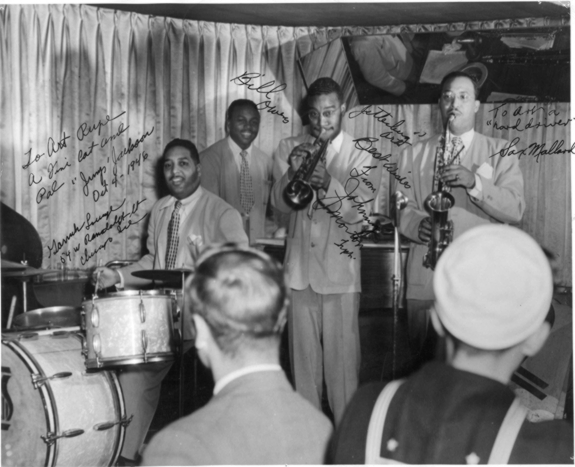
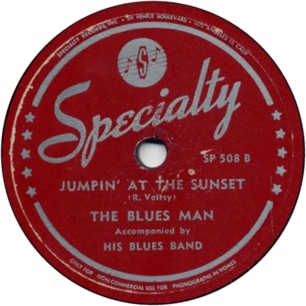
Johnny Morton (tp); Oett "Sax" Mallard (as, arr); Bill Casimir (ts -1); Bill Owens (p); Leonard "Baby Doo" Caston (eg); Dallas Bartley (b -2); Armand "Jump" Jackson (d); The Blues Man [Roosevelt Sykes] (voc where noted); Sunnyland Slim (voc where noted).
Chicago, September 26, 1946
| SP 505 A | Blues at Midnight -1, 2 | Specialty 505 | |
| SP 505 B | Homesick Blues (Sykes)^ [RS voc] -1, 2 | Specialty 505, Specialty [Br] SNTF5015, Sonet [Fr] SPY LP 28099, Wolf [Au] WBJ CD-005 | |
| SP 507 A | Alley Cat Woman^ [RS voc] -1, 2 | Specialty 507 | |
| SP 507 B | Night Life Blues* [SS voc] -1, 2 | Specialty 507 | |
| SP 508 A | Ice Cream Freezer^ ("R. Veltsy") [RS voc] | Specialty 508, Specialty 5SPCD 4412 | |
| SP 508 B | Jumpin' at the Sunset^* ("R. Veltsy") [RS voc] | Specialty 508 |
Most of our session details are from Leadbitter and Slaven, 1987. However, LS convert the bassist into "Bill" Carter, estimate the date as 1946/1947, and give no information about the lineup on either side of Specialty 508. The Specialty 5-CD box set, 5SPCD 4412, The Specialty Story, which includes two sides out of these sessions on Disc 1, gives two dates: September 26 for "Ice Cream Freezer" and October 4 for "Rainy Day Blues." We have reconstructed the two sessions from the different tenor sax, piano, guitar, and bass players used on each; we of course don't know the order the tracks were cut in at either session, because Specialty's matrix numbers were strictly of the A and B variety.
Our information about the vocals and matrixes of Specialty 507 is confirmed from a copy in Otto Flückiger's collection. The label of 507 B has the above personnel without The Blues Man but spells Bartley as "Bartel." 507 A has "vocal by The Blues Man acc. by his Blues Band." Specialty 505 supposedly also appeared under "Baby Doo" Caston's name.
French Sonet SPY LP 28099 was a various artists compilation titled City Blues. Wolf WBJ CD-005 is an Austrian CD titled Roosevelt Sykes: West Helena Blues, Postwar Years Vol. 2. We filled in the other reissues of "Homesick Blues" from Tom Lord's Jazz Discogaphy.
There is a salient electric guitar solo on "Ice Cream Freezer," putatively the work of Baby Doo. "Jumpin' at the Sunset" features a trumpet solo by Johnny Morton, two piano solos, a tenor solo for Sugarman Penigar, a guitar solo, and finally an alto sax solo for Sax Mallard. "Blues at Midnight" has not been checked yet.
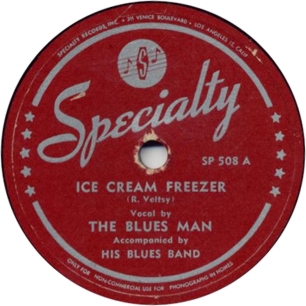
Eight days later, Art Rupe put together a second session that featured Jump Jackson as leader and once again used his horn men Morton and Mallard. Eddie "Sugarman" Penigar, who did double duty on piano and tenor sax in the clubs, was brought in to reinforce the front line. In place of Jackson's rhythm players, Rupe hired Bob Carter's trio, which was doing steady business in South Side clubs at the time. According to his niece, Barbara Berry (email communication, November 14, 2009), Robert James Carter was born in Montgomery, Alabama, in 1917. He moved to Chicago as an adult. After serving in the army during World War II, Carter began working as a leader on the South Side in 1945; from September 1946 to April 1947 his trio held down a steady engagement at the Wonder Bar. Carter's bandmates were "Prof." Art Simms on piano and Walter Scott on guitar.
This session was Bob Carter's debut on record. In March 1947 he would cut 4 sides for Sunbeam with the same trio. In November or December 1947, the trio recorded eight sides for the Universal label, though just two were released. In April 1949, Carter's trio (expanded to a sextet for the session) cut two singles for a tiny label called Rim. In 1950, Scott would join the combo led by tenor saxophonist Eddie Chamblee. Meanwhile, Carter played in a number of bands during the decade; around 1959 he became a regular member of the R&B combo led by tenor saxophonist Lorenzo Smith. In search of a steadier income, Bob Carter took a job at the Post Office, and became much less active in music after his mother's death in 1968. He died in Chicago in 2001.
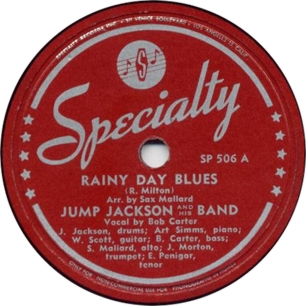
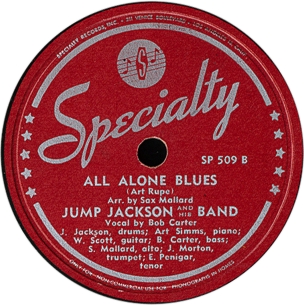
Johnny Morton (tp); Oett "Sax" Mallard (as, arr); Eddie "Sugarman" Penigar (ts); Art Simms (p); Walter Scott (eg); Bob Carter (voc, b); Armand "Jump" Jackson (d).
Chicago, October 4, 1946
| SP 506 A | Rainy Day Blues (Milton) [BC voc] -3, 5, 7, 8 | Specialty 506, Specialty 5SPCD 4412 | |
| SP 506 B | Red Light* (Callender-Enois) -3, 5, 7, 8 [BC, ens voc] | Specialty 506 | |
| SP 509 A | Worryin' Blues ("Rupe") [BC voc] -3, 5, 7, 8 | Specialty 509 | |
| SP 509 B | All Alone Blues ("Rupe") [BC voc] -3, 5, 7, 8 | Specialty 509 |
Our information on 506B from a tape copy in Daniel Gugolz' collection. The label copy for 506 is from the Big Joe Louis collection. Specialty 506 was issued with a silver on red label (as per Big Joe Louis's copy) and with silver on blakc label (as per the Internet Archive copy). Art Rupe changed his label design a few times during the late 1940s, in part to thwart counterfeiting of Specialty singles. The label copy for 509 is from Robert L. Campbell's collection.
Mallard is prominent on "Rainy Day Blues" but gets no solo; Sugarman Penigar is responsible for the tenor solo.
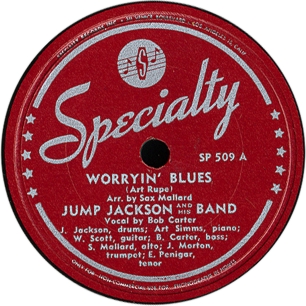
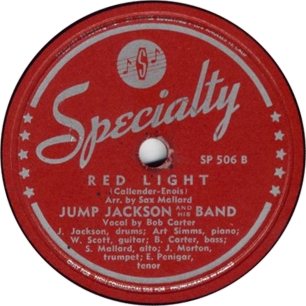
A Chicago Defender advertisement (September 28, 1946) for Jump Jackson's band, including Sax Mallard, "Funny Man Johnny Morton," and pianist Bill Owens, indicates how well established they were by this time. The same ensemble can be seen in the above photo from the Garrick Theater Lounge. (It was signed by the band members on October 4, 1946, probably at the end of the recording session, but must have been taken somewhat before that—since the Garrick closed on September 23.) Sax Mallard wrote, "To Art [Rupe]—a 'hard driver.'"
Meanwhile, business must have been booming at the Blue Heaven, because on October 3, Jackson posted a six-month contract with the establishment.
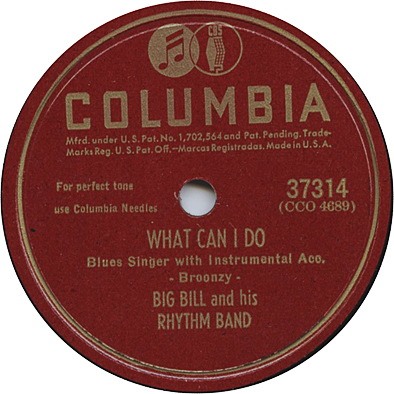
Big Bill Broonzy (voc, g) with Johnny Morton (tp); Oett "Sax" Mallard (as); Bill Casimir (ts); Charles Belcher (p); Ransom Knowling (b); Lawrence "Judge" Riley (d).
Chicago, December 4, 1946
| CCO 4686 | I Can Fix It (Broonzy) | Columbia 37502, "Columbia 30051," Document BDCD 6047 | |
| CCO 4687 | Old Man Blues (Broonzy) | Columbia 37502, "Columbia 30051", Document BDCD 6047 | |
| CCO 4688 | I Can't Write | Epic EG37318, Document BDCD 6047 | |
| CCO 4689 | What Can I Do* (Broonzy) | Columbia 37314, "Columbia 30016," Document BDCD 6047 |
Information from LS 1968 and LS 1987. Columbia 37314 was released in April 1947 (listed in Billboard, April 19, 1947, p. 33; reviewed there on May 17, p. 132). 37502 was listed on July 12, 1947 (p. 33) and reviewed in Billboard on July 19 (p. 128). 30016 and 30051 were numbers assigned to these singles in the 30000 series but not used on the labels or in company advertising. Epic EG37318 was a 2-LP set titled OKeh Chicago Blues. Document BDCD 6047, Big Bill Broonzy Volume 12 (1945-1947), was released in 1995.
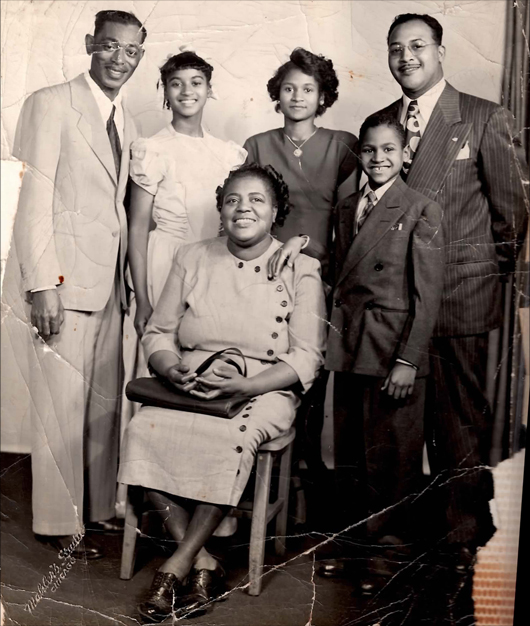
There was a lull in Mallard's recording activities for the first 5 months of 1947, though the rest of the year would more than make up for it. Starting in March the Jackson combo seems to have divided its appearances between the Blue Heaven (3 week contract accepted and filed on March 6, 1947) and the Argyle Show Lounge (indefinite contract filed on the same date). On June 5, Jackson posted contracts with the Zanzibar Lounge (a venue known mostly as a blues club; 4 weeks with an option) and the Blue Heaven (also for 4 weeks). In mid-June the band moved to Morocco Lounge (Jackson posted a two-week contract on June 19).
When Mallard reappeared on record, it was for a new independent called Aristocrat. Talent scout Sammy Goldberg brought Jump Jackson to the label, which gave him the opportunity to record as a leader of a larger studio ensemble. Mallard's role was to provide arrangements and lachrymose alto sax solos on two ballads, one of them his own composition. Tenor saxophonist Tom Archia, recruited from the house trio at the Macomba Lounge, was the designated jump soloist (see the Tom Archia Discography).
A photo in the Chicago Defender, June 14, 1947, proclaims: "Giving the Patrons an earful of swing and jive that has kept the New Morocco Lounge, Drexel and Oakwood Boulevard, rocking in rhythm, Jump Jackson's engagement has been extended by popular request." Four musicians are seen in the photo: Sax Mallard, Bill Owens (the pianist) holding a clarinet, Johnny Morton playing his trumpet, and Jump Jackson. The caption gives Mallard's first name as "Jay," and renders Morton's last name as "Martin." The same photo and blurb ran in the Chicago Bee on June 22. Sloppy captioning aside, the core band for the next session obviously came from the New Morocco Lounge. Tom Archia was in the house band at the Macomba Lounge, just a few blocks away; he was probably brought to the session by talent scout Sammy Goldberg. Hurley Ramey, Dallas Bartley, and Sugarman Penigar were active at other Chicago clubs.
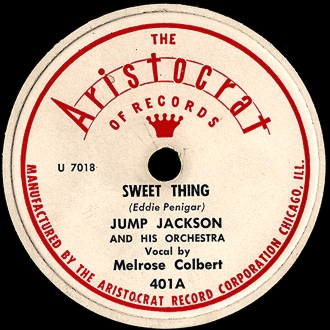
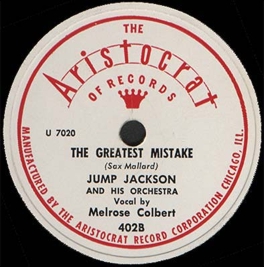
Armand "Jump" Jackson (d); Johnny Morton (tp except -1); Oett "Sax" Mallard (as except -1); Eddie "Sugarman" Penigar (ts except -1); Tom Archia (ts); Bill Owens (p); Hurley Ramey (eg); Dallas Bartley (b); Melrose Colbert (voc); Benny Kelly (voc).
Universal Recording, Chicago, June 1947
| U7018 | Sweet Thing (Eddie Penigar)* [MC voc] | Aristocrat 401A | |
| U7019 | Choo Choo Blues (D. Clark) [BK voc] | Aristocrat 403A | |
| U7020 | The Greatest Mistake (Sax Mallard)* [MC voc] | Aristocrat 402B | |
| U7021 | Not Now Baby (Kelly-Goldberg) -1 [BK voc] | Aristocrat 401B, Oldies Blues 8014 | |
| U7022 | Hey Pretty Mama (Hickman-Jackson)* [BK, ens voc] | Aristocrat 402A, MCA 380-596 [CD] | |
| U7023 | I'm Cutting Out on You [prob. BK voc] | unissued |
Jepsen's Jazz Records and Michel Ruppli's discography The Chess Label have mistakenly split this session in two. They have U7018-U7020 with Morton, Mallard, Penigar, and the rhythm section; then they list U7021-U7023 with only Archia and the same rhythm section. Yet all four horns are present on U7018, U7019, U7020, and U7022. Only on U7021 is Tom Archia the sole horn.
A major cause of confusion for the previous discographies was swapping U7019 and U7022 (and besides being given the wrong matrix number in these sources, U7019 was retitled "Train Blues.") The dangers of relying on Chess record company files are fully evident! Jepsen and Ruppli's longer title for U7021, "Not Now Baby, I'll Tell You When," is presumably derived from the files.
Correct information on U7018-U7022 from copies of Aristocrat 401, 402, and 403 in Dan Kochakian's collection. U7023 as per Ruppli—since 78s needed flip sides, a 5-track session would not have been done on purpose. "The Greatest Mistake" features Sax Mallard's alto sax (Melrose Colbert, it should be noted, was a female vocalist). Mallard draws another assignment to the schmaltz patrol on "Sweet Thing."
"Hey Pretty Mama" has solos by Tom Archia, Hurley Ramey (presumably—the guitarist sounds a little different from the guitarist on the next session), Johnny Morton, an "oo-bop she-bam" riff led by Archia, and a break by Sax Mallard. Archia is the sole horn on "Not Now Baby" and has a long solo on "Choo Choo Blues."
The flip side of 403 was the last item from the Clarence Samuels session with Dave Young's Orchestra (U7047, "I Don't Love You Mamie"). U7023 was left unused.
According to George R. White, "The Aristocrat of Records,"Blues and Rhythm, 124, Nov. 1997, pp. 4-8, Aristocrat 401 was released in September 1947, 402 in November 1947, and 403 in December of that same year. (See the Aristocrat page.)
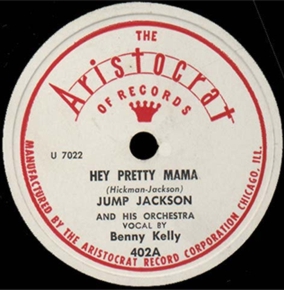
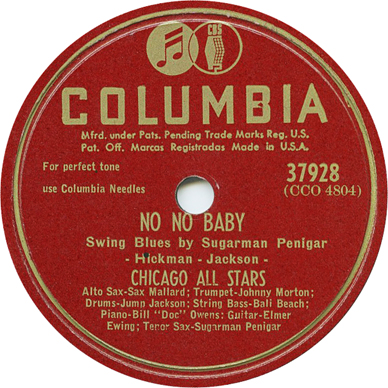
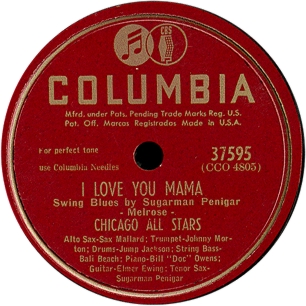
Shortly after the Aristocrat session, Jackson got the call to put together a comparable all-star band for Columbia. This session used a different guitarist and bassist and dispensed with Tom Archia's services. It also recycled "Hey Pretty Mama" as "Hey Hey Big Mama," now sung by Johnny Morton.
Johnny Morton (tp, voc); Oett "Sax" Mallard (as -1; cl -2); Eddie "Sugarman" Penigar (ts, voc); Bill "Doc" Owens (p); Elmer Ewing (eg); Roscoe "Bali" Beach (b); Armand "Jump" Jackson (d).
Columbia Studio, Chicago, June 27, 1947
| CCO 4804-1 | No No Baby (Hickman-Jackson)* [SP voc] -1 | Columbia 37928, "Columbia 30098," Oldie Blues [Nl] OL 8014, RST 91577 [CD] | |
| CCO 4805-1 | I Love You Mama (Melrose) [SP voc] -1 | Columbia 37595, "Columbia 30056," Oldie Blues [Nl] OL 8014, RST 91577 [CD] | |
| CCO 4806-1 | Hey Hey Big Mama (Hickman-Jackson)* [JM, ens voc] -1, 2 | Columbia 37928, "Columbia 30098," Oldie Blues [Nl] OL 8014, RST 91577 [CD] | |
| CCO 4807-1N | Green Light* [JM, ens voc] -1 | Columbia 37595, "Columbia 30056," Oldie Blues [Nl] OL 8014, RST 91577 [CD] |
Our basic information comes from Lord's Jazz Discography. Lord gives the title of the the first track as "No Baby" and gives the release number as 37828 (which was a Kay Kyser single) instead of 37928. Our information about the 30000 ("race") series numbers and the exact session date come from the Mohr-Flückiger-Demeusy files. Willie "Long Time" Smith cut the preceding Chicago session for Columbia (up to CCO 4803) on June 13. (Leadbitter and Slaven 1987 give the date as July 27, which is definitely wrong.)
Four photos of the Columbia All Stars recently surfaced, when the collection of jazz photographer Burt Goldblatt was auctioned off on ebay. Goldblatt didn't take them; he obtained them from a Chicago-based photographer named Fran Byrne. And the photos were taken in the Columbia studio, with a recording mike on view—but not during the session. We know this for certain because Elmer Ewing was not available, and was replaced for the photo shoot by Ransom Knowling, a bassist pretending to play ... Big Joe Williams' 9-string guitar. Big Joe recorded for Columbia on July 22, 1947, with Knowling and John Lee "Sonny Boy" Williamson, so the photo shoot must have taken place on or around that date.
Columbia 37595 (the number was incorrectly given as 37594) was reviewed in Billboard on October 4, 1947 (p. 120). Columbia 37928 was reviewed in Billboard on November 8, 1947.
"No No Baby" features a solo by Sax Mallard on alto and a guitar solo by Elmer Ewing. "I Love You Mama" includes solos by Sugarman Penigar, Johnny Morton (muted), Ewing, and Penigar again. "Hey Hey Big Mama" has solos by Bill Owens and Sugarman Penigar, a break by Ewing, and a clarinet outing by Mallard. On "Green Light" there are solos by Sugarman Penigar (tenor sax), Bill Owens (piano), and Sax Mallard (alto).
All four tracks were reissued in 1986 on Oldie Blues OL 8014, Screaming Boogie: Hot Screamin' Saxes from Chicago. All were reissued again in 1994 on RST 91577, an Austrian CD titled Chicago Jump Bands: Early R&B Vol. 1, 1945-1953.
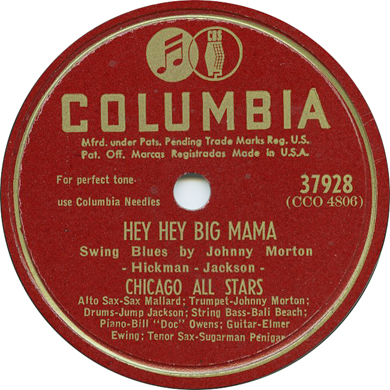
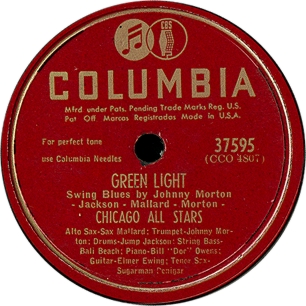
Around the time of the Columbia session, Jackson moved his band again, to the Brown Derby (4-week contract posted on July 3, 1947). In mid-August (indefinite contract posted August 21), Jackson moved to the Bee Hive, which at this early point in its history was oriented toward boogie woogie and R&B (it would gain its greatest fame, in the early 1950s, as a bebop venue).
At this point we previously listed a July 1947 session by Tom Archia and his All Stars for Aristocrat. (This session produced Aristocrat 801 and 802—all four sides featuring vocals by Dr. Jo Jo Adams.) However, careful listening to the entire session reveals that the alto saxophonist is a bebopper (our best guess is Archia's old colleague Goon Gardner) and definitely not Sax Mallard.
Never fear—there were plenty of other recording opportunities to come. In September, every recording operation in Chicago, big or small, started stockpiling sides in anticipation of the recording ban announced by the American Federation of Musicians for January 1, 1948. Calls came from RCA Victor, Columbia, Aristocrat, even from Mercury.
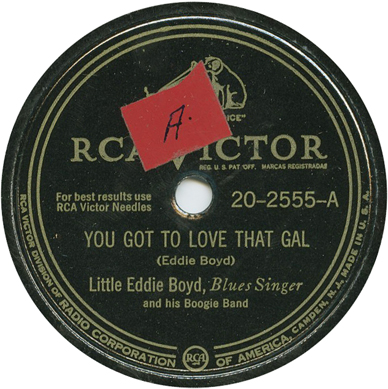
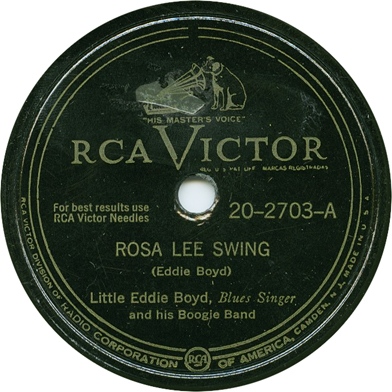
Eddie Boyd (voc, p); Oett "Sax" Mallard (cl -1, as -2); Bill Casimir (ts); E. L. Liggett (b); Booker T. Washington (d).
Chicago, September 16, 1947
| D7VB1021 | You Got to Love That Gal (Boyd) -2* | RCA Victor 20-2555-A, Crown Prince [Swe] IG-400, Blues Collection [Fr] 160002 [CD] | |
| D7VB1022 | Rosa Lee Swing (Boyd) -1* | RCA Victor 20-2703-A, Crown Prince [Swe] IG-400, Blues Collection [Fr] 160002 [CD] | |
| D7VB1023 | Unfair Lovers (Boyd) -2 | RCA Victor 20-2555-B, Blues Collection [Fr] 160002 [CD] | |
| D7VB1024 | Blue Monday Blues (Boyd) -2* | RCA Victor 20-2703-B, Crown Prince [Swe] IG-400, Blues Collection [Fr] 160002 [CD] |
Our basic session information comes from Leadbitter and Slaven, Blues Records 1943-1970 A-K (1987). However, LS lump the 4 sides from this session with the 4 sides from a second Eddie Boyd session recorded on October 28—despite the evidence of the matrix numbers! E. L. Liggett is presumably the same bass player as Leroy Liggett, who was mentioned in Chicago Defender advertisements.
RCA Victor 20-2555 got a prompt release: it was listed in Billboard on October 25, 1947 (p. 130). RCA Victor 20-2703 followed in February 1948 (advertised in Billboard on February 28, p. 25).
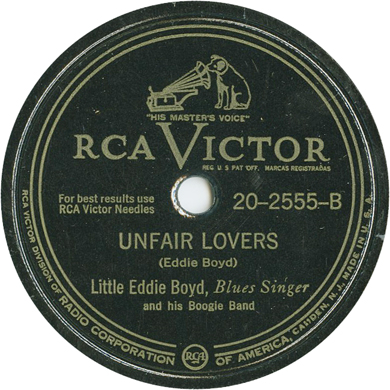
Eddie Boyd refers to Sax Mallard by name on all three of Mallard's solo features: "You Got to Love That Gal," "Rosa Lee Swing" and "Blue Monday Blues." On the whole, this session includes some of his best blues solos from the period. "Gas me, Mr. Mallard! Blow it till she come back home!" is Boyd's exhortation on "Blue Monday Blues." On "Unfair Lovers" Mallard and Casimir play an arranged duet passage in lieu of soloing.
Three tracks from this session were included in Swedish Crown Prince LP IG-400, Rattin' and Running Around, which was issued in 1981; our thanks to Dave Penny for this information.
All four tracks from this session were included on Blues Collection 160002, a French CD titled Eddie Boyd: The Complete Recordings 1947-1950 and issued in 2001.
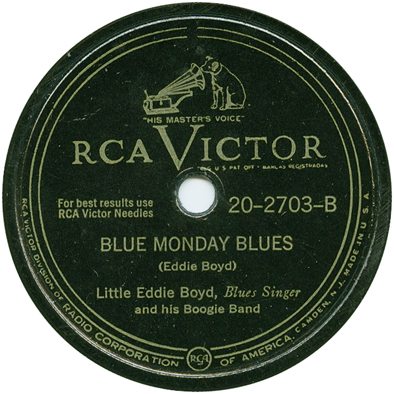
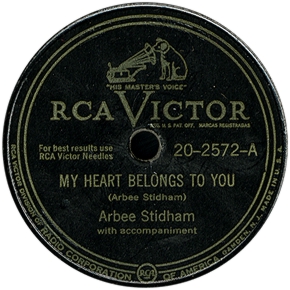
Arbee Stidham (voc) with Oett "Sax" Mallard (as); Bill Casimir (ts); Bob Call (p); Tampa Red (eg); Ransom Knowling (b); Lawrence "Judge" Riley (d).
Chicago, September 18, 1947
| D7VB1032-1 | In Love with You (Stidham) | RCA Victor 20-2767-B, Blue Moon BMCD 6038 | |
| D7VB1033-1 | I Found Out for Myself (Stidham) | RCA Victor 20-2572-B, RCA Victor 50-0003-B, RCA Victor 20-4951, RCA Victor 47-4951, Crown Prince [Swe] IG-404, Blue Moon BMCD 6038 | |
| D7VB1034-1 | I Don't Know How to Cry* (Stidham) | RCA Victor 20-2767-A, Blue Moon BMCD 6038 | |
| D7VB1035-1 | My Heart Belongs to You (Stidham) | RCA Victor 20-2572-A, RCA Victor 50-0003-A, RCA Victor 20-4951, RCA Victor 47-4951, Camden CAL 470, Crown Prince [Swe] IG-404, Blue Moon BMCD 6038 |
Our session information comes from Leadbitter and Slaven 1968. The 20- prefix indicates a 78-rpm release; the 50- and 47- releases indicate 45s. RCA Victor introduced 45s in April 1949, so the original issues were on 78 only.
Camden CAL 470 was an anthology LP titled Original Rhythm & Blues Hits by Rhythm & Blues Stars from 1963. Crown Prince IG-404 was a Stidham LP released in Sweden in 1982, under the title My Heart Belongs to You. Blue Moon BMCD 6038 is the first Stidham CD collection, issued in 2004; the title is The Complete Recordings Volume 1 1947-1951.
This was Stidham's first session as a leader. Stidham's first record, "My Heart Belongs to You," turned into a sizeable R&B hit. So sizeable that it ended up being released three times: first as a 78 in November 1947 (Billboard, November 8, 1947, p. 33), given a second push several months later (see the RCA Victor ad in Cash Box, May 8, 1948, p. 8); then as a 45 in RCA's new "race" series (50-0003, which probably came out in April 1949, resplendently features a blue-gray label and a pressing on cerise vinyl); finally, after Stidham was no longer under contract to the company, in November 1952 as a reissue on 78 (20-4951) and 45 (47-4951) in November 1952. RCA Victor advertised a batch of its R&B reissues in Cash Box on November 15, 1952 (p. 25); by then there was no more cerise vinyl, most of the color-coded 45 series having been phased out at the end of 1950.
RCA Victor 20-2767 was released in April 1948 (Billboard, April 3, 1948, p. 23). It did not rate a reisue on 45.
Bill Casimir has a prominent tenor sax solo on "My Heart Belongs to You" and can also be heard on "In Love with You." Bob Call is the soloist on "I Found Out for Myself." "I Don't Know How to Cry" has an alto solo from Sax Mallard. Our thanks to Daniel Gugolz for a tape dub from Victor 20-2767.
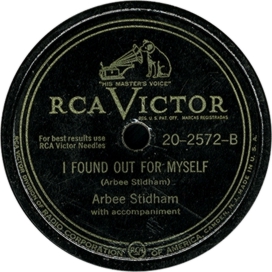
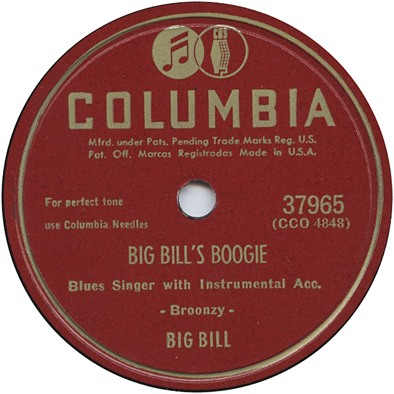
Big Bill Broonzy (voc, eg) with Oett "Sax" Mallard (as); Bill Casimir (ts); Bob Call (p); unidentified (b); Lawrence "Judge" Riley (d).
Chicago, September 29, 1947
| CCO 4848-1N | Big Bill's Boogie* (Broonzy) | Columbia 37965, "Columbia 30101," Document BDCD 6047 | |
| CCO 4849-1 | Just Rocking* (Broonzy) | Columbia 38070, "Columbia 30109," Document BDCD 6047 | |
| CCO 4850-1 | Shoo Blues (Broonzy) | Columbia 37965, "Columbia 30101," Document BDCD 6047 | |
| CCO 4851-1 | I Feel like Crying* | Document DOCD 5525 |
Our session information is from Leadbitter and Slaven 1968 and LS 1987. Columbia 37965 was listed in Billboard on November 15, 1947 (p. 23; for some reason, none of the new releases in that issue had their numbers attached). Columbia 38070 was listed in Billboard on January 24, 1948 (p. 69). Columbia 30101 and 30109 were their notional couterparts in the "race" series. The take numbers are derived from the liners to Document BDCD 6047, Big Bill Broonzy Volume 12 (1945-1947).
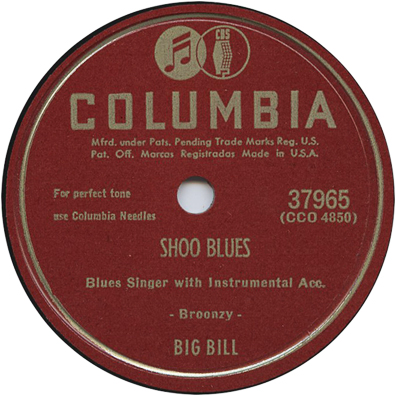
The Document CD gives the title of CCO 4850 as "Shoo Blues," as Columbia 37965 did—and that is what Big Bill sings. The source for "I Feel like Crying" is Document DOCD 5525, Too Late, Too Late: More Newly Discovered Titles and Alternate Takes, Volume 7 (1927-1955). Mallard gets a brief tag on this number.
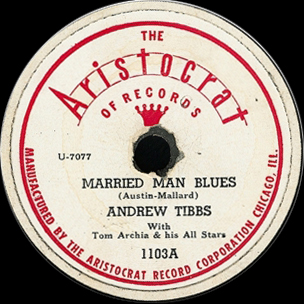
Besides Columbia and Victor, Mallard remained in demand at Aristocrat, which did not use the Jackson band again, but did call him and Johnny Morton back for a Tom Archia session.
Sax Mallard had helped keep Andrew Tibbs out of trouble before his first session; now he was playing on the singer's second.
Andrew Tibbs (voc); Tom Archia (ts, ldr); Johnny Morton (tp); Oett "Sax" Mallard (as, arr); Bill Searcy (p); Lowell Pointer (b); Robert "Hendu" Henderson (d).
Universal Recording, Chicago, October 1947
| U-7074 | I Feel like Crying (Tibbs) | Aristocrat 1103B, Chess MCA 380-596 [CD], Classics 5028 [CD] | |
| U-7075 | Going Down Fast (Mallard) | Aristocrat 1104^, Classics 5028 [CD] | |
| U-7076 | Same Old Story (Tibbs) | Aristocrat 1104^, Classics 5028 [CD] | |
| U-7077 | Married Man Blues* (Austin-Mallard) | Aristocrat 1103A, Classics 5028 [CD] |
Ruppli omits personnel other than Tibbs (who sings on all 4 sides) and Archia; no previous discography mentioned the alto sax or the trumpet. The solo alto spot on "Married Man Blues" is by Sax Mallard, who co-composed the tune. Mallard also wrote "Going Down Fast," and is obviously responsible for several arranged ensembles. There are prominent piano intros on all four sides; they are definitely by the same pianist who participated in the previous session. Bill Searcy is the logical choice. Andrew Tibbs becomes "Andy" on Aristocrat 1104.
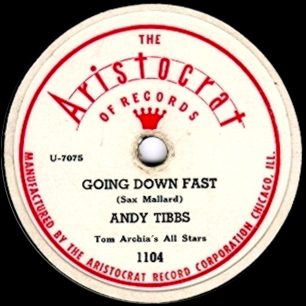
Aristocrat 1103 and 1104 were 78-rpm singles; according to White's article in Blues and Rhythm, they were released in June and October 1948. There are no side indications on Aristocrat 1104. "Married Man Blues" was Side A of Aristocrat 1103; Ruppli omits U7077 and incorrectly gives U7078 as the matrix for "Married Man Blues." Lord mentions Aristocrat 1103 but gives no matrix numbers or date; he omits Aristocrat 1104 entirely. Aristocrat 1103 was one of Aristocrat's best sellers in the early going (we are talking modest numbers here).
MCA 380-596 is 15-CD extravaganza, released in 1999 and titled The Chess Story 1947-1975. It contains the first reissue of anything from this session in 52 years. The entire session (unfortunately with incorrect discographical information) was reissued for the first time in February 2002 on Andrew Tibbs 1947-1951, Classics 5028.
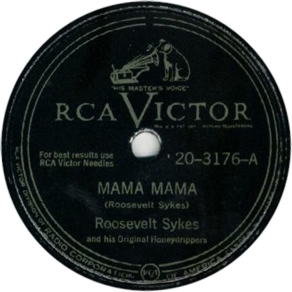
Roosevelt Sykes (voc, p) with Johnny Morton (tp); Oett "Sax" Mallard (as); Bill Casimir (ts); Sam Casimir (eg); Ernest "Big" Crawford (b); W.B. "Sleepy" Nelson (d).
Chicago, October 15, 1947
| D7VB1070 | Mama Mama (Sykes) | RCA Victor 20-3176-A, RCA [Fr] PM42028, Document BDCD 6048 | |
| D7VB1071 | I Got Eyes for You | unissued | |
| D7VB1072 | Doodle Rag | unissued | |
| D7VB1073 | Walkin' and Drinkin'* | RCA Victor 22-0011, RCA [Fr] PM42028, Document BDCD 6048 |
Session information from LS 1968 and LFP 1994; the French RCA issue is mentioned in Lord.
Only two of the four sides have seen release. RCA Victor 20-3176 hit the stores in November 1948 (listed in Billboard on November 6, p. 31, and reviewed on December 4, 1949, p. 98). 22-0011 (now in a new series for "race" 78s, though this one lacked an accompanying 45) came out in March 1949 (Billboard, March 12, 1949, p. 40; reviewed on April 9, p. 214). The two issued tracks are also included in Roosevelt Sykes Volume 8 (1945-1947) on Document BDCD 6048.
Mallard's solo contribution to "Walkin' and Drinkin'" is a brief tag in the coda.
W. B. "Sleepy" Nelson, who appeared on this Roosevelt Sykes session, would become Sax Mallard's regular drummer.
Washboard Sam (voc, wbd) with Oett "Sax" Mallard (cl); Bob Call (p); Big Bill Broonzy (g); Ernest "Big" Crawford (b).
Chicago, October 16, 1947
| D7VB1078 | Facing Life* | RCA Victor 20-3024-B, Document DOCD 5177 | |
| D7VB1079 | No Special Rider* | RCA Victor 20-2606, Document DOCD 5177 | |
| D7VB1080 | Ramblin' with That Woman* | RCA Victor 20-2606, Document DOCD 5177 | |
| D7VB1081 | Love Me or Let Me Be (Brown)* | RCA Victor 20-3024-A, Document DOCD 5177 |
Our session information comes from LS 1968. The same information can be found in the liners to Document DOCD 5177, Washboard Sam, Volume 7 (1942-1949). Both sources have Mallard playing alto sax and clarinet on the session. In fact, he plays clarinet throughout.
RCA Victor 20-2606 greeted the second Petrillo ban in a company advertisement from January 3, 1948 (Billboard, p. 23). 20-3024 was included in the ad from August 14, 1948 (p. 21).
Eddie Boyd (voc, p); Oett "Sax" Mallard (cl -1; as -2); Bill Casimir (ts); E. L. Liggett (b); Booker T. Washington (d).
Chicago, October 28, 1947
| D7VB1109 | Why Did She Leave Me (Boyd) -1* | RCA Victor 20-3058A, RCA Victor 20-3060, Blues Collection [Fr] 160002 [CD] | |
| D7VB1110 | Playmate Shuffle (Boyd) -2 | RCA Victor 20-2920A, Blues Collection [Fr] 160002 [CD] | |
| D7VB1111 | Mr. Highway Man (Boyd) -1, 2 | RCA Victor 20-3058B, Blues Collection [Fr] 160002 [CD] | |
| D7VB1112 | Getting My Divorce (Boyd) -2* | RCA Victor 20-2920B, Blues Collection [Fr] 160002 [CD] |
Leadbitter and Slaven 1968 and 1987 incorrectly included these four sides with the September 16 session; the correct date comes from Robert Ferlingere's chronological list of Victor matrix numbers.
RCA Victor 20-2920 was advertised in Billboard on June 19, 1948 (p. 35). 20-3058 was included in the company's Billboard ad on August 7, 1948 (p. 114) and again on August 28 (p. 23).
The flip of Victor 20-3060, a special promotional disk, was by Illinois Jacquet.
Mallard's clarinet shares the solo duties with Bill Casimir's tenor sax on "Why Did She Leave Me?". "Blow it, Mallard. Rock a while!" says Eddie Boyd. On "Mr. Highway Man" Mallard only gets to do background figures, though his chalumeau-register accompaniment to the piano solo is very nice. Mallard plays the only solo (on alto sax) on "Getting My Divorce" whereas Casimir has both solos on "Playmate Shuffle".
Neglected by reissuers, all four tracks from this session are now included on Blues Collection 160002, a French CD titled Eddie Boyd: The Complete Recordings 1947-1950 and issued in 2001.
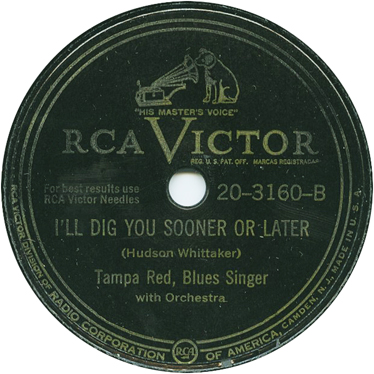
Tampa Red (voc, g) with Oett "Sax" Mallard (as); Bill Casimir (ts); Bob Call (p); Ransom Knowling (b); Lawrence "Judge" Riley (d).
Chicago, October 31, 1947
| D7VB1114 | Sugar Baby | RCA Victor 20-3309, Krazy Kat [Br] KK7411, Document DOCD 5213 | |
| D7VB1115 | Keep Jumping | RCA Victor 22-0009, Wolf [Au] WBJ-001, Document DOCD 5213 | |
| D7VB1116 | I'll Dig You Sooner or Later (Whittaker) | RCA Victor 20-3160-B, Wolf [Au] WBJ-001, Document DOCD 5213 | |
| D7VB1117 | Roaming and Rambling | RCA Victor 20-3008, Oldie Blues [Du] OL2816, Document DOCD 5213 |
Our session information comes from LS 1968, confirmed by the liners to Document DOCD 5213, Tampa Red Volume 13 (1945-1947), which was released in 1993. LS 1968 has Mallard also playing clarinet; both LS and the Document liners have Tampa Red also playing kazoo. The Wolf, Oldie Blues, and Krazy Kat reissues are mentioned in Lord's Jazz Discography.
RCA Victor 20-3008, the first release to include a side from this session, came out in July 1948: announced in Billboard on July 10, 1948 (p. 27), advertised on July 31 (p. 25), and reviewed in Billboard on August 14, p. 120. RCA Victor 20-3160 was advertised and reviewed in Billboard on October 30, 1948 (p. 23 and p. 29, respectively). 20-3309 was reviewed in Billboard on January 29, 1949 (p. 106). Finally, 22-0009 was listed as a new release in Billboard on February 26, 1949 (p. 39).
After appearing in a slew of recording sessions (none of which used Jump Jackson at the drum kit), Mallard was ready to go out on his own. He left the Jackson combo and opened at the New Harlem Club (indefinite contract accepted and filed by Local 208 on November 6, 1947). On November 20, he filed another indefinite contract with the New Harlem Cafe (as it was called on this occasion) and picked up relief night work at the Ritz Lounge. Meanwhile Jackson put together a new group featuring a tenor saxophonist; he would continue leading combos in this format for another decade.
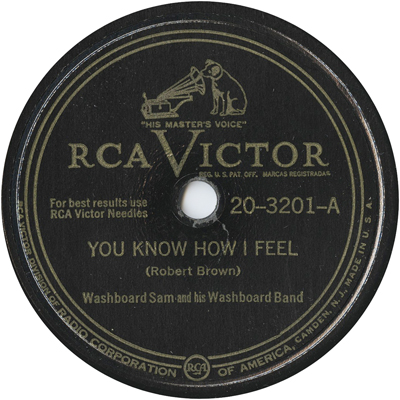
Washboard Sam (voc, wbd) with Oett "Sax" Mallard (cl); Bob Call (p); Big Bill Broonzy (g); Ransom Knowling (b); Lawrence "Judge" Riley (d).
Chicago, November 4, 1947
| D7VB1132 | She's Just My Size (Brown)* | RCA Victor 20-2856-A, Document DOCD 5177 | |
| D7VB1133 | You Know How I Feel (Brown)* | RCA Victor 20-3201-A, Document DOCD 5177 | |
| D7VB1134 | Fool about That Woman (Brown)* | RCA Victor 20-2856-B, Document DOCD 5177 | |
| D7VB1135 | Dollar Is Your Best Friend (Brown)* | RCA Victor 20-3201-B, Document DOCD 5177 |
Session information from LS 1968; the same is contained in the liner notes to Document DOCD 5177, Washboard Sam, Volume 7 (1942-1949). Both sources say Mallard played alto sax and clarinet; actually, he played clarinet throughout this session.
RCA Victor 20-3021 was included in a company advertisement on November 13, 1948 (Billboard, p. 29; listed in the same issue, p. 37; reviewed on December 18, p. 112).
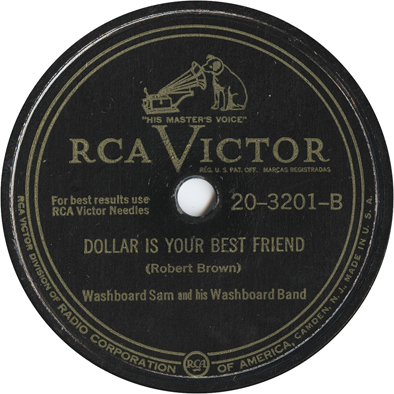
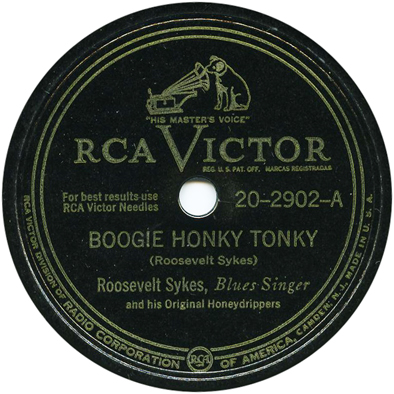
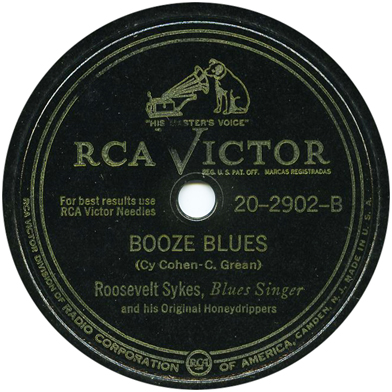
Roosevelt Sykes (voc, p) with Johnny Morton (tp -1); Oett "Sax" Mallard (as); Walker "Blankey" Broadus (ts); Bill Casimir (ts); Emmanuel Sayles (eg); Ransom Knowling (b); Lawrence "Judge" Riley (d).
Chicago, November 18, 1947
| D7VB1169 | Heavy Hearted Blues -1 | unissued | |
| D7VB1170 | Boogie Honky Tonky (Sykes) -1 | RCA Victor 20-2902-A, Oldie Blues [Nl] OL 2818, Document BDCD 6049 | |
| D7VB1171 | Booze Blues (Cohen-Green) -1 | RCA Victor 20-2902-B, Oldie Blues [Nl] OL 2818, Document BDCD 6049 | |
| D7VB1172 | Time Wasted on You (Sykes) -1 | RCA Victor 20-3014-A, Oldie Blues [Nl] OL 2818, Document BDCD 6049 | |
| D7VB1173 | What Is Your Aim Today | unissued | |
| D7VB1174 | Until the Cows Come Home (Sykes) | RCA Victor 20-3315-B, Wolf [Au] WBJ-004 [CD], Document BDCD 6049 | |
| D7VB1175 | High as a Georgia Pine (Sykes) | RCA Victor 20-3014-B, Oldie Blues [Nl] OL 2818, Document BDCD 6049 | |
| D7VB1176 | I Know How You Feel | RCA Victor 22-0041-B, RCA Victor 50-0025-B, Wolf [Au] WBJ-005 [CD], Document BDCD 6049 |
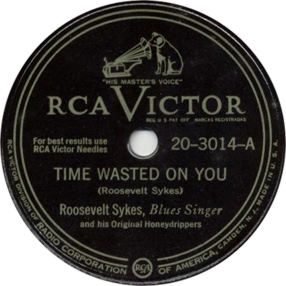
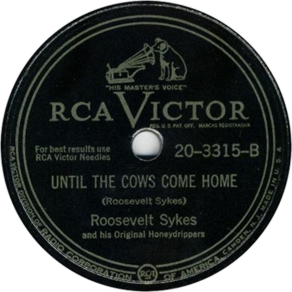
We got our session information from LS 1968 and LFP 1994, and filled in the reissues from Lord's Jazz Discography. Not everything from this 8-tune session drew interest from the record company; two sides are still in the vaults after all these years. But four sides were deemed worthy during the year of the second recording ban. RCA Victor 20-2902 was advertised in Billboard on June 5, 1948 (p. 21). It sold well enough to draw several follow-up mentions in company ads. RCA Victor 20-3014 followed in August 1948 (advertised in Billboard, August 7, 1948, p. 21; reviewed on p. 120). RCA Victor 20-3315 was reviewed in Billboard on January 29, 1949 (p. 106), and RCA Victor 22-0041 was announced in a company ad in Billboard on August 27, 1949 (p. 53). 22-0041 was also made available on 45 rpm in the cerise vinyl series, 50-0025.
Oldie Blues OL 2818, Roosevelt Sykes and his original Honeydrippers: Boogie Honky Tonk, was an LP released in the Netherlands in the late 1970s. Wolf WBJ CD-005 is an Austrian CD titled Roosevelt Sykes: West Helena Blues, Postwar Years Vol. 2. All previously issued tracks are included in Roosevelt Sykes Volume 9 (1947-51) on Document BDCD 6049, a CD released in 1994.
The Document notes give a matrix number of D7VB1171 for "Boogie Honky Tonky" (which Document renders as "Boogie Honky Tonk"; both the labels and the company advertisements are clear about the "Tonky"). The number for "Booze Blues" is given as D7VB1172; and "Time Wasted on You" as D7VB1173; these all appear to be errors. Although some sources identify the tenor player as "Walter," Document (followed by Lord on this particular) correctly has Walker Broadus.
There are no Sax Mallard solos on the issued tracks. Bill Casimir solos on "High as a Georgia Pine" and Walker Broadus on "I Know How You Feel." In both cases, Sykes obligingly identifies the soloist. According to John Newman (email of August 20, 2006), Walker Broadus may have originally come from Lexington, Kentucky; he would later show up on Specialty accompanying guitarist Lester Williams.
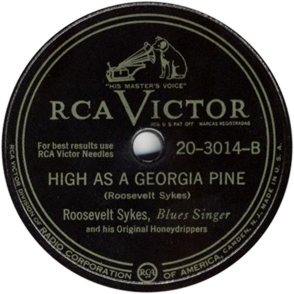
Though Sax Mallard and Roosevelt Sykes would work together again on several occasions, there wouldn't be another opportunity till July 1951, when Sykes signed with the brand-new United label. Sykes, who often recorded under pseudonyms earlier in his career, did a little moonlighting for Bullet. The result was two singles released under the name "Boogie Evans" (with Vicki Zimmer's Bullet 286 coming out in August 1948, his Bullet 288 was presumably from the fall of that year). He returned to RCA Victor for sessions on December 30, 1948 and October 28, 1949, then was cut by the company at the end of the year. In March 1950, he made 6 sides that were meant for Parkway but ended up being released on Regal; he also appeared on a session by John and Grace Brim for the extremely short-lived Random label. Two sessions from April 1951, one featuring Roosevelt and the other with vocals by his wife, Essie, also appear to have involved Parkway and Regal (with all releases appearing on Regal). The Sykes sessions during this period that used horns were the Bullet and the first Regal from 1951, and Sax Mallard was on neither.
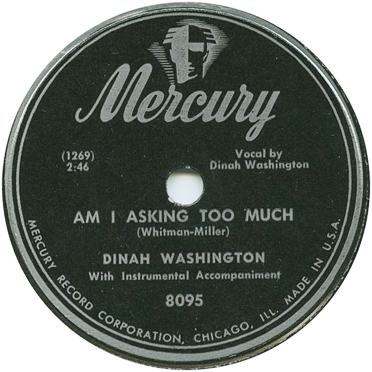
Dinah Washington (voc) accompanied by Dave Young Orchestra: Harry "Pee Wee" Jackson (tp); Oett "Sax" Mallard (as); Dave Young (ts); poss. Prentice McCarey (p); unidentified (eg); Bill Settles (b); Curtis "Geronimo" Walker (d).
Mercury Studios, Chicago, late November 1947
| 1266 | Tell Me So | Mercury 8094, Mercury 832 444 [CD] | |
| 1267 | I Can't Face the Music | Mercury 832 444 [CD] | |
| 1268 | Pete | Mercury 8133, Mercury 832 444 [CD] | |
| 1269 | Am I Asking Too Much (Whitman-Miller)* | Mercury 8095, Mercury MG 20119, Mercury 832 444 [CD] |
Mercury 8094, 8095, and 8133 were 78-rpm singles. Mercury 8094 was released in June 1948 (listed in Billboard, June 26, 1948, p. 29). Mercury 8095 was first listed in Billboard on July 10, 1948 (p. 27); it was a hit. 8133 was reviewed in Billboard on April 30, 1949 (p. 130). The other sides to each 78 come from other Dinah Washington sessions. Mercury MG 20119 is a mono LP from the 1950s. Mercury 832 444, The Complete Dinah Washington on Mercury Vol. 1 (1946-1949), is a 3-CD set issued in 1987.
Existing discographies, following the Kiyoshi Koyama listing in the leaflet to Mercury 832 444, suggest the same personnel as on the two previous Dave Young sessions (behind Dinah Washington for Mercury on August 5, 1947; behind Clarence Samuels and Andrew Tibbs for Aristocrat in late August or early September, 1947). We also have a short item from the Chicago Defender for October 5, 1947, "Dave Young's Ork Jumps at the Ritz," which gives a lineup of: Young (ts); Harry "Pee Wee" Jackson (tp); Andrew "Goon" Gardner (as); Prentice McCary (p); William "Porky" Settles (b); and Curtis "Geronimo" Walker (d). The session date was estimated by interpolation in the Mercury matrix number series; the previous Dinah Washington session (also in Chicago) took up numbers 1224-1227 and took place on November 13, 1947.
Dave Young can't have used quite the same personnel as on August 5 or in September—or quite the same group he used at the Ritz in October. There is a rhythm guitarist on this session and Young didn't use one on those previous occasions. On "I Can't Face" Pee Wee Jackson, who was in the band on the previous sessions, gets an intro. On "Am I Asking" the alto player gets an intro and ending, both played in a Hodges-inspired style with a wide vibrato. There are no other instrumental solos on the session, but these are enough to indicate who the trumpet player and the altoist are. No way is the alto player Goon Gardner (who appeared on the earlier Young sessions). Since Mallard was leading the relief night band at the Ritz when this session was cut, he was the obvious musician to substitute for Gardner.
Some of the drumming on the session suggests Young's collaborator Curtis Walker. Nothing from the rhythm section rules out McCarey or Settles; that's the best we can do. There is very little to go on in identifying the guitarist.
Persistence pays off, as Oett Mallard was no doubt in the habit of saying. Sax Mallard had recorded 26 times before he got a session as a leader. He made the most of the opportunity that Aristocrat presented him, recruiting musicans to amplify his working group (which was probably a quartet). On this session, Mallard showed his strength as a clarinetist. But "Clarinet" Mallard just didn't have that cachet...
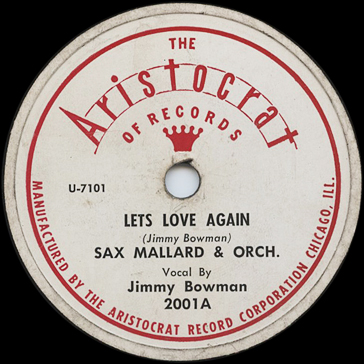
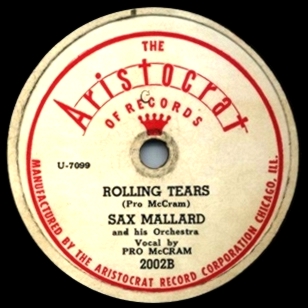
Oett "Sax" Mallard (as -1, cl -2, ldr); prob. Johnny Morton (tp -3); unidentified (as -4, cl -2; ts -5); prob. Bill Casimir (ts); Jimmy Bowman (p, voc); unidentified (eg); unidentified (b); prob. W. B. "Sleepy" Nelson (d); "Pro McCram" [Clarence "Pro" McClam] (voc).
Universal Recording, Chicago, December 1947
| U7098 | Insurance Man Blues | unissued | |
| U-7099 | Rolling Tears # (McClam) [PM voc] -1, 3, 4 | Aristocrat 2002B | |
| U-7100 | Evelyn @ (Austin-Mallard) | Aristocrat 2003A | |
| U-7101 | Lets [sic] Love Again % (Bowman) [JB voc] -2 | Aristocrat 2001A | |
| U-7102 | The Mojo ^ (Mallard) -1, 3, 5 | Aristocrat 2001B | |
| U-7103 | Summit Ridge Drive * (Shaw) -1, 2, 3, 4 | Aristocrat 2002A |
Our information about these three releases derives from 78s in the collections of Dan Kochakian, Tom Kelly, George Paulus, and Robert L. Campbell.
Leadbitter, Fancourt, and Pelletier (1994) described the instrumental lineup as trumpet, tenor sax, poss. other saxes, p, eg, b, and d. They don't seem to have realized that Mallard played alto sax, and they identify the group as the Sax Mallard All Stars. Jimmy Bowman had been the pianist in Duke Groner's trio from late 1946 through the earlier part of 1947, so we can fill in the credit for that instrument. We identified Morton and Casimir by ear. Mallard actually solos on clarinet on "Lets Love Again" and "Summit Ridge Drive" (the latter being the well-known Artie Shaw number). The guitarist solos on both of those as well as "The Mojo" (where Mallard solos on alto sax).
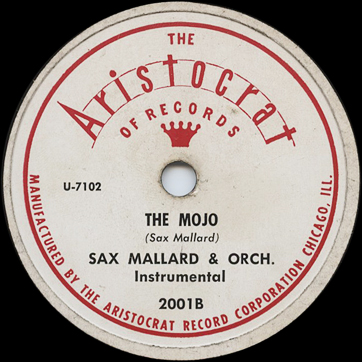
LFP give U7098 as "Insurance Man Blues" and U7099 as "I've Got the Blues," both supposedly unissued. But then they list "Rolling Tears" and "Dedicated to You" without matrices, and say they were "retitled from above session." Ah, the vagaries of company files! "Rolling Tears" is a blues, so it may have been entered as "I've Got the Blues." Meanwhile "Dedicated to You" is the real title on Aristocrat 2003B—but it's the number recorded in April 1947 by the 5 Blazes and already issued on Aristocrat 201. However, on the Aristocrat 2003B version of "Dedicated to You," pianist Ernie Harper, who had handled the lead vocal on the song and subsequently become a solo act, is given top billing. Aristocrat must not have been happy with "Insurance Man Blues," which has never been issued.
Leadbitter, Fancourt, and Pelletier (1994) give 1948 as the recording date; this is incorrect, for reasons explained on the Aristocrat page.
Aristocrat 2001 was released in March 1948. Sax Mallard's first release enjoyed at least regional success. In February 1948, Cash Box opened its "Hot on Central Avenue" feature, covering R&B hits in Los Angeles. "The Mojo" first appeared at number 6 on April 2. It was in 9th position on April 24, 1948, #6 on May 1, #4 on May 15, and #9 on May 22. Clearly the record was selling in LA and getting on the jukeboxes there. However, "The Mojo" did not chart in the "Hot in Harlem" listing or in "Hot on Chicago's South Side." Aristocrat 2002 followed in October 1948, and Aristocrat 2003 (which gives Jimmy Bowman top billing on the A-side label) was held till February 1949. Aristocrat 2002 has "Sax Mallard & his Orchestra" while 2001 settles for "Sax Mallard & Orch." Vocalists are as identified on the label.
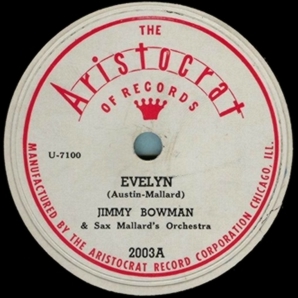
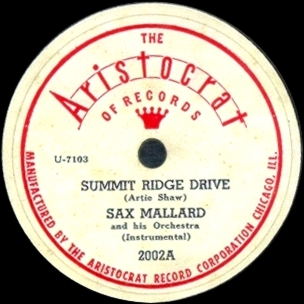
In mid-December, Mallard moved his group to George's Cocktail Lounge (indefinite contract accepted and filed on December 18).
Big Bill Broonzy (voc, eg); with Johnny Morton (tp); Oett "Sax" Mallard (as); Bill Casimir (ts); Bob Call (p); Ransom Knowling (b); Lawrence "Judge" Riley (d).
Columbia Studios, Chicago, December 19, 1947
| CCO 4950-1 | Stop Lying Woman | Columbia 30143, Document BDCD 6047 | |
| CCO 4951 | Ramblin' Bill (Broonzy) | Columbia 38180, "Columbia 30118," Document BDCD 6047 | |
| CCO 4952 | Summertime Blues (Broonzy)* | Columbia 38180, "Columbia 30118," Document BDCD 6047 | |
| CCO 4953 | Bad Luck Man | Columbia 30135, Document BDCD 6047 |
Information from Leadbitter and Slaven 1987. Columbia 38180 was announced in Billboard on April 17, 1948 (p. 120); 30118 was its notional counterpart in the company's "race" series. About a month later, Columbia switched to 30000 series numbers for the actual releases (the earliest we have seen listed in the trade papers was Columbia 30120 by Memphis Minnie, in Billboard, May 15, 1948. Columbia 30135 was listed in Billboard on August 21, 1948 (p. 29). Columbia 30143 was reviewed in Billboard on December 4, 1948 (p. 98).
Document BDCD 6047 is a compilation released in 1995 under the title Big Bill Broonzy Volume 12 (1945-1947).
Rosetta Howard (voc) accompanied by Johnny Morton (tp); Oett "Sax" Mallard (as); Bill Casimir (ts); Bob Call (p); Big Bill Broonzy (eg); Ransom Knowling (b); Lawrence "Judge" Riley (d).
Columbia Studios, Chicago, December 20, 1947
| CCO 4954 | Sweep Your Blues Away* | Columbia 30161, RST JPCD 1514 | |
| CCO 4955 | It Was You | Columbia 30161, RST JPCD 1514 | |
| CCO 4956 ZSP 36012 |
You Made Me Love You (Broonzy) | Columbia 40494 [78 rpm], Columbia 4-40494 [45 rpm], RST JPCD 1514 | |
| CCO 4957 | Plow Hand Blues | Columbia CAK 47911 [CD], RST JPCD 1514 |
The session information is basically drawn from Lord. The company was in no hurry to release anything here. Columbia 30161 (from the period when the company was putting "race" series numbers on its records) was reviewed, not too favorably, in Billboard on June 11, 1949 (p. 124).
There has been some confusion (which we contributed to in the past) about the correct number on the other Columbia single, but it is 40494. Columbia 40494 was a 78 and 45-rpm single issued in 1955; it was mentioned in Billboard on April 30 (p. 22). The coupling was "Ebony Rhapsody," from Howard's session of June 10, 1947 with the Big Three Trio, and the rationale behind the exercise was that "Ebony Rhapsody" had been a hit. The ZSP numbers were attached to the sides in 1955.
It's worth noting that there are copies of the original "Ebony Rhapsody" with its 35000 series number (37573) and with its number in the "race" series (30053). However, the record sold so well ("close to 250,000 copies in the Midwest," according to the 1955 notice in Billboard) that we suspect there were multiple pressing runs, and the release number was changed in the second half of 1948, when more labels had to be printed. The original release listing in Billboard (August 9, 1947) and the Billboard charts (from February through June 1948) always identify it as Columbia 37573. We have not found any mentions in the trade papers with the 30053 number.
Columbia CAK 47911 was a 4-CD set, Roots 'n Blues: The Retrospective (1925-1950), released around 1990. RST JPCD 1514 is a CD titled Rosetta Howard (1939-1947). It was issued in 1994.
Sax Mallard made his final appearance with the Jump Jackson gang on a return engagement for the Chicago All Stars. This was a reunion: Mallard was now leading his own group, Jackson was probably working in a combo led by tenor saxophonist Epp James, for whom he was also serving as booking agent, and Bill Owens was temporarily leading the house band at the Macomba Lounge while Tom Archia was on the road. Still, Columbia managed to recruit the entire band from the June session, topping it off with three guest vocalists.
Johnny Morton (tp); Oett "Sax" Mallard (as); Eddie "Sugarman" Penigar (ts); Bill Owens (p); Elmer Ewing (eg); Roscoe "Bali" Beach (b); Armand "Jump" Jackson (d); Joseph "Cool Breeze" Bell (voc); Cyril "Cozy" Eggleston (voc); Clarence "Pro" McClam (voc).
Columbia Studio, Chicago, December 26, 1947
| CCO 4958 | I'm the Boogie Man [CB voc] | unissued | |
| CCO 4959 | Cool Breeze Blues [CB voc] | — | |
| CCO 4960 | Ice Man Blues [PM voc] | — | |
| CCO 4961 | Strange Strange Lover* [PM voc] | Columbia 30133, RST 91577 [CD] | |
| CCO 4962 | Keep Cool Fool [CE voc] | unissued | |
| CCO 4963 | Are You Getting Married, Brother? [CE sermon, PM, ens response] | Columbia 30133, RST 91577 [CD] |
Columbia saw enough commercial potential in the Chicago All Stars to bring them back for a second and final date, with added vocal turns by Joseph "Cool Breeze" Bell, Cyril "Cozy" Eggleston, and Clarence "Pro" McClam. McClam was a standup blues singer. The appearances by the other two men were unexpected, because they were instrumentalists (string bass for Bell, tenor sax for Eggleston) who normally led their own bands.
Our session information comes from Lord, with a date correction and help with the vocal credits from the MFD files. Advertisements for a group including "Bali, Bali Beach" (and occasional mentions on the Local 208 list of contracts accepted and filed) indicate that the bassist really went by this name. He also appeared on the Local 208 lists as Roscoe Beach. Cozy Eggleston has confirmed that he sang on "Getting Married" (on which the other band members address him by name) and didn't play on the session. Clarence "Pro" McClam, an active blues shouter on the local scene, had already shown up on Sax Mallard's first session as a leader. McClam would eventually make two sessions under his own name for Vee-Jay, in 1953 and 1954.
"Strange" has an opening alto solo by Mallard, a muted Morton obbligato behind the vocal, another alto solo by Mallard, and a Ewing obbligato behind the second vocal. On "Married," there is a brief trumpet spot by Morton before the sermon and response that occupy most of the record.
Columbia 30133 was a 78-rpm single, released shortly after Columbia decided to put 30000 "race" series numbers on its records instead of using them for bookkeeping purposes. Columbia 30133 was reviewed in Billboard on August 14, 1948 (p. 120). The two issued tracks from this session were reissued in 1994 on RST 91577, an Austrian CD titled Chicago Jump Bands: Early R&B Vol. 1 1945-1953.
The other four are still unissued and have not been checked. One wonders whether "Ice Man Blues" was the same number that George Kirby sang on the first Tom Archia session for Aristocrat, back in July 1947.
Victor, Columbia, and Aristocrat had all cranked out recordings at a frantic pace from September 1947 through the end of the end of the year (Columbia reached at least CCO 4992, at the last Buster Bennett session on December 30). In Chicago the recording ban petered out around July 1948, as far as little operations like Aristocrat and Miracle were concerned; Victor, Columbia, and the other major labels, which had stackloads of masters in their vaults and were under greater pressure from the American Federation of Musicians at the national level, decided to wait till the ban was officially over on December 13. Aristocrat bounced back afterwards; the Chicago-based "race records" operations of Victor and Columbia didn't. Mallard did get two more sessions for Victor with Arbee Stidham in 1949, and a session with Sugarman Penigar (Victor also undertook two final sessions with Washboard Sam, but Sugarman would be the designated horn on those). But the Melrose operation could see the end of the road, and Sax Mallard would never record at nearly this pace again.
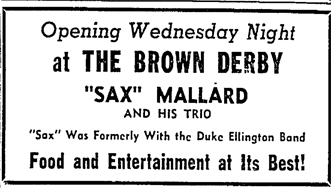
Mallard continued his activity in the clubs during 1948. On January 22, he filed a new contract with the New Harlem Cafe. On February 19, he posted indefinite contracts with the both the Ritz Lounge and Kennedy's Honeydripper. On June 3, Musicians Union Local 208 accepted and filed his contract for 6 nights at the Tampico Lounge. The Tampico management must have liked what they heard, because on June 17, Mallard was able to file an indefinite contract with the club. He then made an excursion out of town, playing the Brown Derby in Waterloo, Iowa during late July. On September 2, Mallard filed an indefinite contract with the Honeydripper Lounge. It was while his band was working the Honeydripper that he got the call for two sessions at Aristocrat, where recording activity was beginning to pick up again.
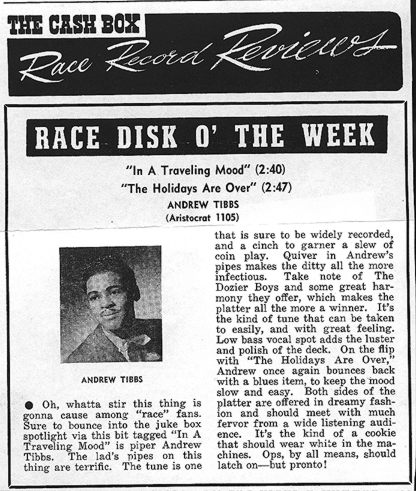
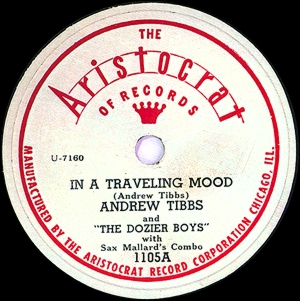
Andrew Tibbs [Melvin Andrew Grayson] (voc); Oett "Sax" Mallard (as, ldr); unidentified (tp); unidentified (as); Eddie "Sugarman" Penigar (ts); prob. Milton Ramey (p); unidentified (b); prob. W. B. "Sleepy" Nelson (d).
Universal Recording, Chicago, October or November 1948
| U7144 | He's Got Her and Gone^ (Tibbs) [AT, ens voc] | Aristocrat 1106-B, Classics 5028 [CD] | |
| U7145 | Telephone Blues | unissued | |
| U-7146 | The Holidays Are Over (Mallard) | Aristocrat 1105B, Classics 5028 [CD] | |
| U7147 | One Sided Affair | unissued |
Our information about Aristocrat 1105 and 1106 derives from copies in the collections of Len Bukowski, Tom Kelly, Daniel Gugolz, and Dr. Robert Stallworth; the unissued items from this session were filled in from Leadbitter, Fancourt and Pelletier (1994). We identified the instrumental lineup by ear. There are no horn solos on "Holidays"; on "He's Got Her," there are breaks for piano (a boogie-woogie artist) and tenor sax (sounds like Sugarman Penigar). See our Aristocrat Discography for the recording date.
According to Jay R. Monroe, there is a "repro" bootleg reissue of Aristocrat 1105 as 45-1105. This is obviously not the genuine article, despite the facsimile labels: Aristocrat issued only 78s.
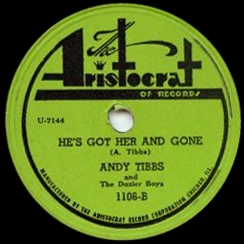
The flips of 1105 and 1106 came from a separate session by Andrew Tibbs with the Dozier Boys and session pianist Herman "Sonny" Blount. The use of sides from two different sessions caused much confusion at Aristocrat. The label to "He's Got Her and Gone" (which features ensemble vocal responses by the band) incorrectly credits the Dozier Boys instead of Sax Mallard!
Classics 5028 [CD] is the first reissue ever of material from this session. Titled Andrew Tibbs 1947-1951, it came out in February 2002.
An advertisement for a Mallard's appearance at the Wonder Bar in April 1949 mentions Milton Ramey on piano and Sleepy Nelson on drums (as was still the custom in low-budget Chicago clubs, there was no bassist). So Ramey and Nelson are likely suspects here.
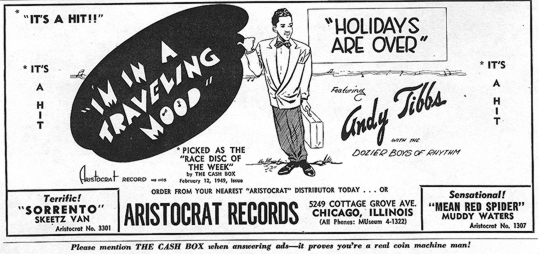
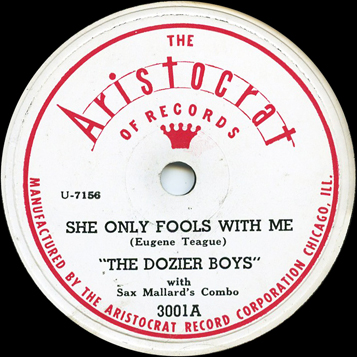
The Dozier Boys: Bill Minor (lead tenor voc); Eugene Teague (tenor voc, g, arr); Cornell Wiley (tenor, baritone voc); Benny Cotton (bass voc); with Sax Mallard's Combo: Oett "Sax" Mallard (ldr); prob. Jimmy Bowman (p); unidentified (b); prob. W. B. "Sleepy" Nelson (d).
Universal Recording, Chicago, late November 1948
| U7156 | She Only Fools with Me (Teague) | Aristocrat 3001A | |
| U7157 | St. Louis Blues (W. C. Handy) | Aristocrat 3001B | |
| U7158 | Invitation to the Blues | unissued | |
| U7159 | Big Time Baby (Mallard) | unissued |
Aristocrat 3001 was a 78-rpm single released in April 1949. Many thanks to Marv Goldberg for reporting that "St. Louis Blues" shows U7157 on the label (not U7156, as claimed in previous sources; not a UB number, as we once surmised) and that the accompaniment was provided by Sax Mallard's Combo. All previous discographies had either bailed on the accompaniment (like Lord) or confused this session with another session during the same month (UB9545-UB9548, at United Broadcasting Studios, with Eugene Wright and the Dukes of Swing.) A purported reissue of U7159 on Classics 5028, Andrew Tibbs 1947-1951 is actually of the same title as remade by Dozier Boys with Eugene Wright, matrix number UB 9545. This was released on Aristocrat 3002.
Ruppli, Leadbitter and Slaven, and more recent sources like Lord's Jazz Discography have given matrix numbers from the Aristocrat company files, but without making clear that "Big Time Baby" was recorded twice.
A listen to Aristocrat 3001 shows that Sax Mallard did not play on either of the issued sides—no horns are heard at all! (The unissued sides could be a very different story, but we have no access to these and wonder whether they are still extant.) The pianist sounds like Jimmy Bowman and Eugene Teague obviously brought his guitar along. On "St. Louis Blues," Bill Minor and Benny Cotton alternate leads; it's Minor all the way on "She Only." By the way, the Doziers actually sing, "She only fooledwith me."
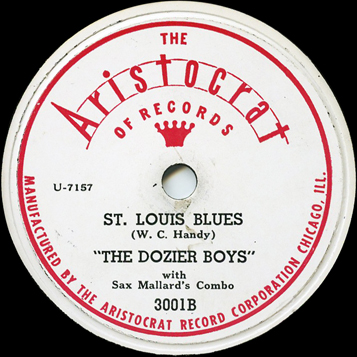
This session took place at Universal Recording, Aristocrat's usual venue. The session was mastered after U7154 and U7155 by Leroy Foster (mastered November 30, 1948) and before U7164 through U7167 by Forest City Joe (mastered December 2, 1948). Allowing for some delay between recording and mastering, a mastering date of December 1 and a recording date in November 1948 seem indicated (see http://campber.people.clemson.edu/aristocrat.html for all recordings on the Arisocrat label).
The Doziers remade "Big Time Baby" in early December on a session with Eugene Wright and the Dukes of Swing. The label of Aristocrat 3002-A indicates that Sax Mallard was the composer of "Big Time Baby."
Sax Mallard continued his residency at the Honeydripper into the new year, posting another indefinite contract with the establishment on January 20, 1949. He moved over to Club Sky Box around the beginning of February; contract accepted and filed on February 3. On February 17, he posted an indefinite contract with Club "Marimba" (usually spelled "Maramba," this West Side establishment specialized in sax-playing frontmen). (By this time, Jimmy Bowman was definitely out of Mallard's combo, for on February 17 Bowman filed his own contract for 2 weeks at the Pershing Lounge.) Probably during the Maramba gig, Mallard appears to have gotten invited to participate in an obscure session for Decca featuring blues shouter Grant Jones and pianist Bob Call.
Grant Jones (voc); Bob Call (p, ldr); unidentified (tp -1); prob. Eddie "Sugarman" Penigar (ts); prob. Oett "Sax" Mallard (as -1, ts -2); unidentified (eg -2); poss. Ransom Knowling (b); unidentified (d).
Chicago, c. February 19, 1949
| 74776 | Talking Baby Blues* [GJ voc] -1 | Coral 65009A, Oldie Blues [Nl] OL 8014, RST 1580 [CD] | |
| 74777 | I Love Your Boogie So | unissued | |
| 74778 | Call's Jump^ -2 | Coral 65009B, Oldie Blues [Nl] OL 8014 | |
| 74779 | Bob Call Blues | unissued |
On February 26, 1949, Billboard announced that "Jimmy Hilliard, Decca's Midwest rep, has pacted Bob Call, boogie pianist[...]" (p. 24). Call was said to have already recorded his first session. Two sides from it appeared on Decca's new lower-priced subsidiary, Coral. Coral 65009 was a 78-rpm single released in May 1949; it was reviewed in Billboard on June 11 (p. 124).
Information about the four tracks comes from Leadbitter and Slaven, Blues Records 1943-1970 Volume 1: A-K, published in 1987. LS indicate that Grant Jones did not sing on "Call's Jump"; they identify only Grant Jones and Bob Call among the personnel.
Both released sides from this session were reissued in 1986 on Oldie Blues OL 8014, Screaming Boogie: Hot Screamin' Saxes from Chicago. "Talking Baby Blues" from this session is included in the Austrian CD, RST 1580, Grant "Mr. Blues" Jones: In the Dark (1949-1958). No further personnel are identified there. However, there are solos on "Talking" by the alto sax, who sounds like Mallard, the tenor sax, who sounds like Penigar, and a boppish trumpeter (not Johnny Morton), as well as Bob's familiar boogie. "Call's Jump" has no alto sax or trumpet; there are solos for the tenor sax and the guitar solo. A listen to the tenor solo on "Call's Jump" suggests that it may be Oett himself; if so, this is his very first tenor sax outing on record. The guitarist is seriously into T-Bone Walker. According to Mike Kredinac, the matrix number in the trailoff area for "Call's Jump" has a suffix: 74778T3A.
The matrix numbers are from the main Decca series and are consistent with a recording date in mid-to-late February 1949. Lionel Hampton cut three numbers in New York City on January 24, 1949 (74727-74729) and four more on January 28 (74730-74733); the next Hampton sessions for Decca were on April 26, 1949 (74853-74855) and May 10 (74897-74899). (The RST set, which aims at chronological order, incorrectly carries this version of "Talking Baby Blues" after a December 1, 1949 session by Jones with the Danny Manners Orchestra.)
Shortly afterward, Sax Mallard also participated in a date with Sugarman Penigar that has garnered zero attention from discographers—really too bad, in light of the talent assembled for the occasion.
Eddie "Sugarman" Penigar (ts, voc); Ellis "Stumpy" Whitlock (tp); Oett M. Mallard (as); prob. Clifford Clark (ts); Wild Bill Davis (p); Robert Lee Wilson (b); Oliver S. Coleman (d); Little Miss Sharecropper [LaVern Baker] (voc).
RCA Victor Studio C, Chicago, February 25, 1949, 9:30 am to 12:30 pm
| D9-VB-383 | Easy Baby (Penigar) [LB voc] | RCA Victor 22-0036A, RCA Victor 50-0020A, Indigo IGOCD 2111 [CD], Classics 5126 [CD] | |
| D9-VB-384 | I Wonder Baby (Penigar) [LB voc] | RCA Victor 22-0016B, Classics 5126 [CD] | |
| D9-VB-385 | Lost and Blue (Penigar) [SP voc] | RCA Victor 22-0036B, RCA Victor 50-0020B | |
| D9-VB-386 | Brand New Baby (Penigar) [SP voc]* | RCA Victor 22-0016A | |
| D9-VB-387 | Strange Melody (L. Melrose) | unissued |
On a 78-rpm release of RCA Victor 22-0016 in the late Otto Flückiger's collection, Sugarman and Little Miss Sharecropper are given vocal credits on the labels; nothing about the rest of the personnel. Many thanks to Art Zimmerman for his research in the BMG Archives; he discovered why the Penigar material had proven refractory to researchers in the past—it had been filed under "S" for "Sugarman"! We are now able to recover the personnel (many of whom Robert Campbell had misidentified by ear) and the other tracks from this session.
"Easy Baby" includes a nice alto sax solo by Mallard with bop touches and a similarly boppish solo by Sugarman. "I Wonder" has a first-rate bop trumpet solo by Whitlock, who is brash, technically accurate, and into Roy as well as Diz. "Brand New" features Penigar's singing (with alto sax obbligato by Mallard), a superficially Garnerish piano solo, and a tenor solo and tag by Penigar. Penigar also sings on the ballad side, "Lost and Blue."
The pianist, identified only as "W. S. Davis" in the company file, is William Strethen Davis, aka Wild Bill. (Check out the accompaniment during "Easy Baby.") During his time on the Chicago scene, Wild Bill had previously worked with the Milt Larkin band (which included Tom Archia), with Claude McLin, and with Buster Bennett (he also appeared on two of Buster's recording sessions). One C. Clark is listed as being on the second tenor sax; we believe this was Clifford Clark, who was occasionally on the Local 208 contract list (for instance, in 1950), and can be seen in a 1953 photo of Al Hibbler backed by a King Kolax group at the Toast of the Town club.
RCA Victor 22-0016 was a 78 rpm single mastered in the first week of April 1949. Billboard listed it on April 9 (p. 35). RCA had just started issuing 45s but 22-0016 was apparently not chosen. RCA Victor 22-0036 was a 78 rpm single released in July (see the RCA Victor ad in Cash Box, July 30, 1949, p. 9; reviewed on September 3, p. 11); it qualified for conjoint release on a 7-inch 45, as 50-0020. This was part of RCA Victor's initial rollout of 45s, pressed on vinyl color-coded for the genre: teal green for the 48- Country and polka series; cerise for the 50- "race" series, and so on.
Indigo IGOCD 2111, Rhythm & Blues All Stars Vol. 3: Jump and Shout, was a various-artists CD released in Britain in 2000. The other Chicago-based tracks were by Tom Archia and Sonny Thompson.
Classics 5126, LaVern Baker 1949-1954, was a CD released in France in 2005. It was the first (and, to our knowledge, the only) reissue of anything from this session. The personnel list for this session incorrectly identifies the pianist as Walter Davis.
This was LaVern Baker's very first recording session. In the company files she appears as "D. L. McMurley." A separate page inserted into the company files in March 1949, before 22-0016 was released, carries instructions to refer to her as "Little Miss Sharecropper." She was born in Chicago on December 11, 1929, was on the bill at the Timber Tap Lounge in September 1946, and began working at the Club DeLisa in November of that year. In February 1947 she was appearing (as "Midget Lavern") in a revue backed by the Fletcher Henderson band with H. Sonne Blount at the piano. By August 1948, when she was working the Brookmont Lounge, she was using Little Miss Sharecropper as her stage name. When the recording opportunity came up, she was 19 and on her second marriage, after an earlier one to Eugene Williams.
The ill-advised stage name (yes, she was diminutive and could take on some of the inflections of Little Miss Cornshucks, who she had had the opportunity to observe up close at the DeLisa) was retained on her second session, four sides done with Red Saunders in December 1950 or January 1951, with some arranging contributions by Sonny Blount. In 1951, her manager got her a contract with OKeh, where, as Bea Baker, she recorded two sessons with Maurice King and his Wolverines (Maurice King was based in Detroit, but the sessions are said to be have been done in New York City. She continued to work in Chicago, as Little Miss Sharecropper, through the end of September 1951, probably moving to Detroit after that. In 1952, as LaVern Baker, she cut four sides with the Todd Rhodes Orchestra for King, but a notice in Cash Box, of an upcoming package tour of the South with Todd Rhodes, Wini Brown, and H-Bomb Ferguson (August 9, 1952, p. 14) used the Sharecropper moniker one last time. Her big break came in 1953, when Atlantic signed her. From 1955 ("Tweedle Dee") through 1963 ("See See Rider") she reeled off chart hits for the company.
In 1969, LaVern Baker took a job at Subic Bay Naval Base in the Philippines, as entertainment director for the Marine Corps Staff NCO club. She remained there till 1988, when by agreement with the Philippine government the base was closed. Returning to the American scene, she recorded and performed regularly from 1988 through the mid-1990s, including a Broadway turn in which she replaced Ruth Brown in the musical Black and Blue. She was inducted into the Rock and Roll Hall of Fame. Suffering severely from diabetes, LaVern Baker died in Queens, New York City on March 10, 1997.
Eddie Penigar had previously made a session for RCA Victor on December 12, 1947 (2 to 5 pm) with Paul King, trumpet; Johnny Board, alto sax; Ruth C. Crowder, piano and vocal; Robert Lee (also known as Rail) Wilson, bass; Earl Leroy Phillips, drums; and George Layne, vocal. One single was released from it; the other two sides have never seen the light of day.
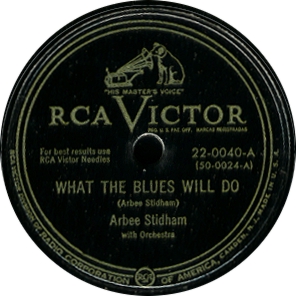
Mallard made a quick return to the studio, along with Stumpy Whitlock and Eddie Penigar from the Penigar session and Bob Call from the Call/Jones session. The tremulously voiced Arbee Stidham, who started recording in 1947, was one of the last Victor blues artists to join the label.
Arbee Stidham (voc) with Ellis "Stumpy" Whitlock (tp); Oett "Sax" Mallard (as); Eddie "Sugarman" Penigar (ts); Bob Call (p); Willie Lacey (eg); Ransom Knowling (b); Lawrence "Judge" Riley (d).
Chicago, March 10, 1949
| D9VB0426-1 | What the Blues Will Do (Stidham) | RCA Victor 22-0040-A, RCA Victor 50-0024-A, Blue Moon BMCD 6038 | |
| D9VB0435-1 | A Heart Full of Misery (Stidham) | RCA Victor 22-0018-B, Blue Moon BMCD 6038 | |
| D9VB0436-1 | Falling Blues (Stidham) | RCA Victor 22-0040-B, RCA Victor 50-0024-B, Blue Moon BMCD 6038 | |
| D9VB0437 | You'll Be Sorry* (Stidham) | RCA Victor 22-0101-B, RCA Victor 50-0101-B, Crown Prince [Swe] IG-404, Blue Moon BMCD 6038 | |
| D9VB0438 | I've Got So Many Worries (Stidham) | RCA Victor 22-0018-A, Crown Prince [Swe] IG-404, Blue Moon BMCD 6038 |
Our session information comes from LS 1968, except for the reference to the Crown Prince LP, which was released in Sweden in 1982, under the title My Heart Belongs to You. Blue Moon BMCD 6038 is the first Stidham CD collection, issued in 2004; the title is The Complete Recordings Volume 1 1947-1951. Unless 0426 was a remake of a rejected item from an earlier session, it was presumably made at a slightly earlier date than the other items.
The 22 series releases were 78s, splitting off from the 20 series when RCA began issuing 45s. The 50 series releases were 45s, in a series that began at the end of March 1949 and was closed at the end of 1950, when RCA Victor dropped most of its vinyl color-coding. The company was initially selective about 45 rpm releases, but the rationale for putting 22-0040 out on 45 and not doing the same for 22-0018 eludes us. RCA Victor 22-0018 was reviwed in Billboard on May 14, 1949 (p. 125). RCA Victor 22-0040 and 50-0024 were announced as new releases in August 1949 (Cash Box, August 27, 1949, p. 7; Billboard, August 20, 1949, p. 23). 22-0101 and its companion 50-0101 came out in September 1950 (Billboard, September 25, 1950, p. 23).
Mallard solos on "You'll Be Sorry." Sugarman Penigar is the featured soloist on "I've Got So Many Worries" and "What the Blues Will Do." Willie Lacey is heard from "A Heart Full of Misery" and "Falling Blues" has a trumpet obbligato and a piano solo. Thanks to Daniel Gugolz for tape dubs of the unreissued material.
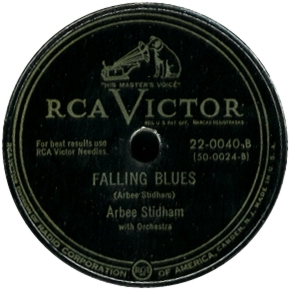
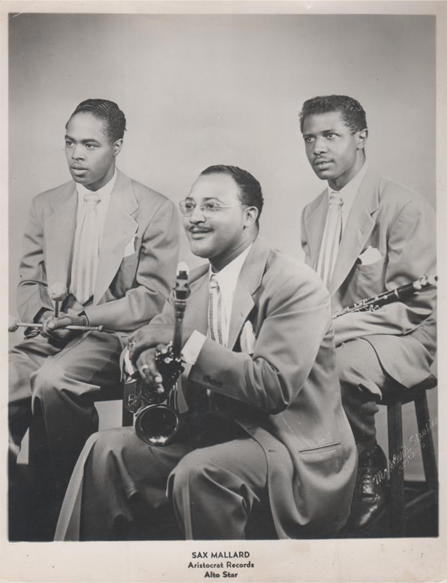
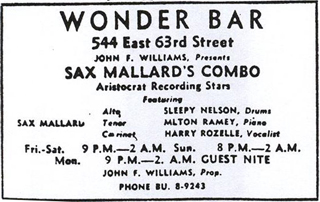
There is a Chicago Defender ad for Sax Mallard's Combo in the April 23, 1949 issue; all three of his axes duly noted ("Alto, Tenor, Clarinet"), he was working weekends at the Wonder Bar, 544 East 63rd Street, with Milton Ramey (piano), Sleepy Nelson (drums), and Harry Rozelle (vocals). This is our first definite indication that Sax Mallard was playing tenor. He'd posted a 2-month contract with the Wonder Bar on April 21. One of the two known Sax Mallard publicity photos distributed by Aristocrat (the other, of Mallard with his three instruments, is unfortunately unavailable to us) shows a trio including Mallard and Sleepy Nelson, which may be the same one that played the Wonder Bar (we don't know what Milton Ramey looked like).
On June 2, Mallard signed a contract for 3 days at The Coliseum (for some kind of special event); on July 7, his renewal contract with the Wonder Bar was posted. While still at the Wonder Bar, Mallard got his final studio call from Lester Melrose. He worked with Call and Penigar again; on this occasion Calvin Ladnier, who had come up to Chicago from Texas in August 1942 with the Milt Larkin band, took over from Stumpy Whitlock on trumpet.
Arbee Stidham (voc) with Calvin Ladnier (tp); Oett "Sax" Mallard (as); Eddie "Sugarman" Penigar (ts); Bob Call (p); Willie Lacey (eg); Ransom Knowling (b); Lawrence "Judge" Riley (d).
Chicago, July 19, 1949
| D9VB1135 | So Tired of Dreaming (Stidham) | RCA Victor 22-0101-A, RCA Victor 50-0101-A, Crown Prince [Swe] IG-404, Blue Moon BMCD 6038 | |
| D9VB1136 | I Send My Regrets* (Stidham) | RCA Victor 22-0053-B, RCA Victor 50-0037-B, Blue Moon BMCD 6038 | |
| D9VB1137 | Marcia | unissued | |
| D9VB1138 | Barbeque Lounge (Stidham) | RCA Victor 22-0053-A, RCA Victor 50-0037-A, Crown Prince [Swe] IG-404, Blue Moon BMCD 6038 |
Our session information comes from LS 1968. However, the spelling on the label to 50-0037-A is "Barbeque," not "Barbecue," and the title on the flip is "I Send My Regrets," not "Send My Regrets." The Crown Prince LP was released in 1982. Blue Moon BMCD 6038 is the first Stidham CD collection, issued in Spain in 2004; the title is The Complete Recordings Volume 1 1947-1951.
RCA Victor 22-0053 (50-0037 on 45) was released in November 1949 (announced in an RCA ad, Billboard, November 19, 1949, p. 23; reviewed in Cash Box on December 3, p. 16). Although "Barbecue" is the spelling in the RCA Victor ad, "Barbeque" is what's on the label. 22- and 50-0101 (78s and 45s now shared their four final digits) came out in September 1950 (Billboard, September 25, 1950, p. 23). Sugarman Penigar is the featured soloist on "So Tired of Dreaming" and "Barbeque Lounge." Sax Mallard has an introduction and a break on "I Send My Regrets"; there is also a muted trumpet solo for Calvin Ladner.
Arbee Stidham made one final session for RCA Victor on March 21, 1950; the company had begun winding down its "race record" operations, and his contract was not renewed. The saxophonists on this last session were Nat Jones (alto) and Cozy Eggleston (tenor). Stidham resurfaced on Checker in 1952 and 1953. Around this same time, Stidham took up the guitar. After another period away from the studios, Stidham recorded for Abco in 1956 and States in 1957. During the early years of the blues revival, he cut LPs for Bluesville and Folkways (1960 and 1961).
Sax Mallard left the Wonder Bar in late October 1949; on November 3, he posted an indefinite contract with the Grove Circle Lounge. On April 20, 1950, Musicians Union Local 208 accepted and filed Sax Mallard's indefinite contract with Jimmy's Palm Garden.
The commercial dominance of R&B, as it began to move toward rock and roll, put saxophonists of the Hodges school in a bind. Though Hodges himself played jump blues successfully, the style was perceived by the R&B audience as overly sentimental and not tough enough. Tab Smith, who enjoyed a successful string of recordings for United in the 1950s, did not alter his basic sound much, but simplified his figuration and adopted more emphatic rhythms (he also took up the tenor sax, and by 1953 was showing a marked bebop influence on that instrument, not heard in his alto stylings). Porter Kilbert would reduce his vibrato and blunt his alto sax sound; he also took up the tenor sax (and assimilated bebop licks) in the 1950s. Mallard did not change his approach to the alto much, but he played more and more tenor, initially with mixed results. (Some of his 1951-1952 recordings on the bigger horn are unintentionally maudlin.)
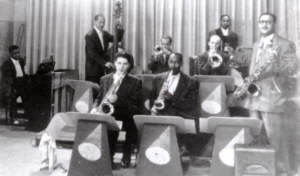
In late April 1950, disc jockey Al Benson, who had already done some freelance recording, sponsored dances and jam sessions, and even fronted for a short-lived record label (see our Old Swing-Master page), got an opportunity to host a weekly TV show on WBKB in Chicago. For the show, aired on Saturday nights from 9:30 to 10:30, he put together a band with some of the best young jazz musicians in town, both black and white. The Chicago Defender soon took note in Al Monroe's column "Swinging the News":
FIRST MAJOR television show to be run by a Negro goes to Al Benson, local radio figure who will appear on WBKB-TV with 'flesh' talent. BERNADINE Carickett, local fashion show commentator, will aid Benson put the show over. (May 6, 1950, p. 13; odd capitalizing and lumpy syntax as per the original)
When Al Benson made a personal appearance at the grand opening of a new supermarket on 95th Street, Carickett, duly billed as a "Television Star," was there alongside him (Defender, June 10, 1950, p. 28).
The White musicians who were recruited to play the show—Hotsy Katz, Cy Touff, and Kenny Mann —were members of the Jay Burkhart band. This bop big band, much admired by the scribes in Down Beat, was bursting with talent but unfortunately never recorded. Cornell Wiley was a member of the Dozier Boys, who not so coincidentally were being heavily publicized by Benson's associate McKie Fitzhugh during this period. Sleepy Nelson was Sax Mallard's drummer, and Goon Gardner was working regularly during this period, sometimes as a leader.
Sax Mallard was the leader (however, the initial contract for the show was in Cornell Wiley's name; with a term of 4 weeks, it was accepted and filed by Local 208 on May 4, 1950). Cy Touff, who played valve trombone in the band, told the late Charles Walton that "Stuff Smith was one of the performers, and Lurlean Hunter was a vocalist. That work at WBKB in the State Lake Building only lasted a few months."
Cash Box mentioned the show on May 13 (p. 11) and Jack Mabley reviewed the June 3 event (Billboard, June 17, p. 10). Mabley liked the guest artist (pianist George Shearing) but found the rest of the talent variable and often flat; he also complained about the frequency of commercials.
The show was still running in early July; on July 6 and 20, 1950, the Board of Musicians Union Local 208 briefly discussed a complaint by bassist Johnny Pate that stemmed from a guest appearance on the show by the Henry "Red" Allen Orchestra on April 29. Also at the July 6 Board meeting, Claude Jones brought a complaint against Stuff Smith, who had fired Jones from a gig at the Blue Note after Jones informed Smith that he was scheduled to appear on Benson's TV show on Saturday night. (This was presumably after Stuff got into a fistfight with Al Benson on the air, abruptly ending his string of guest appearances on the show.)
Part of the Al Benson TV show band got to record with Andrew Tibbs, on the singer's last session for the Chess brothers.
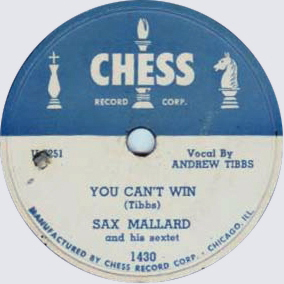
Andrew Tibbs (voc); poss. Hotsy Katz (tp); Oett "Sax" Mallard (cl -1; as -2; ts -3, arr); Laurdine "Pat" Patrick (bars); prob. Claude Jones (p); prob. Cornell Wiley (b); prob. Sleepy Nelson (d).
Universal Recording, Chicago, between July 10 and 13, 1950
| U-7251 | You Can't Win (Tibbs) -1, 2 | Chess 1430, Classics 5028 [CD] | |
| U-7252 | Aching Heart (Tibbs) -1, 3 | Chess 1430, Classics 5028 [CD] | |
| U-7253 | She's My Baby | unissued | |
| U-7254 | Crying the Blues | — | |
| U-7255 | Boogie | — | |
| U-7256 | Blues in Hawaii | — |
Our basic information from is drawn from Leadbitter, Fancourt, and Pelletier (1994). In this case, LFP credit Mallard with playing tenor sax only. Mallard plays clarinet in the intro and coda of "Aching Heart" and switches to tenor for the body of the piece. On "You Can't Win" he plays licks behind Tibbs on the clarinet and switches to alto for the ensembles. There are carefully worked out arrangements on both sides, obviously Mallard's. We have not been able to hear the four sides that are still unissued. Unfortunately, on account of the fire at Universal, they are probably lost.
The other identifications are based on the personnel of Mallard's TV show band, which was probably still working when this session was made. However, Pat Patrick's diary, now included in the Pat Patrick collection at Berklee College of Music, Boston, Massachusetts, indicates that this was his very first recording session. Patrick, who was just 20 years old at the time, may have been called on at the last minute when Goon Gardner wasn't available.
LFP give the date as 1950, but we can do better. Chess 1430 was a single released in August of 1950. U-7251 follows the Gene Ammons session (U7247-U7250) of May 2, 1950, and U-7256 precedes the Claude McLin sides (U7259 and 7260). We have a firm date of July 21, 1950 for the Claude McLin session because he failed to pay "Local tax" to the Musicians Union on it and the matter was discussed by the Local 208 Board on August 3.
Marv Goldberg recently discovered an item about the National Association of Music Manufacturers convention, which ran in Chicago from July 10 through 13, 1950. Billboard's wrapup ("NAMM Convention Highlights," July 22, 1950, p. 39) included the following:
Randy Wood, big mail order retailer of Gallatin, Tenn., and owner of Dot label, supervised the latest Andrew Tibbs session for Chess during the convention. Wood promptly ordered 1,000 of the diskings.
It appears that the Chess brothers had suspended new recording after May 2, 1950, in preparation for the name change from Aristocrat to Chess, which was announced on June 3, and that recording sessions did not resume for several weeks.
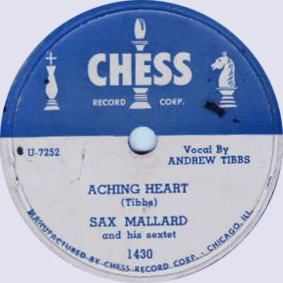
Andrew Tibbs' first two sessions for Aristocrat (released on 1101-1104) are covered in the Tom Archia Discography. He made two more sessions for the label (one with the Dozier Boys was used on one side each of 1105 and 1106; the other, with guitarist Leo Blevins and his trio, was released on Aristocrat 1107) can be found in the Aristocrat Discography. All of Andrew Tibbs' released sides for Aristocrat and Chess are finally brought together Classics 5028, a CD released in February 2002 under the title Andrew Tibbs 1947-1951.
Not long after this session, Andrew Tibbs went to Lexington, Kentucky, to be treated for heroin addiction. He would never record for the Chess operation again, though he did cut sides for Peacock (1951), Savoy (1951—never issued), Mercury (1951-1952; see below, as these also involved Sax Mallard), Atco (1956, with his older brother Kenneth), and m-pac! (1965). By the mid-1960s he had long since moved into a day job in the computer industry, where he remained for the rest of his life, though he still sang at parties and occasional engagements. Andrew Tibbs died in 1992.
The Benson TV show seems to have wound up by the end of July. On October 7, 1950, the Chicago Defender advertised the Sax Mallard Combo at the Circle Inn, 63rd and Cottage Grove. The gig started around the end of July; Sax Mallard's "indefinite" contract with the Circle Inn was accepted and filed by Local 208 on August 3.
In the new year, Mallard moved his combo to the Blue Heaven Lounge (indefinite contract accepted and filed by Local 208 on January 18, 1951). Mallard's tenor sound was quite respectable on the July 1950 session, though his tone would develop more body over time. And without the heavy application of reverb on his Chess sides (after the model of Claude McLin's "Mona Lisa") he would have sounded good. But as recorded, his tenor sax sound on the next sessions is distinctly mawkish, and we have reason to regret the production decisions made at the time.
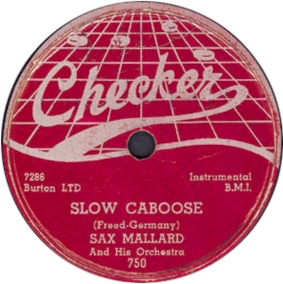
Oett "Sax" Mallard (ts); unidentified (tp); prob. Jimmy Bowman (p); prob. Ernest "Big" Crawford (b); Osie Johnson (d, voc).
Universal Recording, Chicago, January 8, 1951
| U7284 | Turn Me Loose | unissued | |
| U7285 | Angels Sing | unissued | |
| 7286 | Slow Caboose* ("Freed-Germany") | Checker 750, Chess MCA 380-596 [CD] | |
| 7287-C | Darling Let's Give Love a Chance* (R. Brent) [OJ voc] | Checker 750 |
For one reason or another, the Chess brothers were in no hurry to release anything from this session, which was held more than a year, for the launch of their new Checker subsidiary
We got our basic information on this session from Leadbitter, Fancourt, and Pelletier 1994, who do not identify Mallard as the tenor saxophonist. The vocalist is a baritone of the "sweet music" variety; LFP identify him as Osie Johnson, the drummer. Peculiarly, Lord's Jazz Discography, which omits all Sax Mallard-led sessions, does carry "Turn Me Loose" and "Angels Sing" under Osie Johnson's name ("others unidentified"). The misattribution originated with Ruppli's Chess discography, which listed U7284 and 7285 as though Osie Johnson, and not Sax Mallard, were the leader.
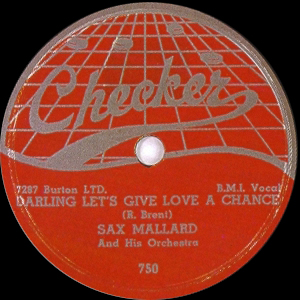
Heavy reverb is applied to the sax solos on the two released sides, as was the custom at the time; the bass playing sounds like Big Crawford's. The cocktaily piano on "Slow" and "Darling" (with occasional block chords) suggests Jimmy Bowman. The trumpet player is virtually inaudible on "Slow Caboose."
Checker 750 was the initial release on the Chess brothers' new subsidiary; it was advertised in Cash Box on April 5, 1952, and reviewed in Billboard on April 26, 1952 (p. 27). The first CD reissue of any Sax Mallard recording for Aristocrat/Chess took place in 1999, when "Slow Caboose" was included in Chess MCA 380-596, a 15-CD extravaganza titled The Chess Story 1947-1975.
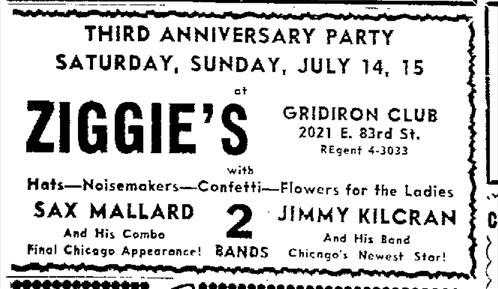
After a long stint at the Blue Heaven, Mallard's combo took up at Ziggie's Gridiron Club, at 2021 East 83rd Street (indefinite contract accepted and filed by Local 208 on May 3, 1951; an extension was posted on June 7). The combo remained at Ziggie's through July 15. Shortly after that, the Mallard combo went on tour—at least, Ziggie's was anticipating one, declaring July 14 and 15 to be Mallard's "Final Chicago Appearance." By August Tommy "Madman" Jones had definitely taken over the gig. While finishing up at Ziggie's Mallard was invited to participate in the inaugural session for the brand-new United label.
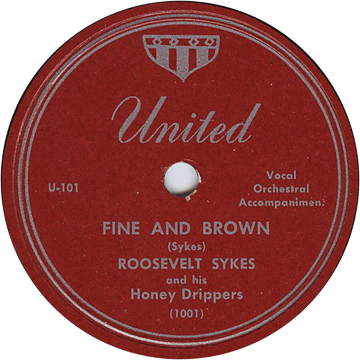
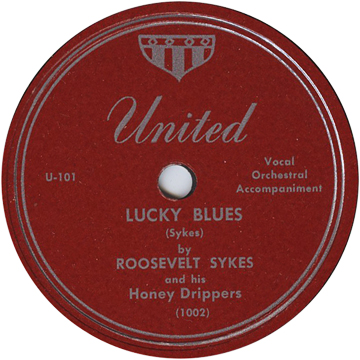
Roosevelt Sykes (voc, p) with Oett "Sax" Mallard (as); Robert "Little Sax" Crowder (ts); Robert McCollum [aka Robert Nighthawk] (eg); Ransom Knowling (b); Armand "Jump" Jackson (d).
Universal Recording, Chicago, July 12, 1951
| U1001-1 | Fine and Brown (Sykes)* | Delmark DE-642 [CD], Delmark DE-542 [CD], Delmark DD-775 | |
| U1001-2 | Fine and Brown (Sykes)* | United 101, Vogue [Fr] V2389 [?], Vogue [Fr] V.3297, P-Vine Special [J] PLP-9039, Delmark DL 642, Document BDCD 6050, Delmark DE-642 [CD] | |
| U1002-1 | Lucky Blues (Sykes) | United 101, P-Vine Special [J] PLP-9039, Delmark DL 642, Document BDCD 6050, Delmark DE-642 [CD] | |
| U1003-5 | Raining in My Heart (Simpkins-Sykes) | United 120, P-Vine Special [J] PLP-9039, Delmark DL 642, Document BDCD 6050, Delmark DE-642 [CD] | |
| U1004-2 | Heavy Heart (Simpkins)* | United 120, P-Vine Special [J] PLP-9039, Delmark DL 642, Document BDCD 6050, Delmark DE-642 [CD] |
United 101 was a 78 and 45-rpm single, released in August of 1951. United 120 was a single released in May 1952. Vogue V2389 was a 45-rpm single released in France in the early 1950s; thanks to Mario Schneeberger for alerting us to this issue. Vogue 3297 was released on 78 rpm, possibly also on 45; it was brought to our attention by Jean-Marc Pezet.
P-Vine Special PLP-9039 was released in Japan in 1982 under the title Roosevelt Sykes & The Honeydrippers: The Joint Is Jumping; Lord mentions it but then leaves off the Delmark LP. Delmark DL 642, a Roosevelt Sykes LP titled Raining in My Heart, was released in 1987. The remainder of the P-Vine and Delmark LPs consisted of a session from August 21, 1952, with Remo Biondi (vln), John "Schoolboy" Porter (guitar), Knowling, and Jackson, and another from March 19, 1953 with J. T. Brown (ts), unidentified (eg), Ernest "Big" Crawford (b), and Fred Below (d). In 2000, an expanded CD edition of Raining in My Heart was released as Delmark DE-642. Among the tracks added was U1001-1, the alternate take of "Fine and Brown." The alternate "Fine and Brown" was also included in the 2002 CD compilation, Honkers and Bar Walkers Volume 3 on Delmark DE-542, and again in the 2004 compilation, The United Records Story on Delmark DD-775.
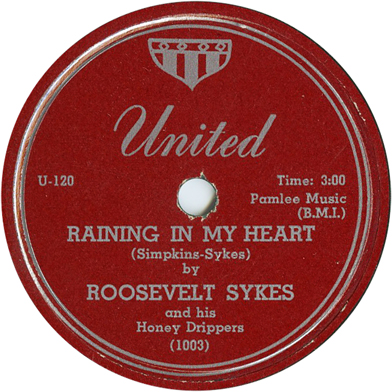
The recording date comes from LS 1968 and LFP 1994, who put Crowder and Mallard on undifferentiated "saxes" and identify Robert Nighthawk as the guitarist and Big Crawford as the bassist. Ransom Knowling described this session to Bob Koester (see Koester's United/States discography).
United recorded Roosevelt Sykes, Robert Nighthawk, and J. T. Brown during a single "gang" session on this date, in which each worked with his own group. However, Sykes probably played on the Nighhawk sides, and, while not handling the keyboard on the J. T. Brown numbers, can be heard whooping and shouting encouragement. The Sykes session is also included in Roosevelt Sykes Volume 10 (1951-1957), Document BDCD-6050, which was released in 1994.
John "Schoolboy" Porter, who headlined on tenor sax for Chance Records from 1950 to 1952, also played guitar on the Roosevelt Sykes session of August 21, 1952 (Sykes can be heard shouting "Schoolboy!" after a guitar solo). While we have previously identified the guitarist as Porter on this page, Robert Nighthawk (minus slide) is a safer choice. Nighthawk is the only guitarist we know was present that day! Besides, other recorded evidence shows that he was able to play the accompaniments heard here.
Mallard plays alto throughout this session, with a somewhat grittier tone than on his previous recordings.
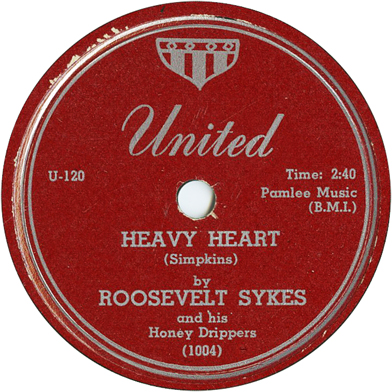
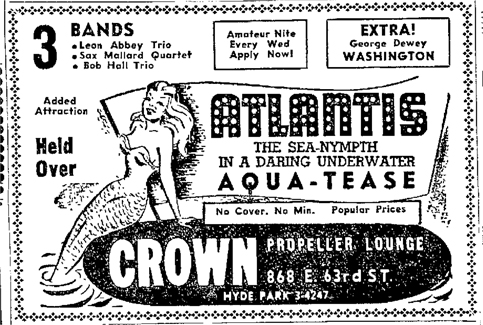
After his tour (we don't know where he went), Mallard became a regular at Norm and Mitzi Schlossberg's Crown Propeller Lounge, 868 East 63rd Street. The Crown Propeller had been around since 1941 or 1942, and the Schlossbergs also owned Crown Liquors next door. On August 3, 1951, the Propeller, which had previously featured a lot of accordion trios, relaunched itself by hiring black entertainers and advertising in the Defender. Sax Mallard's band was first mentioned in an advertisement for the club on September 1, 1951. On September 6 an ad mentioning Mallard also appeared in a local advertising sheet called the Southeast Economist, which appealed more to the club's former clientele; there would be no more of these. On September 29, 1951, the Defender advertised "Sax Mallard Quartette," along with the Leon Abbey Trio and the Ding Bell Trio (Mallard's first contract with the Crown Propeller, for 2 weeks with an option, had been posted on September 6). Mallard was also responsible for the early dance on Sunday, starting at 5 P.M. The January 5, 1952 Defender advert had "Sax Mallard and his Band" along with singer Donna Hightower, the Revel Aires, "Father" Howard, and Eddie Penigar, "Hot & Torrid at the Piano." The biggest draw, as would nearly always be the case at the Crown Propeller through the end of 1954, was "Atlantis, Exotic Aqua Queen."
Here's what Herb Kent, the Kool Gent, had to say about Atlantis. Kent was one of the top Black DJs in Chicago during the 1950s; for a time he promoted dances at the Pershing Ballroom, 64th and Cottage Grove. His reminiscences of 63rd Street in its heyday appeared in his "Tales from the Kool School" column in N'Digo (October 8-14, 1998):
During its height, that whole area up and down 63rd street was littered with swank nightclubs of every conceivable kind. There was the fabulous Crown Propeller, which had a huge tank of water surrounded by seats for spectators.
Every few minutes, a well endowed female would swim in the tank and turn some very seductive underwater flips. White male customers bombed out of their skulls would look at these brown honeys gyrating in the water with great amazement and supplication.
Herb Kent's story makes for great copy. But Vernel Fournier recalled that Atlantis was white.
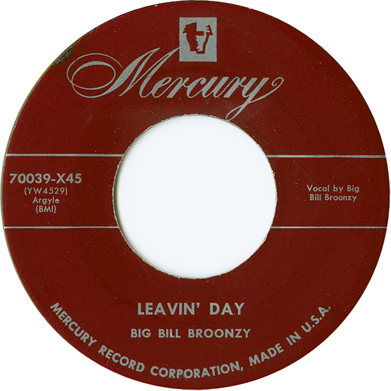
Although Mercury had quit recording Chicago blues artists in 1949, there was a brief revival in 1951-1952 when the company brought Bob Shad in as a recording director. Among the veteran blues artists that Mercury recorded in Chicago were Sunnyland Slim, Memphis Slim, and Big Bill Broonzy. Sax Mallard was was hired to back Big Bill, then got two sessions of his own with Andrew Tibbs as the featured vocalist.
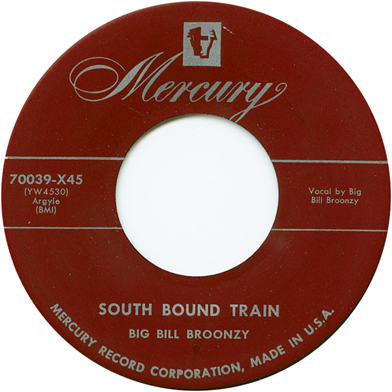
Big Bill Broonzy (voc, g) with Oett "Sax" Mallard (ts -1; as -2); Bill Casimir (ts); Bob Call (p); Ransom Knowling (b); Lawrence "Judge" Riley (d).
Mercury Studios, Chicago, November 9, 1951
| YBF 4529 | Leavin' Day (Broonzy)* -1^ | Mercury 70039, EmArcy MG 36137, Mercury 314 528 292-2 [CD] | |
| YBF 4530 | South Bound Train (Broonzy) -1^ | Mercury 70039, EmArcy MG 20822, EmArcy MG 36137, Mercury 314 528 292-2 [CD] | |
| YBF 4531 | Tomorrow (Broonzy)* -2 | Mercury 71352, EmArcy MG 20822, EmArcy MG 36137, Mercury 314 528 292-2 [CD] | |
| YBF 4532 | You Changed (Broonzy) -2 | M-MEP 49, EmArcy MG 36137, Mercury 314 528 292-2 [CD] |
Our session information is from Leadbitter and Slaven 1968. The 8-CD box titled Mercury Blues 'n Rhythm Story 1945-1955 (released 1996) contains the entire session and the information about the first release of "You Changed." At least on later 78-rpm pressings as well as 45-rpm pressings, the labels to Mercury 70039 referred to the artist simply as "Big Bill Broonzy" (our thanks to Han Enderman for bringing this to our attention). Labels on the 45-rpm pressing of Mercury 71352, which was released 5 or 6 years after the session, also read "Big Bill Broonzy."
It is not clear what happened to matrix YBF 4533 (which appeared on the label to Mallard's instrumental "The Bunny Hop," but not in the company files). In any event, tracks under Mallard's name seem to have followed immediately after these.
The Mercury box credits Sax Mallard with alto sax only. In fact, he plays tenor sax on the first two tracks, and alto on the third and fourth. Mallard appears to be responsible for the tenor solo on "Leavin' Day" while Bill Casimir solos on "South Bound Train" and "You Changed." The alto sax solo on "Tomorrow" is the grittiest one that Mallard ever recorded on that instrument. Mercury identifies the pianist as Bob Call or Memphis Slim, but there is little resemblance between the piano playing here and what can be heard on the sessions that Memphis Slim cut for Mercury around this time.
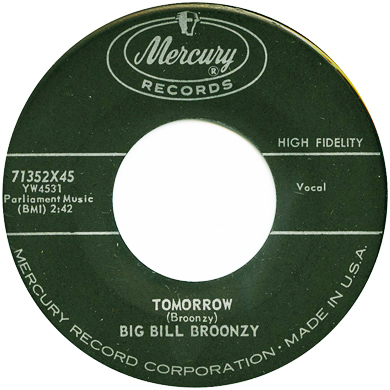
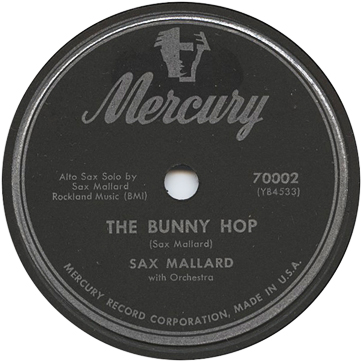
Oett "Sax" Mallard (as); Bill Casimir (ts); Bob Call (p); Ransom Knowling (b); Lawrence "Judge" Riley (d); Andrew Tibbs (voc).
Mercury Studios, Chicago, November 9, 1951
| YBF 4534 | Everything I Have Is Yours [AT voc] | unissued | |
| YBF 4535-5 (YB 4533 on label) |
The Bunny Hop* (Mallard) | Mercury 70002 | |
| YBF 4536 | I Ain't Got Nobody [AT voc] | unissued | |
| YBF 4537 | My Final Affair [AT voc] | unissued |
Thanks to Les Fancourt for a much improved listing of these items. "The Bunny Hop" was previously listed in discographies as YBF 4553, which obscured its connection with the preceding session, and the unissued titles were left out of previous versions of this discography. Although the company files give the matrix number for "The Bunny Hop" as YBF 4535, the labels to Mercury 70002 read YB 4533. Han Enderman points out that there were two different 78-rpm labels for Mercury 70002. Both labels were in what was then the standard Mercury silver on black, but the earlier version shows the matrix number to the left of the center hole and the Alto Sax Solo credit to the right; on the later verson the matrix number appears on the right, the Alto Sax Solo credit goes to the left, and the "O" in "Orchestra" is capitalized.
On "The Bunny Hop" the label correctly notes "Alto Sax Solo by Sax Mallard," while Bill Casimir accompanies on tenor. Possible tenor playing (or overdubbed sax lines) by Mallard can't be assessed without hearing the other sides. The barwalking approach to "Bunny Hop" makes it more successful than Mallard's other recordings as a leader from this period. The only drawback sonically is that Mallard's alto is way in front and Casimir's tenor sax is unduly recessed.
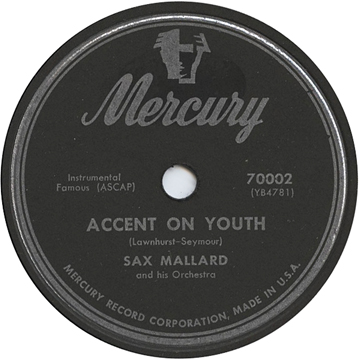
Andrew Tibbs (voc -1); Sax Mallard (as-2; ts -1, 2); Roosevelt "The Honeydripper" Sykes (p); Ernest "Big" Crawford (b); Armand "Jump" Jackson (d).
Mercury Studios, Chicago, January 9, 1952
| YBF 4781-2 (YB4781 on label) |
Accent on Youth (Lawnhurst-Seymour)* -2 | Mercury 70002 | |
| YBF 4782? | Rough Sailing | unissued | |
| YBF 4783 | Leap Year Blues* (Mallard) -1 | Mercury 314 528 292-2 [CD] | |
| YBF 4784? | Sax a la Mode | unissued |
Information on 4783 (YBF or YB prefix presumably omitted) comes from the booklet to Mercury 314 528 292-2, an 8-CD box called The Mercury Blues 'n' Rhythm Story 1945-1955, released in 1996. Mercury's matrix number series appears to have gotten cavalier treatment from discographers. Otto Flückiger noted down YBF 4781-2 for "Accent." The Mercury box has 4783 with no suffix for "Leap Year Blues." Leadbitter, Fancourt, and Pelletier confirm the personnel (though they still have Mallard on alto sax only), and add the two still-unissued items, but they render "Accent" as YB 7481-2 (while the record label is content with YB4781) and "Leap Year" as YB 7482. They give YB 7483 for "Rough" and YB 7484 for "Sax."
Mallard is responsible for the tenor and the alto on "Accent," the latter through overdubbing. Not only do both saxophonists sound like Mallard, the overdubbing creates an impossible sonic perspective: the alto sax is louder and farther to the front, but the two instruments seem to be living in different spaces— except when they threaten to pass through each other. It's too bad, as the tune is a decent ballad and Mallard's interpretation is tasteful. Contrary to what is stated in the Mercury box, Mallard plays tenor sax on "Leap Year Blues," where he is prominent throughout. (This track also has obtrusive reverb, even on Andrew Tibbs' vocals. Tibbs sounds noticeably older than he did on his Aristocrat and Chess recordings, but is in good form on this side. We hope his other efforts for Mercury will eventually see release.) It is of course not known what Mallard plays on the unissued tracks.
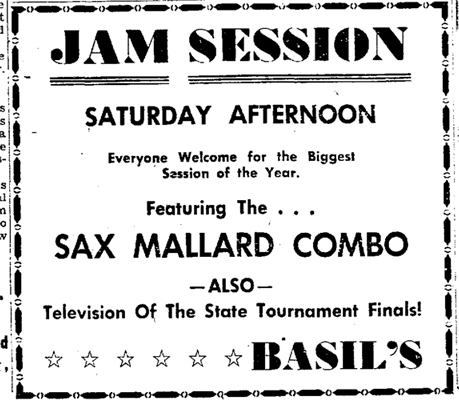
The first Crown Propeller run seems to have ended in February 1952. In March, Mallard and combo were spending some time on the road in Indiana. Two Saturdays in a row, they were featured at Basil's in Kokomo. In April, Mallard was playing one of the top venues in Cleveland, the Ebony Lounge (we are not aware of other gigs in that city); his engagement ended on April 20 (Cleveland Call and Post, April 19, 1952, p. 5D). By Memorial Day, Mallard and his combo were back at the Crown Propeller.
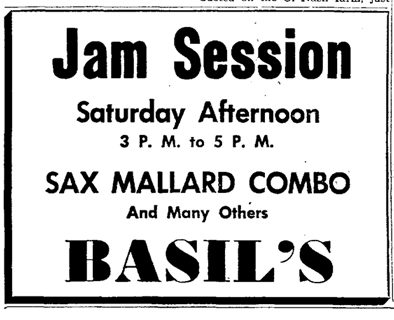
While Mallard was on the road, Mercury quit recording blues in Chicago. Consequently, his next session was back at Checker .
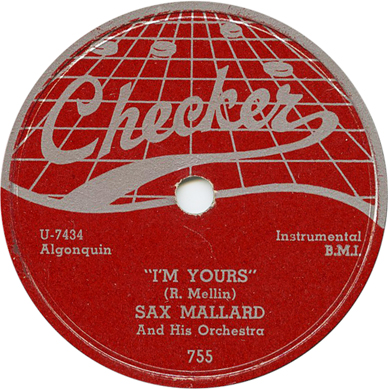
Sax Mallard (ts, as); unidentified (tp); unidentified (ts, bars); William "Lefty" Bates (eg); prob. Jimmy Bowman (p); prob. LeRoy Jackson (b); prob. Sleepy Nelson (d).
Universal Recording, Chicago, May 12, 1952
| U-7434 | I'm Yours* (Mellin) | Checker 755 | |
| U-7435 | Teen Town Strut!* (Mallard) | Checker 755 | |
| U7436 | Left Alone | unissued |
Our session information initially came from Leadbitter, Fancourt, and Pelletier. They have Mallard on alto sax only and do not give a further breakdown of the saxophones played in the background. This discography previously interpolated May 1952 as the recording date. Checker 755 was a 78 and 45-rpm single advertised in Billboard in June 1952 and probably released in July.
The label information is from a copy of Checker 755 in Robert Campbell's collection. On "I'm Yours," Mallard is responsible for the solo tenor sax (much enhanced with echo); he is also responsible for an overdubbed second tenor line; and the alto sax is also Mallard, overdubbed. The sonic perspective is decidedly weird, with the alto sax appearing to dive in from somewhere else entirely. Riffing the background, in real time, are a trumpet and a tenor sax played by others. On "Teen Town Strut!" this other saxophonist switches to baritone. The heavy echo makes the drummer sound like he's whacking on a log using a large branch wrapped in felt.
Despite the foolery on "I'm Yours," it's a decent ballad and Mallard's solo work on the tenor sax is affecting. "Teen Town Strut!" is a piece of opportunistic titling. The number is actually a medium-tempo blues with a whomping backbeat; as any old Ellingtonian would have known, it's a close paraphrase of "Things Ain't What They Used to Be." The much reduced incidence of studio foolery makes it easier to listen to.
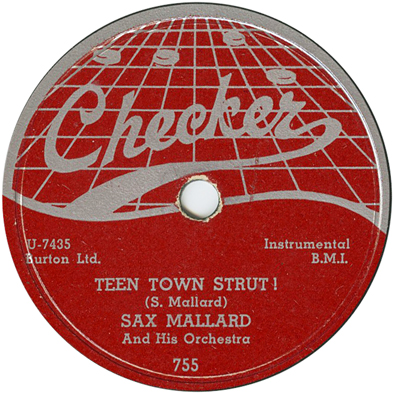
It is unfortunate that Sax Mallard's Checker sessions (and the instrumentals from his second Mercury session) gave him him inferior production, because he played really well on most of them. Ill-managed overdubbing and overuse of studio echo were the culprits. On his next few sessions, Mallard played tenor with a consistently gritty sound, including a screech that can be heard on "Tears in My Eyes" and "Let It Roll" on the Mitzi Mars date for Checker. He was helped by the very modest use of studio echo on the Chance session and its complete absence on Mitzi Mars' outing.
On June 5, 1952, Mallard posted a new contract for 4 weeks (with options) at the Crown Propeller. By this time, the all-star lineup had thinned out; for instance King Kolax had moved off to Ziggie's Gridiron Lounge.
In the Fall of 1952, an opportunity opened up at the Chance label when its original house band leader, Schoolboy Porter, left town. Sax Mallard was a charter member of the new studio band that Al Smith put together to accompany singers, starting with a session by blues vocalist Big Bertha Henderson, whom Smith's combo had been backing at Club Evergreen. However, as Smith got more regular studio work and his recording personnel settled down, James "Red" Holloway quickly displaced Mallard as his tenor saxophonist of choice.
Big Bertha Henderson (voc) with Al Smith Orch.: James "Red" Holloway (ts); Oett "Sax" Mallard (ts); Billy Wallace (p); William "Lefty" Bates (eg); Al Smith (b); Leon Hooper (d).
Universal Recording, Chicago, late October 1952
| U2241 | Rock, Daddy, Rock* (Smith) [BBH, ens voc] | Chance 1143, RST 91577 [CD] |
|
| U2242 | Tears in My Eyes* (Jones-Smith) [BBH voc] | Chance 1143, RST 91577 [CD] |
Lord, in his Jazz Discography,assumes (incorrectly) that this is the same Bertha Henderson who cut three sessions in St. Louis and Chicago between 1925 and 1928. This Bertha Henderson came from New Orleans and also recorded for Savoy in the 1950s; otherwise, little is known about her. Lord gives no place or date, but those aren't terribly hard to figure out. Chance 1143 was a single released in September 1953. RST 91577, Chicago Jump Bands: Early R&B Vol. 1 1945-1953, is a CD issued in 1994; there are cuts by Mitzi Mars, the Chicago All Stars, and Bill Crosby—all of which happen to include Sax Mallard.
Lord gives an incorrect horn section for this date: Billy Wallace on trumpet, Red Holloway on alto sax, Sax Mallard on tenor sax, and McKinley Easton on baritone sax. The RST notes correct Holloway's instrument to tenor, but retain the trumpet and baritone sax, even though neither can be heard. Meanwhile, Billy Wallace was a pianist, and the pianist is left unidentified in previous discographies. Red Holloway seems to be the tenor soloist on "Rock Daddy Rock"; Lefty Bates is also featured; Mallard seems to be responsible for the obbligato under the closing vocal. A very gritty Sax Mallard handles the solo chores on "Tears in My Eyes"; his solo includes a long scream.
Although Bertha sings "Rock, Bertha, Rock," and this title appears in discographies and on the RST reissue, the label actually reads "Rock, Daddy, Rock."
A check of the Chicago Defender reveals that Big "House Rockin" Bertha appeared at the Club Evergreen, October 4, 1952, and Big Bertha Henderson was working at Martin's Corner, November 8, 1952. In the Chicago Defender of November 15, 1952, the following blurb appeared: "Heading the new show that will open at the Los Angeles Show Bar will be that 250 pounds of rocking dynamite, the sensational singing and dancing star Big Bertha. Bertha a favorite with the nite club goers is booked for a limited engagement at the club. She has just recorded two of her original songs and for her many friends and admirers she is featuring her latest disc hits nitely at Joes." In the PR-speak of the day, "has just recorded" meant "is about to release" or "has just released," but late October (or early November) is consistent with the matrix series anyway.
Lou Blackwell acc. by Al Smith Orchestra: Al Smith (b, ldr); prob. Paul King (tp); prob. James "Red" Holloway (as); Oett "Sax" Mallard (ts); McKinley Easton (bars); Clarence "Sleepy" Anderson or Billy Wallace (p); Leon Hooper (d).
Universal Recording, Chicago, November or December 1952
| U2265 | Blackwell's Blues | unissued | |
| U2266 | untitled blues | unissued | |
| U2267 | How Blue the Night (J. McHugh) | Chance 1130, Chicago CH-LP 213 | |
| U2268 | I'm Blue without You | Chance 1130 |
Info from Lord, who emits the heart-rending cry, "No details." Jepsen gives the Chance issue number; the single seems to have been released in February or March 1953. Chicago CH-LP-213 was a white-label LP of obscure Chicago R&B.
The list that Art Sheridan provided to the late Marcel Chauvard includes two more matrix numbers attributed (in Chauvard's notes) to one "J. Blackwell"; they are almost certainly from this session.
Lou Blackwell, a suave lounge singer who handled some blues, previously cut four never-released sides for Chess in May or June 1951, and sang two blues on Tab Smith's session of October 24, 1951 for United (those performances lay unreleased until the 1990s).
A listen to "How Blue the Night" indicates a larger Al Smith aggregation including trumpet and alto sax. The alto player does not solo, so little can be said about him. However, the bogus band listings that appeared on the Vogue singles seem to describe this session, instead of the sides they ended up being affixed to. Paul King on trumpet and even Red Holloway on alto (instead of his customary tenor) become likely here. Meanwhile, the tenor sax (who gets a short break on "How Blue") resembles Sax Mallard at this period in his development.
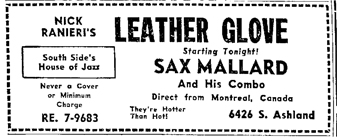
During December 1952, Sax Mallard's group apparently traveled as far as Montréal; at least they were subsequently billed as being back from an engagement there. On January 3, 1953, they started working at the Leather Glove, 6426 South Ashland (their contract for 3 weeks had been accepted and filed by Local 208 on December 4, 1952). In February 1953, Mallard shifted for a while to the Strand Show Lounge (indefinite contract filed on February 19). He filed a one-month extension on June 18. During June, the Defenderadvertised Sax Mallard as the featured attraction at the Strand Show Lounge, 6325 South Cottage Grove; the Ike Perkins Trio was also on the bill. The Mallard combo was replaced in mid-July by a new group led by veteran Swing tenorist Paul Bascomb, who had moved to Chicago earlier in the year.
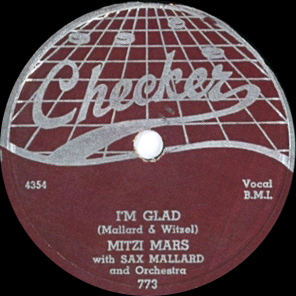
Mitzi Mars (voc); accompanied by Sax Mallard and his Orchestra: Sax Mallard (ts); unidentified (p); LeRoy Jackson (b); Sleepy Nelson (d).
Universal Recording, Chicago, March 29, 1953
| 4354 | I'm Glad* (Mallard-Witzel) | Checker 773, RST 91577 [CD], MCA 380-596 [CD] | |
| 4355 | Roll 'Em* (Mallard-Witzel) | Checker 773, Chess CHD4-9352, RST 91577 [CD] |
We got the recording date from the Chess Rhythm & Roll box set (CHD4-9352, released 1994). We used to think that Al Benson recorded these and sold them to the Chess brothers, but it turns out that most items in the U4300 series (after January 1, 1953) were actually cut with artists under contract to the Chess brothers. Besides, Sax Mallard had been working for Chess, not for Benson's freelance enterprise. And we have no evidence of a parallel Mitzi Mars release on Parrot. Checker 773 was a 78 and 45-rpm single released in May 1953 (on May 22, Chess was already boasting in a Cash Box ad about the big orders coming in). "I'm Glad" was further reissued in 1999 on Chess MCA 380-596, a 15-CD extravaganza titled The Chess Story 1947-1975. LeRoy Jackson and Sleepy Nelson were regular members of Sax Mallard's quartet at this time.
Mitzi Mars had made one previous recording, an extremely obscure JOB release recorded in January 1951 with veteran pianist Henry Palmer and his band. Her Checker single would get a lot more distribution. We do not know the singer's legal name, but both sides of Checker 773 are co-credited to one "Witzel."
The band on her Checker session has often been said to belong to King Kolax (see the King Kolax Discography): both Jepsen's Jazz Records and the Chess box make this attribution. However, the original Chess master book, so frequently a ball of confusion, definitely attributes these two titles to "Mars/Mallard" (thanks to Bill Daniels for copies of this material). Leadbitter, Fancourt, and Pelletier, Blues Records Volume II, L-Z list the backing as Sax Mallard and Orchestra, as do the notes to RST 91577. That's what the label to Checker 773 says as well. A listen to "Roll 'Em" and "I'm Glad" confirms the lineup listed above.
The confusion arose because Mitzi Mars had worked with both Kolax and Mallard's bands at Chicago clubs before cutting this session; both actually backed her at the Crown Propeller, at one time or another. For one such appearance, she was billed as "The Blonde Bombshell." By July 2, 1953, the Defender was promoting her as a "songsational recording star" during her gig at the Cotton Club.
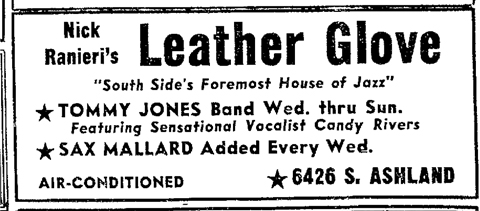
In June, Mallard picked up Wednesday nights at the Leather Glove, where Tommy "Madman" Jones was the reigning attraction. Meanwhile, as that gig was coming to a close, Cash Box (July 18, 1953) said his group was "getting a great big hand nitely at the Strand Lounge."
Mallard picked up further studio work at Chess, accompanying a doowop group from Cleveland called The Coronets. There's a good chance he'd met the Coronets' manager, Alan Freed, on his swing through Cleveland the previous year.
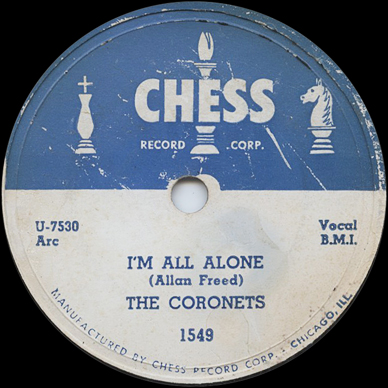
The Coronets: Charles Carruthers (lead); Sam Griggs (tenor, lead-1); Lester Russaw (tenor); George Lewis (baritone); Williams Griggs (bass); with Sax Mallard and Combo: Oett "Sax" Mallard (ts -1); unidentified (celeste -1; p); LeRoy Jackson (b); Sleepy Nelson (d).
Universal Recording, Chicago, June 1953
| U-7530 | I'm All Alone ("Freed") -1 | Chess 1549, Power Vine 6082 [CD] | |
| U-7531 | I Want You to Know | Power Vine 7093 [CD] | |
| U-7532 | Nadine ("Freed") | Chess 1549, Chess LP 1441, Chess 2CH 50030, Chess [Br] 380-596 [CD], Power Vine 6082 [CD] | |
| U-7533 | G. I. Missing | unissued |
A trade-paper advertisement for Chess 1549 (reproduced in the leaflet to Power Vine 7093) refers to "The Coronets backed by Sax Mallard Combo"). The label to Chess 1549 does not identify the accompanists. But a tenor sax, beefed up with echo, can be heard on "I'm All Alone," and this is enough to enable us to identify Sax Mallard's playing. Accompaniment on the other two tracks that we have heard is by the rhythm section only; "G. I. Missing" remains unreleased and we hope it isn't lost.
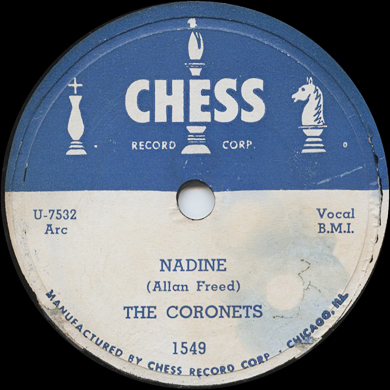
The personnel for The Coronets and session date are from Bob Pruter's Doowop: The Chicago Scene. According to Pruter the session witnessed a significant artistic clash between the vocal group and the accompanists. Even so, Chess 1549, a single issued in September 1953, spent 10 weeks on Billboard's R&B chart, reaching as high as #3.
"Nadine," was, of course, not actually written by Cleveland DJ Alan Freed. It was the work of Charles Carruthers. Freed, who routinely extracted composer credits, reportedly declared that he would do nothing to promote the record unless he was given the writing credit. "I'm All Alone" was also filched by Freed. This matters less because it was already a straight steal from B. B. King's "Woke Up This Morning," which had been released in March 1953.
"Nadine" was reissued in 1959 on Chess LP 1441, Bunch of Goodies; in 1972 on the double LP Chess 2CH 50030, The Golden Age of Rhythm & Blues; and in 1999 on Chess MCA 380-596, a 15-CD extravaganza titled The Chess Story 1947-1975. The Power Vine CDs are 1999 bootleg reissues of Chess doowop material. Power Vine 6082 is titled Catch the Windy City Harmonizers: Unreleased & Rare Chicago R&B Vocal Groups — The First Round; Power Vine 7093 is More Windy City Harmonizers: Unreleased & Rare Chicago R&B Vocal Groups—The Second Round. Both purport to have been "Made in Indonesia". They are Volumes 4 and 5 in the Windy City R&B series; the first three are drawn from the United and States Vaults.
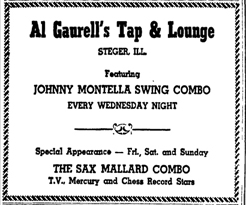
In late September Mallard was working in Steger, a little town on the southern edge of Cook County (therefore well outside of Local 208's territory). In October the Mallard combo was at the Leather Glove Lounge once again; the contract was posted by Local 208 on October 15. The same contract list has Mallard down for a one-off session at Universal Recording. Record company contracts were not listed in this fashion, only sessions for freelance producers. We doubt that the next session with the Coronets would have rated a separate deal; the vocal group was under contract to the Chess brothers. More likely, Mallard was responsible for an entirely different session, which remains untraced.
Whatever their musical disagreements back in June, the Coronets and Mallard's group got along well enough to lay down three complete tracks on October 11.
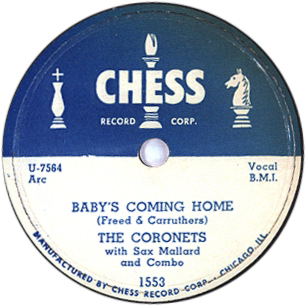
The Coronets: Charles Carruthers (lead); Sam Griggs (tenor, lead-1); Lester Russaw (tenor); George Lewis (baritone); William Griggs (bass); with Sax Mallard and Combo: Oett "Sax" Mallard (ts); unidentified (celeste -1; p); LeRoy Jackson (b); Sleepy Nelson (d).
Universal Recording, Chicago, October 11, 1953
| U-7562 | It Would Be Heavenly (Freed & Carruthers) -1 | Chess 1553 | |
| U-7563 | Should I | Chess CHD4-9352 [CD] | |
| U-7564 | Baby's Coming Home* -1 (Freed & Carruthers) | Chess 1553 |
We were alerted to this session by the MFD files, which identified the band as "Sax Mallard Orchestra." Our information about the Coronets and the recording date are from Robert Pruter's Doowop: The Chicago Scene. According to Pruter, Chess 1553, which was released in November 1953, sold very few copies; we are indebted to Tom Kelly for unearthing one and making label scans and tape dubs available to us. "Should I" was first issued in 1994 on Chess CD CHD4-9352, the Chess Rhythm and Rollboxed set.
Sax Mallard plays tenor sax throughout. On "It Would Be Heavenly" (where the pianist plays celeste during the introduction) he produces a continuous soft obbligato. On the jump, "Baby's Coming Home," Mallard has an extended tenor sax solo that blends jazz with R&B elements. It may be his very best tenor solo on record. "Should I" has a prominent tenor sax intro on the opening bars (redolent of Mallard's work with Arbee Stidham). The first two-thirds of this slow ballad get exceedingly quiet accompaniment from the piano and the sax, then in the last third as the ballad picks up a bit of energy Mallard provides responses after each phase.
We thought the drummer, who is comfortable in the early rock'n'roll setting of "Coming Home," might be Vernel Fournier. But Fournier, who did do some sessions for Chess, said he never worked in Sax Mallard's groups. And while guitarist Tony King was a regular member of the Coronets, no guitar can be heard on this session.
After losing two members to the military draft, the Coronets made a final session for Chess on May 22, 1954 with an altered vocal lineup that included a new lead singer. Two numbers, "Corbella" and "Beggin' and Pleadin'," went unreleased at the time but appeared years later on Le Roi du Blues LP 33.2012. This was a collection of Little Walter rarities (yes, you read that right)—the Chess brothers experimented with using Little Walter and his band to back the vocal group. Thanks to Scott Dirks for information about these obscure sides. The Coronets were dropped by Chess after that session; with further personnel changes, the group recorded for a couple of other labels.
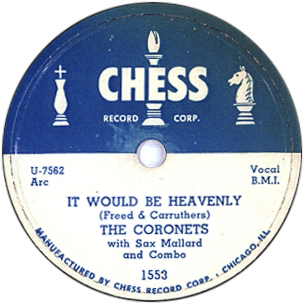
On October 19, 1953, guitarist and singer Rudy Greene cut his second and last session for Chance, which was released with the generic band ID of "Rudy Greene and Orch." He was accompanied by an unidentified studio band consisting of two tenor saxes, baritone sax, piano, bass, and drums. Four titles were cut that day; these were later released on Chance 1146 and 1151. The overall session is rather similar in sound to what can be heard on the Bobby Prince outing (for RCA Victor) of December 4, 1953, which we know Sax Mallard was on. Unfortunately, there are no instrumental solos (except for Greene's guitar) on the Chance sides, and no other documentation of who was there. A reasonable guess as to lineup would be: Greene (eg); Sax Mallard (ts); Nelson Berry (ts); Mac Easton (bars); Norman Simmons (p); LeRoy Jackson (b); Sleepy Nelson (d). But more information would be nice!
In November 1953, Sax Mallard settled into a second period residency at the Crown Propeller Lounge (868 East 63rd Street). On November 19, his band was advertised backing headliner Valaida Snow. "King of Guitar" Rudy Greene was also on the bill.
Bobby Prince [Charles Gonzalez] (voc) acc. by the Norman Simmons Orchestra: Norman Simmons (p, ldr); John Ivan Avant (tb); Oett "Sax" Mallard (as); Nelson Berry (ts); McKinley Easton (bars); Rudolph Spencer Greene (eg); LeRoy Jackson (b); Willie Nelson (d).
RCA Studios, Chicago, December 4, 1953
| E3VB0296 | I'm Still in Love with You | RCA Victor (unissued) | |
| E3VB0297 | I'm in Bad Shape | RCA Victor 20-5585, RCA Victor 47-5585, Chicago LP 205 | |
| E3VB0298 | That's No Lie | RCA Victor (unissued) | |
| E3VB0299 | Give All Your Love to Me | RCA Victor (unissued) |
"I'm in Bad Shape" is incorrectly listed in Jepsen as "I'm in a Bad Shape." The correct title is given in Victor Pearlin's 1979 article on Bobby Prince. The 20- prefix indicates a 78 and the 47- indicates a 45. Chicago LP 205 is a white-label collector's LP. There was a series of these LPs. They were all seemingly arbitrary collections of R&B tracks—most of which were not recorded in Chicago.
Mallard does not solo on "I'm in Bad Shape," which does feature an interesting guitar solo by Rudolph Spencer Greene with a prominent counterline from Mac Easton's baritone sax. Thanks to Dave Penny for a dub of this number; we have not been able to hear the rest of the session, which remains in the vault.
The band assembled for the event included three fourths of the Mallard Quartet (we are presuming that Norman Simmons, the leader on the studio date, was not a member). Sleepy Nelson had been working with Mallard since at least the Roosevelt Sykes session of October 15, 1947. The studio band also featured Rudy Greene, who had been appearing at the Crown Propeller.
A photo of Sax Mallard receiving a present from Mitzi Schlossberg has recently surfaced on the Crown Propeller blog, courtesy of the Schlossberg family. The gift wrapping and a few holiday decorations narrow down the time of year, and the tank that Atlantis performed in puts the event before the end of 1954. Sax Mallard was leading the house band in December 1951 and December 1953; we have placed the photo here, but it could be from two years earlier.
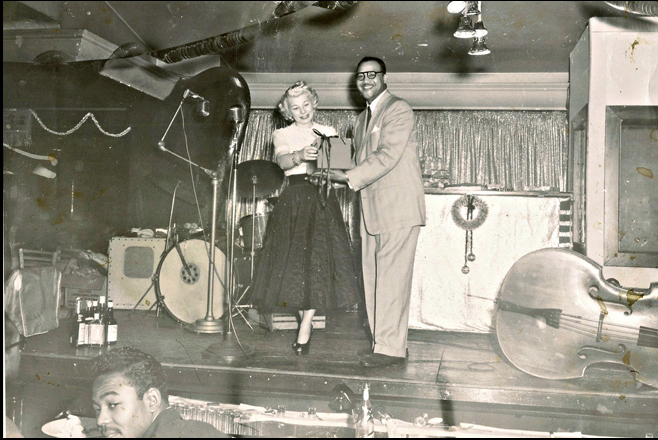
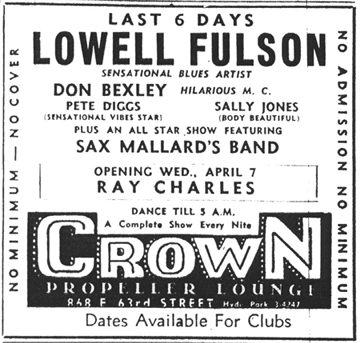
On January 9, 1954, Mallard and combo were backing Chubby Newsom, Alberta Adams, and the Bluezettes (the Newsom-Adams duo, which had been working since the spring of 1953, was also billed as "Bluzettes" and "Bluesettes"), with a 10-day stay by Wynonie Harris slated to begin on January 15. Other headliners during this run at the Propeller included Jimmy Witherspoon, Scatman Crothers, Ray Charles, Big Maybelle, and Amos Milburn. On April 3, Mallard's band was backing a package of acts headlined by blues guitarist Lowell Fulson. As it turned out, his next recording opportunity was would be with another guitar-playing bluesman.
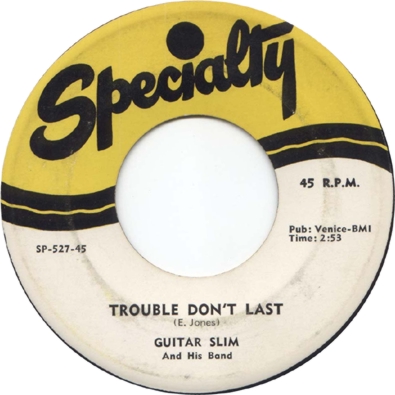
Guitar Slim [Eddie Jones] (eg, voc); Gus Fontenette (as); Joseph Henry Tillman (ts); Oett "Sax" Mallard (ts); John Gerard (p); Lloyd Lambert (b); Oscar Moore (d).
Universal Recording, Chicago, April 16, 1954
| Trouble Don't Last (Jones) | Specialty 527, Specialty SPCD-7007 | ||
| Later for You Baby* | Specialty 527, Speciality SP 7007, SPCD-7007 | ||
| Bad Luck Blues | Specialty 2120, Specialty SPCD-7007 | ||
| Twenty-Five Lies | unissued |
On this session for Specialty, Slim's usual New Orleans lineup appeared, except for Mallard, who filled in on second tenor sax. Information from the liners to Specialty SPCD-7007. Mallard appears to be the soloist on "Later for You, Baby."
Specialty 527 was a single released at the time, and Specialty 2120 a later single. Specialty 7007 and SPCD-7007 were LP and CD "configurations" of Sufferin' Mind, a Guitar Slim collection released in 1991. There may be other reissues of these items.
"Twenty-Five Lies" has been problematic. The piece was recorded at this session, then redone at the next Guitar Slim session in Hollywood on September 28, 1954 (which of course did not include Sax Mallard). Only one version survived to be released on Specialty 536, and the liners to Sufferin' Mind profess ignorance about its origin. Careful listening suggests that the horns are trumpet-alto sax-tenor sax, as on the Hollywood session, not alto sax-tenor sax-tenor sax, as in Chicago. In any case, the tenor solo on the surviving version is by Joe Tillman.
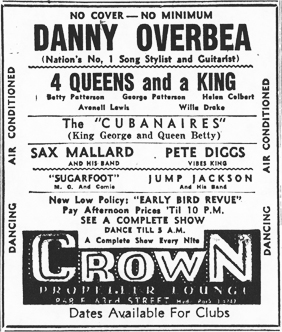
On May 8, 1954, the Chicago Defender had Sax Mallard and his Band at the Crown Propeller Lounge. Top billing went to vocalist Billy Brooks; "Pete Diggs, Vibes King"; and a vocal group called 4 Queens and a King. On June 12, Sax Mallard and his Band were again in the middle of a long list of acts at the Crown Propeller. Danny Overbea ("Nation's No. 1 Song Stylist and Guitarist") was the headliner, followed by 4 Queens and a King, a dance team called the Cubanaires, Sax Mallard, Pete Diggs (again the "vibes king"), comic and MC "Sugarfoot," and Jump Jackson and his band. Mallard's ensemble continued at the Crown Propeller through the week of July 3. They were then replaced by King Kolax and his quintet.
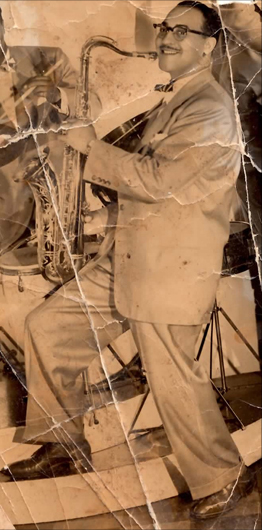
Sax Mallard's Quartet had now been taken on by a booking agency that mostly concentrated on white entertainers (the Harmonicats, Ish Kabibble, and so on—the Harmonicats were the biggest attraction). How much business this brought in is hard to know, but one benefit to us is the full-page ad that the agency bought in Down Beat (July 14, 1954), which included the photo of Mallard and his band that we have placed at the head of this Web page. Mallard was now working more frequently in the suburbs, when not venturing farther on down the road. Working outside Harry Gray's territory, he vanished from the Local 208 contract list during the second half of 1954 and the first half of 1955.
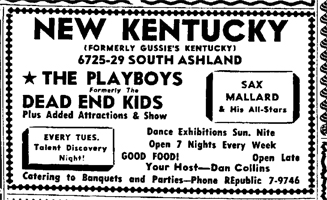
In November 1954, Sax Mallard and His All-Stars settled in at the New Kentucky Lounge, 6725-29 South Ashland, where they backed a show featuring a vocal ensemble called The Playboys. By early December, the dance team of Joe and Jean Zonzo had been added to the show. By late January 1955, The Playboys and the dance team had been displaced by a second band (Cozy Eggleston's) and a comedian who doubled as MC. Mallard and Eggleston's ensembles were billed for the time being as "Mambo Bands." Most likely the run stretched on after that, though we lack further advertisements from the club.
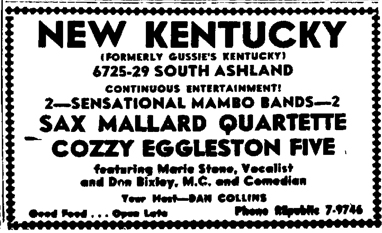
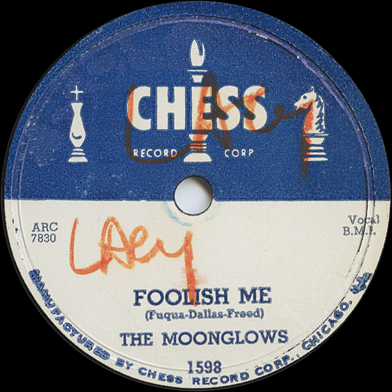
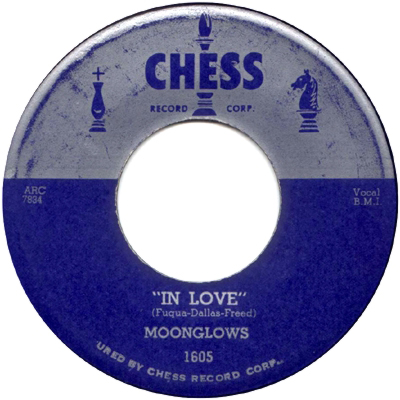
The Moonglows: Bobby Lester (lead and tenor); Alexander "Pete" Graves (tenor); Harvey Fuqua (lead and baritone); Prentiss Barnes (bass); The Fortunes: Donald Jenkins (lead), Ronnie Strong (tenor), Walter Granger (baritone), and William Taylor (bass); accompanied by Eddie Chamblee (ts); Oett "Sax" Mallard (bars); unidentified (p); unidentified (eg); Willie Dixon (b); Leon Hooper (d).
Universal Recording, Chicago, c. May 1955
| 7829 | Starlite % | Chess 1605, Chess CHD2-9345 [CD] | |
| 7830 | Foolish Me (Fuqua-Dallas-"Freed") | Chess 1598, Chess CHD2-9345 [CD] | |
| 7830 [alt.] | Foolish Me | Chess ACRR701 | |
| 7831 | No One | unissued | |
| 7832 | Doubtful | Power Vine 6082 [CD] | |
| 7833 | Slow Down (Woods) | Chess 1598, Chess CHD2-9345 | |
| 7834 | In Love (Fuqua-Dallas-"Freed")% | Chess 1605, Chess CHD2-9345 | |
| 7835 | Believe in Me (McKay-"Fratto")* | Checker 818 |
Session information comes from the MFD Files, Ferlingere's doo-wop discography, Michel Ruppli's Chess discography, and the liners to Chess CHD2-9345, a 2-CD Moonglows compilation called Blue Velvet/The Ultimate Collection and released in 1993. The recording date is given as "May? 1955" in Ruppli but it might have been a little earlier than that.
The vocal lineup is drawn from Pruter's Doowop: The Chicago Scene. Harvey Fuqua sings the lead on "Foolish Me" and "In Love." Bobby Lester is responsible for the lead on "Starlite." Chess 1598 was probably released on 45 and 78 rpm in June 1955; the release date needs to checked. According to Ferlingere, Chess 1605 followed in July of that year.
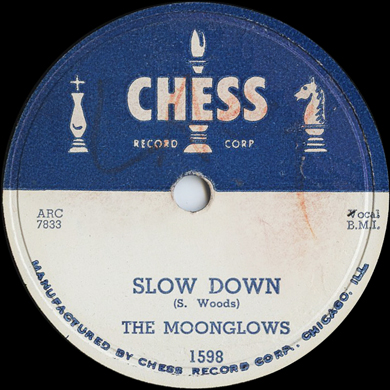
The previously unidentified title on 7832 is "Doubtful," which was first issued in 1999 on a bootleg CD of Chess doowop material, purportedly made in Indonesia, and titled Catch the Windy City Harmonizers: Unreleased & Rare Chicago R&B Vocal Groups — The First Round (Power Vine 6082).
Guitarist Wayne Bennett worked with the Moonglows in 1955 but it is not known whether he participated in this session. The Chess liners say the guitarist is Billy Johnson, but Johnson came later in 1955. Sax Mallard can be heard (very subdued) on baritone. It is a pity there are no solos by him, as this is his only known performance on this instrument. He is clearly overqualified for the work that was required here. The only two horn solos on this session are on "Slow Down," and both are taken by Eddie Chamblee.
The Fortunes, who had previously appeared on two sessions for Checker (January 25, 1955 and March 1955) cut "Believe in Me" at the tail end of this one. It was released in June 1955 on Checker 818, backed with "My Baby Is Fine" from the March session.
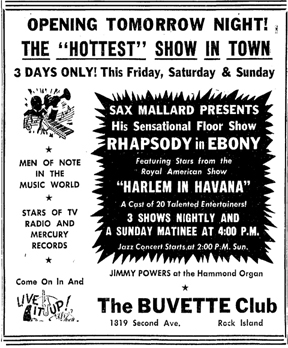
In July 1955, Sax Mallard reappeared on the Local 208 contract list (his contract for 2 weeks at the Kentucky Lounge, the same place he'd already been since November of the previous year, was posted on July 7). Around this same time, trumpeter Lewis Ogletree landed a rare engagement as a leader (1 week at the Picture Lounge, posted on the same date). Ogletree had spent 1954 and the first half of 1955 touring with Earl Hines. In October, Sax Mallard went on the road with a show; how long this lasted, we are not sure, but on October 7 he was at the Buvette Club in Rock Island, Illinois, with a cast of 20.
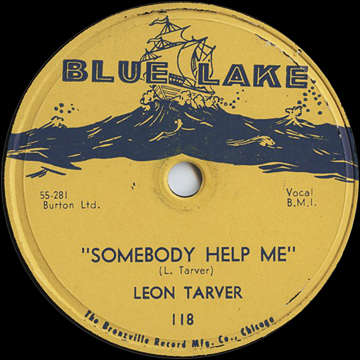
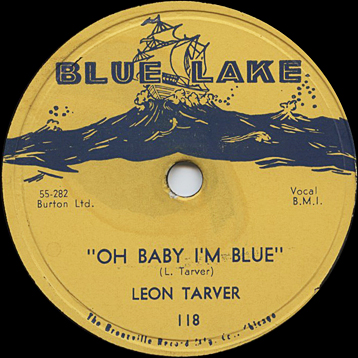
Lewis "Bill" Ogletree (tp); Oett "Sax" Mallard (as); Cliff Davis (ts); Earl Washington (p); Jimmy Richardson (b); Red Saunders (d); Al Benson (dir).
Universal Recording, Chicago, December 1955
| BL55-281 | Somebody Help Me (Tarver) ^ | Blue Lake 118 | |
| BL55-282 | Oh Baby I'm Blue (Tarver) ^ | Blue Lake 118 | |
| 55-283 | I Know, I Know ^ | unissued | |
| 55-284 | Tell It Like It Is* | Parrot 822, Empire Musicwerks CD-N1 | |
| 55-285 | Uptown Stomp* | Parrot 822, Empire Musicwerks CD-N1 |
Parrot 822 was a single, both 45 and 78 rpm. The exact date of issue is not known but it was after December 1955, and the labels (on the 78 especially) have the look of Parrots put out by John Henry "Lawyer" Burton, whose purchase of the company was announced in March 1956 but appears to have taken place somewhat earlier. In December 2002, both sides of Parrot 822 were reissued on Empire Musicwerks CD-N1, a collection of Parrot/Blue Lake jazz sides titled Jukebox Jazz! From the Southside of Chicago.
Judging from a list of Parrot tapes that came into the hands of Chess Records around 1959, these sides were cut at the last session to be recorded while Benson still ran Parrot. These sides carry a later tape box number from Universal than the Henry Gray and Jody Williams (Little Papa Joe) sessions of December 8 and 9, 1955.
The tape list also puts three sides by singer Leon Tarver in the same box with the Benson-Ogletree sides. A listen to Tarver's two released sides, on Blue Lake 118 confirms that the Benson-Ogletree musicians accompanied his soul-blues singing.
The "Benson" on the label is Al Benson, but he does not sing or narrate on either of these sides. We thought that the odd band name might really have been intended as a composer credit, but we have learned from Charles Walton's interview with Lewis Ogletree that he had led a medium-sized under Benson's sponsorship at the Savoy Ballroom, during its last few months of life in 1948. Benson had already done one tribute to the band, on a Fall 1948 session that saw release on Old Swing-Master. But Ogletree wasn't available on that occasion.
Lord's Jazz Discography gives no personnel beyond Bill Ogletree and misrenders one side as "Liptown Stomp." The musicians were identified by ear. Bill Ogletree solos on both sides, as might be expected from the leader. Sax Mallard solos on both sides as well, and the tenorist (we think it was Cliff Davis, who was getting a lot of work on R&B and rock and roll sessions at the time; see our Al Smith page) has a solo on "Tell It like It Is."
Blue Lake 118, consisting of two slow blues sung in an incipient soul style, was released in February 1956. The accompanists are very well recorded; Richardson's bass and Saunders' drums make quite an impact, but there are no solos for anyone and the the three horns stick to R&B riffing with a little Swing thrown in. By the time of release, the sale of the label must have been completed, because the publishing company listed for both of Leon Tarver's tunes is Burton Ltd.
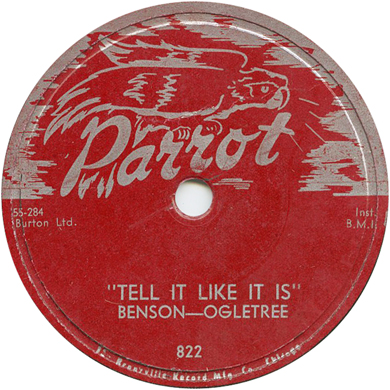
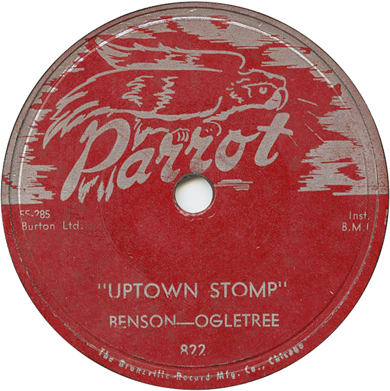
A couple of years went by without another Defender ad. Clearly, the commercial dominance of rock and roll was reducing the demand for Sax Mallard's services. Unlike some of his contemporaries who had their own troubles adjusting (King Kolax comes to mind) he did not get involved in soul music. Nor would he follow Red Saunders into Dixieland. After a year's absence from the Local 208 contract lists, he filed a contract for 4 weeks at the Whip Lounge on July 7, 1956.
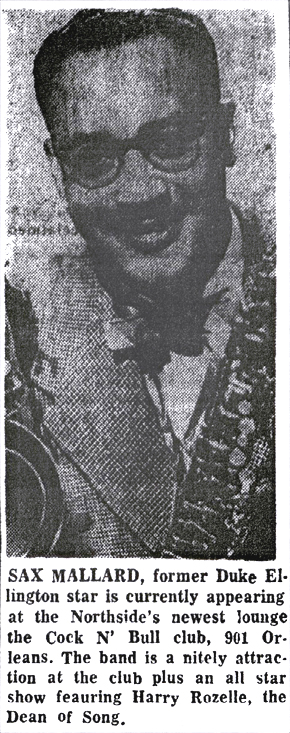
On March 21, 1957, he posted a contract for 2 weeks at a familiar location, the Leather Glove Lounge. In May 1957 the Sax Mallard Combo was working Oddo's at 7141 Irving Park Road; his contract for one week at the establishment was posted on May 16. This was on the far Northwest side, a long way from Chicago Defender territory; an ad for the gig appeared in the Chicago American (May 18, 1957). They liked him at Oddo's, for on July 18, he posted a new "indefinite" contract. On August 15, he filed a contract for 2 weeks at the Crown Propeller Lounge, which was trying to revive its business. And on November 7, he posted a contract for two weeks with options at the memorably named Cock 'n Bull Lounge, on the near North Side (the Cock 'n Bull purposely ran one of its ads in the Defender upside down). On December 5, he was back at the Crown Propeller with an "indefinite" contract. The Crown Propeller, however, didn't have a lot farther to go. It folded in the spring of 1959, and in 1960 Norm and Mitzi Schlossberg moved to Florida.
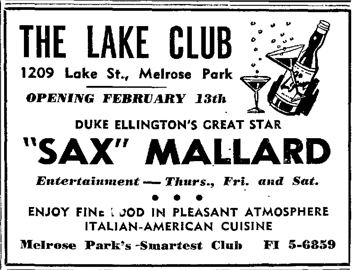
Mallard dropped off the Local 208 contract list for over a year, again taking gigs outside its territory. In February 1958 he picked up three nights a week at the Lake Club in Melrose Park, which ran display ads three weeks in a row.
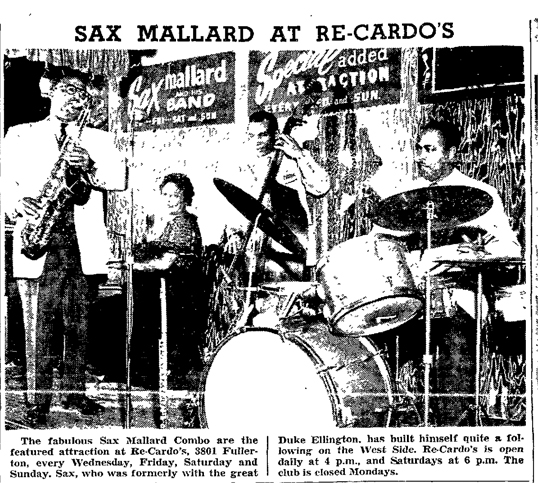
In December 1958 Mallard was holding down four nights a week at Re-Cardo's, 3801 West Fullerton Avenue, which even ran a photo of his band in the local advertising sheet. On February 19, 1959, he resurfaced on the Local 208 list with an "indefinite" gig at Oddo's. On April 16, he posted an indefinite contract with Re-Cardo's Lounge (as we know, he'd already been working there for a while; how some of these venues came to Local 208's attention must have been an interesting story). This was followed by an indefinite contract with the Picture Lounge on June 4, extended on July 2.
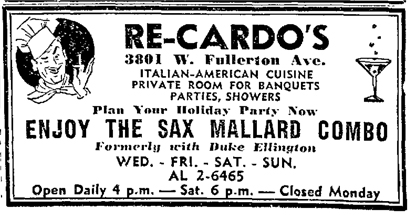
Mallard could see how fashions were continuing to shift away from his kind of music, so in 1959, he enrolled in the Greer Trade School to learn how to tune pianos. According to his obituary in Living Blues, Mallard held down a steady gig from 1959 to 1984 as chief piano tuner for the Chicago Park District, where he also taught piano tuning to others. And he "continued to play in occasional lounges and supperclubs in the city and suburbs." He would also serve on the examining board of the Chicago Federation of Musicians for 15 years.
Sax Mallard would not record again until 1960; his next three opportunities came about through the efforts of local record-store owner Narvel Eatmon (1912-1991, better known as Cadillac Baby). During the latter part of his career the disparity between what he usually performed on the bandstand and what he was asked to do in the studio must have been especially noticeable.
Bobby Saxton (voc -1); Earl Hooker (eg); Ernest Cotton (ts); Sax Mallard (ts); Tall Paul Hankins (p); Margo Gibson (eb); Bobby Little (d).
Hall Studios, Chicago, January 15, 1960
| B | Dynamite* ("Eatmon-Daniel-Hooker") | Bea & Baby 106, Checker 947, Red Lightnin RL 0021, Wolf CD 120.293 | |
| A | Trying to Make a Living (Eatmon-Daniel) -1 | Bea & Baby 106, Checker 947, Red Lightnin RL 0021, Wolf CD 120.93, Chess MCA 380-596 [CD] | |
| Trying to Make a Living Part 2 (Eatmon-Daniel) -1 | Bea & Baby (unissued) |
This record was a local hit. Later (after Bea & Baby folded) it was licensed to Checker. Red Lightnin RL 0021, Meat & Gravy from Cadillac Baby Volume 3: Trying to Make a Living, is a collection featuring Little Mack [Simmons], L.C. McKinley, and Eddie Boyd, all of whom recorded for the labels operated by Cadillac Baby (Narvel Eatmon). Personal and date from the liner. The LP was issued in 1978. The Wolf CD, issued around 1994, was titled Best of Bea & Baby Volume 1. MCA 380-596 is a 15-CD extravaganza, released in 1999 and titled The Chess Story 1947-1975.
Previous sources list an unidentified piano player and put Harold Tidwell at the drums. The current identifications are from Sebastian Danchin, Earl Hooker: Blues Master (Jackson: University of Mississippi Press, 2001). Danchin, however, incorrectly has Sax Mallard playing baritone sax. Danchin points out that "Dynamite" is really "Blues Walk" by jazz trumpeter Clifford Brown.
The tenor sax solo on "Dynamite" sounds like Sax Mallard in his latter-day manner. There are no horn solos on "Trying to Make a Living."
Though there may have been other Bea & Baby sessions with Sax Mallard, he does not appear on Volumes 1 and 2 of the Red Lightnin series. Mallard did, however, make one known session for Bea & Baby and one for its subsidiary Miss.
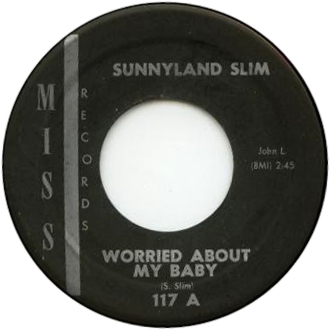
Sunnyland Slim [Albert Luandrew] (voc, p) with "Gilbert Potter" [Porter Kilbert] (ts); Oett "Sax" Mallard (ts); Robert Lockwood Jr. (eg); Lee Jackson (eb); Armand "Jump" Jackson (d).
Chicago, prob. August 1960
| A | Worried about My Baby (S. Slim) | Miss 117 | |
| B | Drinking and Clowning (S. Slim) | Miss 117 |
Our session information comes from Leadbitter and Slaven 1968. "Worried" has a piano solo and a guitar solo; "Drinking" just a guitar solo. By this time, the saxes had settled into stereotypical background duties, which is a shame, as both tenors sound glorious in their restricted roles. Thanks to Daniel Gugolz for a tape; he points out that "Gilbert Potter" (as identified in discographies) is a garbling of Porter Kilbert's name.
Porter Kilbert died at age 39 in October 1960, so the 1961 date that LS give for this session can't be quite right. Indeed, the lineup look very similar to what we find on the Roosevelt Sykes session for Bea & Baby, which took place on August 24, 1960.
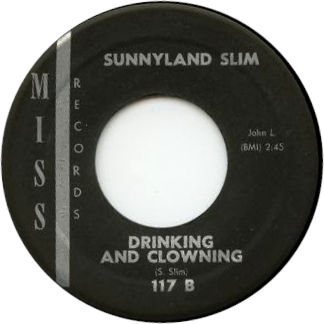
Roosevelt Sykes (p, voc) with Oett "Sax" Mallard (ts); "Gilbert Potter" [Porter Kilbert] (ts); Robert Lockwood, Jr. (eg); Jimmy Lee Robinson (eb); Armand "Jump" Jackson (d).
Chicago, August 24, 1960
| Piney Woods | Bea & Baby 116 | ||
| I'll Get Even | Bea & Baby 116 | ||
| Gulfport Boogie | unissued | ||
| Casual Friend | unissued | ||
| Strange World | unissued | ||
| Elaine | unissued |
This session is listed in Tom Lord's Jazz Discography. Lord, however, puts the last four sides on Bea & Baby 117 (there wasn't any) and Bea & Baby 118 (which was actually by Little Mack Simmons). Fancourt and McGrath list these sides as unissued. Lord also renders the first title as "Pinnie Woods" and the third as "Gulf Port Boogie."
By the time he picked up these blues sessions, Sax Mallard was steadily tuning pianos. He didn't post another contract with Local 208 until December 2, 1960, when he filed an indefinite agreement with the Casa Madrid. He filed another contract with that establishment on March 2, 1961; after that he dropped off the Local 208 lists for the rest of the year.
Early in 1962 Mallard picked up a recording opportunity when the Bihari brothers decided to record Roosevelt Sykes for their budget LP label, Crown. The resulting session was informal and obviously made on a shoestring (Sykes plays a flinty old upright, though Mallard, or someone, tuned it first). With jukebox play in mind, none of the cuts goes past 3 minutes. But everyone can be heard and both Mallard and the guitarist (usually said to be Lee Jackson, but we can hear Sykes call out a different name) are duly accorded their features. One wonders whether Crown used Jump Jackson's home studio...
Roosevelt Sykes (voc, p) with Oett "Sax" Mallard (ts); Lee Jackson (eg); "Big" Willie Dixon (b); Armand "Jump" Jackson (d).
Chicago, April or May 1962
| Slave for Your Love (Sykes) | Crown CLP 5287, Crown CST287, Ember [Br] EMB3391, United US-7792, Kent 384, Ace CDCHM 1132 | ||
| Gone with the Wind (Sykes-Josea)* | Crown CLP 5287, Crown CST287, Ember [Br] EMB3391, United US-7792, Kent 434, Kent 5027, United US7748, Cascade [Br] CROP-1005, Ace CDCHM 1132 | ||
| Wild Side (Sykes-Josea) | Crown CLP 5287, Crown CST287, Ember [Br] EMB3391, United US-7792, Kent 384, Ace CDCHM 1132 | ||
| Out on a Limb (Sykes) | Crown CLP 5287, Crown CST287, Ember [Br] EMB3391, United US-7792, Kent 434, Specialty [Br] SPE6609, Ace CDCHM 1132 | ||
| Honey Child (Sykes)* | Crown CLP 5287, Crown CST287, Ember [Br] EMB3391, United US-7792, Ace CDCHM 1132 | ||
| Never Loved like This Before (Sykes-Josea) | Crown CLP 5287, Crown CST287, Ember [Br] EMB3391, United US-7792, Ace CDCHM 1132 | ||
| Last Chance (Sykes-Josea) | Crown CLP 5287, Crown CST287, Ember [Br] EMB3391, United US-7792, Ace CDCHM 1132 | ||
| Casual Friend (Sykes-Josea) | Crown CLP 5287, Crown CST287, Ember [Br] EMB3391, United US-7792, Ace CDCHM 1132 | ||
| Your Will Is Mine (Sykes-Josea) | Crown CLP 5287, Crown CST287, Ember [Br] EMB3391, United US-7792, Ace CDCHM 1132 | ||
| Hupe Dupe Do (Sykes-Josea)* | Crown CLP 5287, Crown CST287, Ember [Br] EMB3391, United US-7792, Ace CDCHM 1132 |
Information about the Crown mono LP and the Kent singles comes from Leadbitter and Slaven 1968. The Crown stereo LP, the Ember LP, and the United LP (all early 1960s issues) are mentioned in Tom Lord's Jazz Discography, as are the releases on British Specialty, on British Cascade, and on the United sampler.
In 2006, all 26 minutes of the original Crown LP were reissued in stereo on Ace CDCHM 1132, under the original title Roosevelt Sykes Sings the Blues.
The Crown LP was released in June 1962, according to the original back liner. The liner notes (mischievously attributed to one Josea Taubling) refer to "Big Willie Dixon," cite Jump Jackson as the drummer (he is not credited in Leadbitter and Slaven), and leave out the guitarist. On the guitar feature "Your Will Is Mine," Sykes shouts (unfortunately, off-mike) "Go ahead, let your hair down." LS and Fancourt/McGrath credit Lee Jackson, and Rusty Zinn confirms that the guitarist sounds like Jackson, while Scott Dirks says the guitarist doesn't sound like Auburn "Pat" Hare.
Lord claims that Sax Mallard lays out on two pieces. Mallard is actually on "Slave for Your Love," though he plays just a few notes, and puts in a fair amount of accompaniment on "Casual Friend." Mallard gets a solo on "Wild Side," prominent responses and a solo on "Honey Child," and another solo on "Hupe Dupe Do" (if anyone cares, the exclamation is more accurately spelled "hoopee doopee doo").
On October 4, 1962, Oett Mallard posted an indefinite contract with the Profile Club. After two full years off the Local 208 list, Sax Mallard posted another indefinite contract with the same establishment on November 5, 1964; there are no further contracts on the Local 208 list before its merger with Local 10 was finally completed in January 1966.
The Strand Show Lounge (at 6325 South Cottage Grove) held a grand opening on Friday, August 5, 1966, resurrecting the club that had been at that location from the late 1940s to December 1956, when it became McKie's Disc Jockey Lounge. The attraction advertised in the Defender was "dancing to Sax Mallard and his band." By booking Mallard the owners probably hoped to evoke the club's glory years.
In 1967, Sax Mallard lost his mother, Lillie Mae.
Sax Mallard's last known appearance in the studio was also King Kolax's last appearance. Mallard was featured on every cut from this session; he even got a chance to dust off his clarinet.
Roosevelt Sykes (p, voc); King Kolax (tp -1); Oett "Sax" Mallard (ts-2; cl-3); Robert Jr. Lockwood (eg); Dave Myers (eb); Fred Below (d).
Sound Studios, Chicago, August 10 and 11, 1970
| Feel like Blowing My Horn -1, 2 | Delmark DS 632, DE-632 [CD] | ||
| My Hamstring's Poppin' -2 | Delmark DS 632, DE-632 [CD] | ||
| I'm a Nut -2 | Delmark DS 632, DE-632 [CD] | ||
| Blues Will Prank with Your Soul -2 | Delmark DS 632, DE-632 [CD] | ||
| Jubilee Time [alt.] -1, 2, 3 | Delmark DE-632 [CD] | ||
| All Days Are Good Days [alt.] -1, 2 | Delmark DE-632 [CD] | ||
| Sykes' Gumboogie -1, 2 | Delmark DS 632, DE-632 [CD] | ||
| Rock-A-Bye Birdie -2 | Delmark DS 632, DE-632 [CD] | ||
| Moving Blues -2 | Delmark DS 632, DE-632 [CD] | ||
| Don't Bat Your Eye -1, 2 | Delmark DE-632 [CD] | ||
| All Days Are Good Days -1, 2 | Delmark DS 632, DE-632 [CD] | ||
| Eagle Rock Me, Baby -1, 2 | Delmark DS 632, DE-632 [CD] | ||
| Jubilee Time -1, 2, 3 | Delmark DS 632, DE-632 [CD] | ||
| Love the One You're With -2 | Delmark DE-632 [CD] |
Delmark DS 632 was an LP released in 1973. Delmark DE-632 is a CD reissue from 1997. Our information is from the liner notes to the reissue.
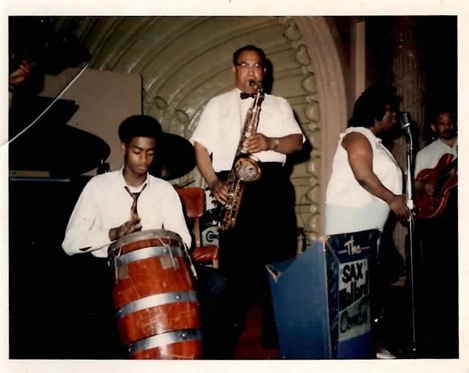
There would be no more studio calls, but for several more years Mallard would be working steadily.
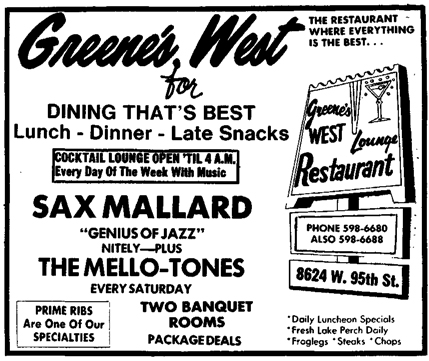
From 1974 through 1976, Sax Mallard enjoyed steady employment at two supper clubs. Starting in March of 1974, he was on five nights a week (the first advertisement says 7, but that would have violated Union rules, and we figure he was being spelled by an uncredited off-night unit) at Greene's West Lounge and Restaurant, 8624 West 95th Street. He apparently remained in residence at Greene's West till Labor Day, when he moved to Nikos' Restaurant, 7600 South Harlem Avenue. Nikos', which had opened in 1973, was an entire entertainment complex unto itself, with dining areas, a lounge, and eventually a banquet hall that seated 700. The Mallard combo was in residence at Nikos' for two years; the last advertisement we have seen is from Labor Day, 1976.
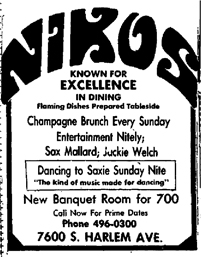
Blind John Davis (p, voc); Henderson Smith (tp); Sax Mallard (ts); Harry Cornell (b); Armand "Jump" Jackson (d).
Chicago Jazz Festival, Chicago, September 5, 1981
| Rose Room | radio broadcast | ||
| I Had a Dream [BJD voc] | — | ||
| Exactly like You | — | ||
| Boogie in Bb | — | ||
| Cavernism | — | ||
| Every Day I Have the Blues [BJD voc] | — | ||
| Red Top | — |
Sax Mallard's last known recording was brought to our attention by Yves François Smierciak, who provided us with a dub. Mallard was a Musicians Union official by this time; consequently he was not allowed to take paying gigs. However, he made a few appearances with the same band (according to Smierciak they also played at the Blackstone Hotel in January 1981). Henderson Smith was a Swing era veteran who back in 1944 appeared on the first T-Bone Walker session for Rhumboogie.
The last public appearance by that we have found mentioned in the press was a free concert by the Sax Mallard Show Band on Sunday evening, July 22, 1984, in Lake Meadows Park (Chicago Herald, July 20, 1984, Section 6 p. 6). Sax Mallard died of cancer on August 29, 1986, at West Side Veterans Administration Hospital. He was 70 years old. Patricia Mallard had two sons: Blaine Morris (1954-2011) and Conrad Henry (born 1959). Her husband William C. Henry became an Illinois State Representative (1979-1983) and a Chicago Alderman (1983-1991). Anne Mallard Stenson died in 2002; Patricia Mallard died on May 6, 2009; Sonny Mallard died in 2012.
The ways of discographers are mysterious. Tom Lord's Jazz Discography, for instance, lists a number of artists who played or recorded in Chicago, including Buster Bennett and Jimmy Coe. It includes such R&B luminaries as Ray Charles, Roy Milton, and Jimmy and Joe Liggins. Soul performers like Gene Allison, James Brown, Lou Rawls and even Arthur Conley can be found. So can King Kolax. But not a word on Sax Mallard as a leader. Go figure.
Our thanks to A. A. Rayner & Sons funeral home for Sax Mallard's birth date. The Sun-Times obituary (by Larry Weintraub, Sept. 8, 1986) and the Defender item (by Juanita Bratcher from Sept. 9; this one includes praise from tenor saxophonist Dave Young, who by this time was working as the advertising manager for the Defender) are sources for biographical details on Sax Mallard. We learned more about Sax Mallard's life from his grandson Conrad L. Henry (email communications, May 17-20, 2009), to whom we are indebted for several previously unseen photos. Thanks to Marv Goldberg for information on the session by The Dozier Boys. The late Charles Walton provided us with the photo of the Al Benson television show band and identified two of the musicians in the 1953 photo of Mallard's quartet. Nadine Cohodas found the "Hot on Central Avenue" listing for "The Mojo" in Cash Box. Stephen Janci provided photos of Mallard's very scarce release on Chess 1430. Steven Abrams and Tyrone Settlemier have provided massive online documentation of the output of American Columbia (http://settlet.fateback.com). Their Web page has enabled us to make sense of Columbia's dual release series (35000s and 30000s) that operated from 1945 through 1948.
Click here to return to the Red Saunders Research Foundation page.
Click here to return to Robert Campbell's Home page.